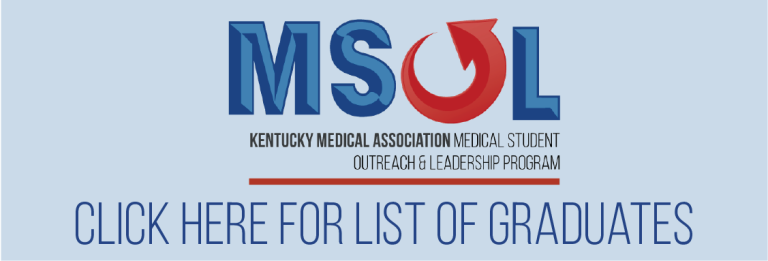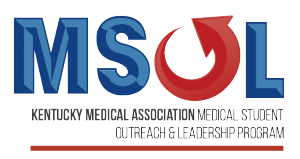 The Kentucky Medical Association Medical Student Outreach and Leadership Program is designed to promote community involvement, as well as to give students an opportunity to learn more about the political, social and economic issues in the health care system. Those who complete all five requirements will be recognized by KMA.
The Kentucky Medical Association Medical Student Outreach and Leadership Program is designed to promote community involvement, as well as to give students an opportunity to learn more about the political, social and economic issues in the health care system. Those who complete all five requirements will be recognized by KMA.
The MSOL program is available to students at the University of Kentucky College of Medicine on the Lexington, Bowling Green, Northern Kentucky, and Morehead campuses as well as, the University of Louisville School of Medicine and the University of Pikeville-Kentucky College of Osteopathic Medicine.
Since its inception in 2015, 1,360 students have participated in some aspect of the program, with 660 graduating from all program requirements.
Those who complete the following five steps will be recognized by KMA.
1. Basics of Health Care Policy
Attend the lecture covering the most pertinent public health and health care economics issues for new physicians to help them understand the health policy landscape.
2. Impact of Health Care Policy on Young Physicians
Attend the lecture discussing how many of the policy issues covered in the “Basics of Health Care Policy” might impact new physicians and how they can navigate the current health care marketplace.
3. Basics of Effective Advocacy
Attend the lecture highlighting the fundamental components and well-established techniques of effective advocacy so that new physicians can couple this knowledge with their medical expertise to improve the practice of medicine and promote better health policy and patient outcomes.
4. Public Outreach Project
Complete a public health outreach project in your community. These projects are coordinated through the school and must be submitted to the school’s MSOL program coordinator.
5. What you Learned Essay
Upon completing the first four requirements, participants must submit a short one paragraph description on what they learned from the program.
Contact membership at member@kyma.org for more information.
Read more about the MSOL program featured in Medical News
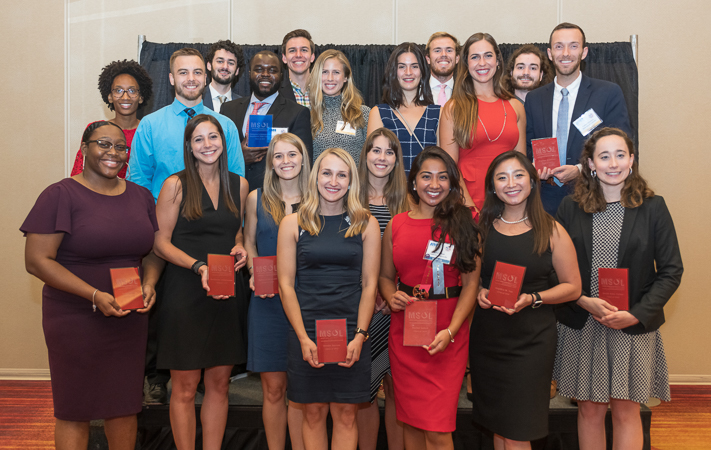
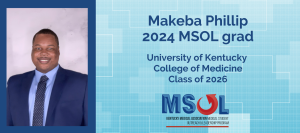 Why did you decide to become a physician?
Why did you decide to become a physician?
I decided to become a physician because I have a love for science, discovery, and service to others. Medicine is my passion because it is a field that blends all those passions and provides me the opportunity for continued learning and development.
Why did you decide to participate in KMA’s Medical Student Outreach and Leadership Program?
I decided to participate in KMA’s MSOL program because I wanted to get more involved in the community and start a journey of professional development. I was also interested in learning what ways I can continue to be involved in the community/health policy in my future career.
What are some key things you learned?
Some key things that I learned are to advocate for others, speak with local policy makers, and continue to be a leader and give back to the community.
Would you recommend the MSOL program to other students and why?
I would recommend the MSOL program to other students because it provides you valuable information about ways to get involved both as a medical student and as a future physician. Also, the program helps you get connected to the community and vulnerable populations.
One of the requirements of the program is participation in a public outreach program. What was yours?
The public outreach program I participated in was a hand washing seminar given at a local elementary school. I went to the elementary school and instructed students on proper handwashing techniques and the importance of preventing disease transmission. There was an interactive portion where students were instructed to wash their hands thoroughly after being given a substance that shows up on blue light. We then walked around and looked at their hands with the flashlights to determine what areas were not cleaned adequately.
What do you enjoy doing in your spare time?
In my spare time I enjoy taking walks, listening to music, trying new foods, and spending time with my friends/family.
When you graduate, where do you plan on practicing?
At this time, I am not sure where I plan on practicing after graduation.
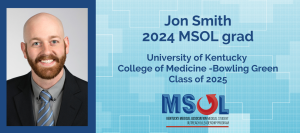 Why did you decide to become a physician?
Why did you decide to become a physician?
My professional pursuits have always been driven by a deep-seated love of people. After many years of full-time ministry and teaching work, I learned that the most impactful struggle that others faced on a day-to-day basis was the relationship with one’s own health. With the encouragement of my wife to make the stark transition, I now approach the treatment of others utilizing both liberal arts and hard science training.
Why did you decide to participate in KMA’s Medical Student Outreach and Leadership Program?
Since even before college, I have had a passion for the education of others. Whether with students or patients, I have always held the belief that when others know and understand more about what challenges they face, better steps are taken forward. By participating in the MSOL program, I recognized that I was going to be able to expand my own knowledge base in ways that would further equip me to equip others through patient education.
What are some key things you learned?
While taking part in the multiple learning opportunities the program offers, I was offered early exposure to the tools of the trade beyond the scalpel and stethoscope. Personally, gaining a basic understanding of health care policy, how it affects physicians’ practice, how it is formulated and enacted, and most importantly, what it means for how healthcare gets to the patient has been a fundamental necessity in my goals moving forward.
Would you recommend the MSOL program to other students and why?
I have no reservation in saying that every medical student should go through the MSOL program. Key elements related to the future physician’s practice are taught that may not be covered by traditional medical education. By utilizing this program, those gaps are filled and a more well-rounded practitioner results.
One of the requirements of the program is participation in a public outreach program. What was yours?
As a representative of the UK College of Medicine in Bowling Green, I spend opportunities educating local middle school students on areas of health, the journey to becoming a physician, the use of medical tools such as stethoscopes and reflex hammers, and discussing the hurdles/barriers healthcare providers face in the drive to increase community health
What do you enjoy doing in your spare time?
Quality time with family is always a must! Going to the park with my spouse and children is always a highlight. I maintain a diverse catalogue of boardgames and am no stranger to Dungeons and Dragons. As solo ventures, I operate a collection of 3D printers and do a lot of reading, both fiction and nonfiction.
When you graduate, where do you plan on practicing?
I was born in Murray and grew up around that area until college. Both of my children will have been born in Kentucky and it is where I have been blessed to go through medical school. Although we do not know where residency will be, we would love nothing more than to have the opportunity to practice in this area we call home!
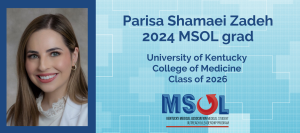 Why did you decide to become a physician?
Why did you decide to become a physician?
My journey into medicine was shaped during my graduate studies in epidemiology, where I held two research assistant positions—one in a clinical trial and another with a research group. While I valued the academic and analytical aspects of research, I found myself increasingly drawn to the direct patient interactions I experienced in clinical settings. It became clear to me that I wanted to pursue a career that combined scientific inquiry with meaningful, hands-on patient care. This realization inspired me to continue my education in medicine where I could have a deeper, more personal impact on individuals’ lives.
Why did you decide to participate in KMA’s Medical Student Outreach and Leadership Program?
My professional journey has been shaped by a global perspective on health sciences and policy, but I knew I needed to become more engaged in addressing the unique health challenges faced by Kentuckians. I joined KMA’s Medical Student Outreach and Leadership (MSOL) Program to gain a deeper understanding of the specific needs within my local community. This program offered invaluable insights into the health issues affecting our state, allowing me to take a more active role in addressing them.
What are some key things you learned?
The MSOL program helped me become a more well-rounded physician by broadening my understanding of the health challenges facing Kentuckians, particularly issues like the opioid crisis. The program emphasized a more holistic approach to patient care, equipping me with a comprehensive perspective that will shape how I address not only medical conditions but also the broader social determinants of health in Kentucky.
Would you recommend the MSOL program to other students and why?
Absolutely. The MSOL program offers critical insights into the multifaceted nature of patient care, particularly how external factors such as public health policies, socioeconomic conditions, and regional health crises affect patient outcomes. The experience was eye-opening and essential for any student who wants to truly understand the complexities of healthcare delivery in our state and beyond.
One of the requirements of the program is participation in a public outreach program. What was yours?
I served as the clinic manager for the Salvation Army Clinic in Lexington, a free clinic that provides care for the unhoused, uninsured, and precariously insured populations. In this role, I volunteered regularly during clinic days and played an active part in streamlining our operational processes to improve patient care delivery. It was an incredibly rewarding experience, and it allowed me to make a tangible difference in the lives of individuals who are often underserved by the healthcare system.
What do you enjoy doing in your spare time?
In my spare time, I enjoy cooking for my loved ones and exploring the diverse food scene here in Lexington. I find joy in connecting with others over a shared meal.
When you graduate, where do you plan on practicing?
The future is full of exciting possibilities, and I’m eager to see where my journey takes me. I’m open to exploring different opportunities and am particularly drawn to finding a place where I can make a meaningful impact, whether that’s within Kentucky or beyond.
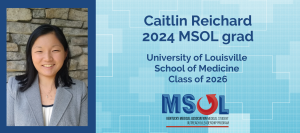 Why did you decide to become a physician?
Why did you decide to become a physician?
It was the perfect combination of areas I was interested in–biological science, technical innovation, the human condition, and cultural competence, and using those skills to impact people’s well-being directly.
Why did you decide to participate in KMA’s Medical Student Outreach and Leadership Program?
Physicians hold a unique position of respect and power in our society. Therefore, we must use our influence to improve public health and well-being. To do this, we must be well-versed in the complexity of our culture and its systems and learn how to advocate for improvements.
What are some key things you learned?
A history of health care policy and insurance and how they currently affect physicians
Would you recommend the MSOL program to other students, and why?
Yes! This is an excellent opportunity to learn more about the sociopolitical factors that influence your practice as a future physician. Given the busy med school schedule, it is an efficient, compelling series that we can participate in.
One of the program’s requirements is participation in a public outreach program. What was yours?
Provided a career development presentation on the pre-med curriculum and pathway to becoming a physician at the Adelante High School program
What do you enjoy doing in your spare time?
Going to new breweries, coffee shops, and restaurants; spending time with my wife and bouncy mini dachshund; crafting playlists on Spotify
When you graduate, where do you plan on practicing?
I plan to go into radiation oncology. I’m open to any place at least the size of a small city, including Louisville!
 Why did you decide to become a physician?
Why did you decide to become a physician?
After many years of working as a nurse and nurse practitioner, I craved a higher level of autonomy and a broader depth of knowledge. I pursued the University of Louisville’s post-baccalaureate pre-medical program to fulfill prerequisite requirements and transitioned to medical school. Longevity of patient relationships and continuity of patient care has always been my primary driving force to return to
school. Additionally, I love the operating room and the best way to combine autonomy, continuity of
care, and surgery was to become a physician.
Why did you decide to participate in KMA’s Medical Student Outreach and Leadership Program?
Physician leaders are needed to produce effective change. I am actively involved in the Distinction in
Business and Leadership track at my medical school and the MSOL program was a logical extension to
broaden my medical leadership knowledge base.
What are some key things you learned?
The MSOL program highlights key matters that physicians new to practice will encounter, how to
effectively advocate for your patients, and the impacts of policy on the healthcare system. As a native
Kentuckian, I appreciated that the program also emphasized patient care challenges specific to the state
of Kentucky.
Would you recommend the MSOL program to other students and why?
Absolutely! The MSOL program introduces tools that can be used to better serve your patients in the
future. The program also provides insight about how to protect and advocate for yourself as a new
physician.
One of the requirements of the program is participation in a public outreach program. What was
yours?
I volunteered at the Redeemer Lutheran Church Health Fair in West Louisville. I taught participants how
to perform self-breast exams and encouraged screening mammograms. After working as a women’s
health nurse practitioner for almost nine years, women’s health is a passion of mine!
What do you enjoy doing in your spare time?
I love spending time with my husband, two children, and our mini schnauzer. I enjoy traveling, hiking,
and kayaking. Any chance that I get to try a new recipe, I’ll take it. Over the last couple of years, I started
refinishing furniture and have multiple pieces that I have completed in my home.
When you graduate, where do you plan on practicing?
Kentucky is home! I would love the opportunity to serve and care for my community as a physician.
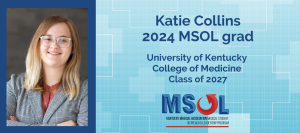 Why did you decide to become a physician?
Why did you decide to become a physician?
Coming from a medically underserved area, I know what it is like to see loved ones and those in my community struggle with health issues that feel impossible to overcome due to limited resources and understanding of how socioeconomic factors can impact health. I wanted to be a physician to help those in my community and to be able to use my voice to advocate for change.
Why did you decide to participate in KMA’s Medical Student Outreach and Leadership Program?
I decided to participate in the MSOL program because I want to be an effective leader and advocate for my community in my future practice as a Physician. The MSOL program gave me practical skills and experiences in this area that I believe will enable me to be the best possible physician I can be.
What are some key things you learned?
Since taking part in the MSOL program, I have learned a lot about what it takes not just to be a physician. Being a physician is more than just the medicine; it is about being an advocate, a public figure, a personal business manager, a volunteer, and more. I have learned a lot about each of these various aspects. I have gotten to serve my community by volunteering at the Down Syndrome Associations cooking class. I have learned a lot about how to advocate at the state level for healthcare policy that will benefit not just my patients, but my community as a whole through the various seminars. I also got the opportunity to put this knowledge to use at Kentucky’s Physician’s Day at the Capital where we advocated for prior authorization reform.
Would you recommend the MSOL program to other students and why?
Yes! I think the lessons I learned in this program are just as important as other aspects of the medical school curriculum. No matter what specialty you go into, you will be working with people and will be a respected figure in your community. It is important to learn early what this means and how you can use your position to make the world a better place to be.
One of the requirements of the program is participation in a public outreach program. What was yours?
I participated in the Physician’s Day at the capitol in Frankfort, Kentucky where I was able to join other medical students and physicians in advocating for policy reform.
What do you enjoy doing in your spare time?
In my spare time, I love playing pickleball with friends and reading at home with my cats.
When you graduate, where do you plan on practicing?
I hope to practice in a medically underserved area to help bring care to those who need it most!
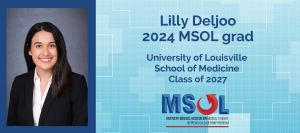 Why did you decide to become a physician?
Why did you decide to become a physician?
I decided to become a physician to make a meaningful difference in patients’ lives. I’m drawn to the fast-paced nature of healthcare, where I can build personal, one-on-one connections with those I care for. My goal is to be a physician who ensures that every patient feels seen, heard, and valued in my care.
Why did you decide to participate in KMA’s Medical Student Outreach and Leadership Program?
I chose to participate in KMA’s Medical Student Outreach and Leadership Program because, as a Kentuckian, I wanted to learn how to be an effective leader and advocate for my local community. The program allowed me to gain valuable insights into how I can better serve my future patients and champion important issues in healthcare.
What are some key things you learned?
I gained valuable insights on how to present myself online as a public figure within my community. Additionally, I deepened my understanding of important topics like insurance, medical malpractice, and effectively navigating the legislative system to advocate for meaningful change in healthcare.
Would you recommend the MSOL program to other students and why?
I would highly recommend the MSOL program to other students. It provides invaluable preparation for the challenges you’ll face as both a physician and an advocate for your patients. The program equips you with the tools and knowledge to navigate and overcome systemic barriers, ensuring that you can protect both yourself and your patients throughout your career.
One of the requirements of the program is participation in a public outreach program. What was yours?
As the former Community Outreach Chair for the University of Louisville School of Medicine KMA Chapter, I organized a health education event for high school seniors from Hispanic backgrounds in collaboration with Adelante Hispanic Achievers. During the event, I introduced students to various careers in medicine and outlined the steps to pursue them. I also addressed their questions about higher education and navigating a path toward a healthcare career, helping to guide them toward achieving their goals.
What do you enjoy doing in your spare time?
In my spare time, I enjoy watching horse racing and spending quality with my family time at the racetrack. I also love to cook and bake, especially when it comes to preparing traditional Persian dishes.
When you graduate, where do you plan on practicing?
Upon graduating, my goal is to practice Obstetrics and Gynecology in a setting where I can provide comprehensive care, including abortion services. I feel strongly about offering my patients the full spectrum of reproductive healthcare, and therefore, I will carefully consider the restrictions on abortion providers when deciding where to practice in the United States.
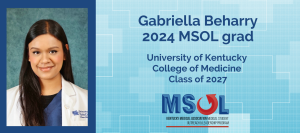 Why did you decide to become a physician?
Why did you decide to become a physician?
I decided to become a physician to make a positive impact on my future patients’ lives by medically empowering people from all backgrounds during their most vulnerable health moments.
Why did you decide to participate in KMA’s Medical Student Outreach and Leadership Program?
I heard about the MSOL program through our AMA chapter at the University of Kentucky College of Medicine. I wanted to join the KMA’s Medical Student Outreach and Leadership Program so that I could become a more effective leader, to serve my community, and learn more about legislation to become a more effective physician.
What are some key things you learned?
I learned that there is more work that needs to be done in Kentucky to control healthcare costs, provide more people with medication coverage, and address access issues. I’ve realized how important it is for physicians to be active leaders beyond the hospital and what a privilege it is to advocate for our patients.
Much of our country’s laws relate to healthcare, yet few of our country’s lawmakers come from medicine. I believe that is important for physicians to have the space to guide our legislators to form policies that benefit our patients.
Would you recommend the MSOL program to other students and why?
I would definitely recommend the MSOL program to other students. For every medical student to have the opportunity to be exposed to this information at such an early point in their medical training is a great advantage to have in our careers.
This program focuses on real-world knowledge that is very beneficial for future physicians and I am now more informed on how to handle these challenges when they present themselves later on in my medical career.
One of the requirements of the program is participation in a public outreach program. What was yours?
I helped cook meals for families at the Ronald McDonald House in Lexington and provided medical care to Lexington’s homeless population at the Salvation Army Clinic.
What do you enjoy doing in your spare time?
I love to exercise, spend time with friends and family, and explore new restaurants and coffee shops in Lexington.
When you graduate, where do you plan on practicing?
I would like to practice wherever I can best serve my patient community through advocacy, research, and education. I’m originally from Florida and I am so grateful for the opportunity to spend 4 years of medical school in Kentucky. I am excited to see where life takes me, and I believe wherever God sees fit will be where I am meant to practice.
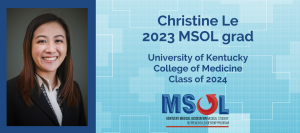 Why did you decide to become a physician?
Why did you decide to become a physician?
Medicine allows me to best utilize my strengths to heal holistically, while uplifting the silenced voices of the populations I aim to serve.
Why did you decide to participate in KMA’s Medical Student Outreach and Leadership Program?
I heard about how great the MSOL Program was through friends/peers.
What are some key things you learned?
Learning about healthcare policy and the ways in which KY physicians can use their unique expertise to advocate for their patients and themselves through community leadership has been a valuable experience. I am thankful for the practical advice regarding financial security and factors to consider before signing employment contracts. The MSOL Program topics covered were a wonderful complement to the traditional medical school curriculum.
Would you recommend the MSOL program to other students and why?
I would absolutely recommend the MSOL Program to other students, because it equips medical students with practical knowledge regarding practicing medicine and advocating for patients. These topics are not a part of the traditional medical school curriculum, but are essential to know, nonetheless.
One of the requirements of the program is participation in a public outreach program. What was yours?
I volunteered at the Salvation Army Clinic, which is a student-run free clinic that serves the Lexington population.
What do you enjoy doing in your spare time?
I enjoy dancing, arts and crafts, crocheting, traveling, and exploring new places to eat with my friends and family.
When you graduate, where do you plan on practicing?
At this time, I plan on practicing in Texas to be with my significant other, who is from Texas.
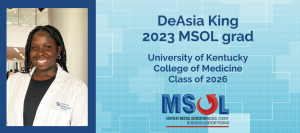 Why did you decide to become a physician?
Why did you decide to become a physician?
I decided to become a physician to provide care to the medically underserved and encourage adequate representation for all. Doing this means becoming a healthcare advocate who strives to educate and empower patients about their health. As a Black woman, I only knew of one Black physician growing up and for a while, I felt that medicine was unattainable for me due to my identity. Therefore, my deepest wish is to be an active role model and motivate the next generation of those who look like me or feel underrepresented to remain steadfast in obtaining a place in these spaces.
Why did you decide to participate in KMA’s Medical Student Outreach and Leadership Program?
I saw my participation in this program as an opportunity to grow and learn how to be a better physician for my future patients. Not only this, but it was imperative to the MSOL Program that students learn how to be leaders in medicine and within our communities. Some of the topics learned are just as important as our medical curriculum, and will equip me with knowledge and insights that will only benefit those I serve!
What are some key things you learned?
This leadership program has provided so many valuable insights into what a career as a physician looks like, and how to be successful in it. I had never considered the fact that physicians are put on a public platform, and in some cases, a pedestal and must act accordingly. We have a huge responsibility to ourselves, our hospitals, and our patients to uphold a respectable image and maintain that throughout our careers. Further, knowing the data is something I will keep in mind when it is time to apply to residencies and make further career decisions. This idea includes knowing information about me (ratings, experiences, credentials, etc.), my career (pertaining to my specialty of choice or generally for physicians), my practice, insurance, and more. Though it is not just about knowing the information, but also ensuring its accuracy, and finding ways to improve it. I have appreciated all of the topics covered during the program, and plan to take this information into my education and career.
Would you recommend the MSOL program to other students and why?
I would 100% recommend the MSOL program to other students. MSOL was a wonderful program to be part of during my first year as a medical student. I felt it taught valuable information and provided helpful insight on the things we should expect and be prepared for in our future as physicians. Additionally, we are extremely lucky this program has made itself so attainable with its ability to be completed amidst our course schedule!
One of the requirements of the program is participation in a public outreach program. What was yours?
My public outreach program was the Salvation Army Clinic, a free clinic within the Salvation Army run by students and doctors at UK. Over the past year, I have been able to serve as one of two Pediatric Clinic Coordinators, who help run a Children’s Clinic once a month. This experience has not only encouraged my passion for pediatrics, but showed me the importance of providing primary care and addressing healthcare disparities.
What do you enjoy doing in your spare time?
In my spare time, I enjoy cooking, baking, exercising, and spending time with family and friends!
When you graduate, where do you plan on practicing?
After graduating, I hope to pursue a career in Pediatrics. As for location, it is so important to me that I serve communities who need healthcare the most! Although I would love to obtain more training in another part of the country, I could easily see myself coming back here to take care of Kentuckians (and their children)!
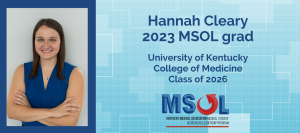 Why did you decide to become a physician?
Why did you decide to become a physician?
I decided to become a physician when I unknowingly decided that I wanted to become a superhero just like my father. I grew up in a world where attending my father’s monthly doctor appointments and hearing my mother ask my father if he took his medicine before eating meals was normal. To provide more context, my father suffered an accident before I was born that left him with a mechanical heart valve and a prosthetic hip. I later realized that he would never allow that accident to stop him from making a positive impact on every person in his life and every person he ever encountered. I was speechless the day my father asked me to one day be his doctor and since then I have wanted to be nothing less than the kind of superhero who gives people the opportunity to be someone else’s superhero.
Why did you decide to participate in KMA’s Medical Student Outreach and Leadership Program?
I decided to participate in KMA’s Medical Student Outreach and Leadership Program because I am a first-generation medical student. I am navigating this world of science and medicine with no familial example, and I want to learn as much as I can to be the best physician I can. I appreciate being able to grow in content knowledge outside my area of expertise to become a more well-rounded individual, as well. This program was the perfect opportunity for me to start becoming that well-rounded individual while in my first year of medical school.
What are some key things you learned?
The most important thing I learned while participating in this program is that expertise in business management and political policy is not required to efficiently advocate for the health of my patients. Specifically, this program emphasized that it only takes one small, yet persistent, voice to make a difference in the community and that I have been afforded the privilege, as a (future) physician, of being that voice. I have no intention of wasting that privilege.
Would you recommend the MSOL program to other students and why?
I would absolutely recommend the MSOL program to other students because the program provides a curriculum unlike anything we ever encounter in the classroom. The program educates students on the legislative policies and business decisions that impact physicians daily – something most of us never got told when we said we wanted to become physicians.
One of the requirements of the program is participation in a public outreach program. What was yours?
My public outreach program was judging the Fayette County Public Schools Science Fair. I have been a judge at this science fair going on three years now and I am always impressed by the projects presented by the students who are even as young as nine and ten years old. As one of the judges, I enjoy being able to educate and encourage young minds in their pursuit of learning and especially science. It is also a great privilege to be able to learn from these students likely in ways that they do not even realize.
What do you enjoy doing in your spare time?
I greatly enjoy running, cooking, and reading in my spare time.
When you graduate, where do you plan on practicing?
After I graduate from medical school, I want to spend a few years practicing somewhere else in the country – most likely a metropolitan city with a prominent academic center. However, given the general health disparities greatly observed in Kentucky (in addition to my own personal roots in the state), I can certainly see myself eventually coming back to provide medical support and care to my friends and neighbors.
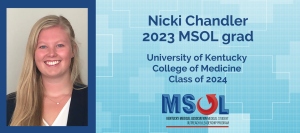 Why did you decide to become a physician?
Why did you decide to become a physician?
Growing up, I always knew I wanted to help others, but it was not until I became an EMT that I realized medicine was the perfect avenue for me to make that difference.
Why did you decide to participate in KMA’s Medical Student Outreach and Leadership Program?
I wanted to learn more about advocacy in medicine.
What are some key things you learned?
The MSOL Program has been an excellent supplementation to my medical school education by focusing on other important aspects of being a physician, such as medical insurance, financial literacy, and advocacy. Medical school curriculum does not directly cover these areas, likely because they are so complex and ever-changing. The outreach project at the end of this program was a great way to get involved, learn about the community, and practice skills of communication while making a big difference.
Would you recommend the MSOL program to other students and why?
Absolutely! As I mentioned before, this program covers topics that are not traditionally taught in medical school and the community outreach project is a great way to do some good in the community.
One of the requirements of the program is participation in a public outreach program. What was yours?
Delivering COVID-19 vaccines to hundreds of patients at Kroger Field in Lexington, KY during the pandemic.
What do you enjoy doing in your spare time?
Hiking, playing with my dogs, water skiing, playing cards.
When you graduate, where do you plan on practicing?
I want to stay in Kentucky because this is the area I grew up in and my friends and family live here. Additionally, Kentucky has one of the sickest populations in the nation and I hope to be able to affect more change here.
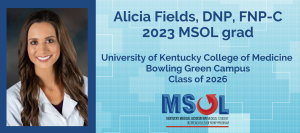
Why did you decide to become a physician?
I have wanted to become a physician since I was young. I remember having a Fisher Price medical kit and toy stethoscope. My interest in health care grew following a hospitalization of my own. I did not understand the challenges or complexities of health care, but I witnessed the compassion, empathy, and intelligence of my caregivers and realized those were characteristics I wanted to develop. This childhood hospitalization was the experience that led me to devote my life to the service of others. I ultimately majored in nursing and practiced as a registered nurse and nurse practitioner for several years before deciding to pursue my original passion. I believe it was my experience as a nurse practitioner that gave me the confidence to pursue a medical education. I wanted a deeper understanding of pathology and physiology that I knew medical school could provide because I wanted to better serve the patients who trusted me with their care. I also decided I did not want to regret never trying to achieve what I had told myself for years was impossible.
Why did you decide to participate in KMA’s Medical Student Outreach and Leadership Program?
I decided to participate in this program because I wanted to broaden my understanding of political, social, and economic issues within the health care system. I also enjoy doing community outreach and I knew that was a requirement of this program.
What are some key things you learned?
I learned that it is up to students and practicing physicians to call for better policies and delivery of care to improve patient outcomes. This program helped me to see that the care I provide to patients is more than what I do in the exam room. I also enjoyed learning about health and legislative issues specific to Kentucky.
Would you recommend the MSOL program to other students and why?
I would recommend the MSOL program to other students. Since the core curriculum of medical school is very intense, the topics of health care policy and advocacy often do not get enough discussion. I felt like the MSOL program was a great introduction to these important topics.
One of the requirements of the program is participation in a public outreach program. What was yours?
My classmates and I participated in a public outreach project with roughly 100 2nd grade students at Rich Pond Elementary School in Bowling Green, KY. Our focus was on the importance of handwashing. We talked with students and then used Glo Germ Gel with a UV lamp to view “glowing germs” that existed before and then after handwashing.
What do you enjoy doing in your spare time?
I enjoy yoga, playing piano, going to concerts, vegan/vegetarian cooking, and supporting animal rescue groups.
When you graduate, where do you plan on practicing?
I grew up in a very rural area and know the challenges patients face with access to care. I am originally from Indiana and currently living in Kentucky. My plan is to find where I am most needed within these two states and that is where I will practice.
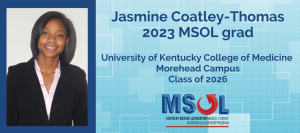 Why did you decide to become a physician?
Why did you decide to become a physician?
I decided to become a physician after assisting with taking care of my mom since I was nine. I saw (and still see) the health disparities in my community and want to reduce the barriers to health that we face.
Why did you decide to participate in KMA’s Medical Student Outreach and Leadership Program?
The KMA MSOL offers insight into the business aspect of medicine, and I believe this is also essential. As a future physician, it is important to know how to protect myself and get additional information about the business side of medicine, since this is not the focus in medical school.
What are some key things you learned?
I learned about additional health policies, how to protect myself in the future through learning about contract provisions, where to look for data on employers, where to go regarding more business and financial information, and much more. Also, the AMA is a good place to gain better education.
Would you recommend the MSOL program to other students and why?
Most definitely! It is important to learn and understand this aspect of medicine. The knowledge gained through MSOL helps you to better protect yourself in the future. This is critical information for beginning physicians.
One of the requirements of the program is participation in a public outreach program. What was yours?
Volunteering at the Nutrition Clinic at SAC; teaching about the importance of certain foods and lifestyle choices, and also volunteering at a high school in Louisville with my wife educating students on the importance of entrepreneurship, finding their passions, and much more.
What do you enjoy doing in your spare time?
I enjoy traveling with my wife and spending quality time with our family. We recently went to the Bahamas!
When you graduate, where do you plan on practicing?
I plan on practicing in areas that lack the opportunity of having access to quality and efficient healthcare.
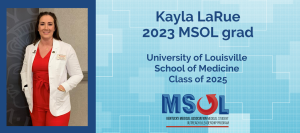 Why did you decide to become a physician?
Why did you decide to become a physician?
After years of nursing practice, I decided to become a physician driven by my curiosity about medical decision-making. Conversations with my mentors led me to pursue further education. I found the University of Louisville’s post-baccalaureate program, facilitating a smooth transition. I derive immense satisfaction from daily learning in medicine, knowing that it opens numerous doors for my future.
Why did you decide to participate in KMA’s Medical Student Outreach and Leadership Program?
I have maintained a persistent interest in leadership and advocacy throughout my professional journey, spanning from my role as a charge nurse to my current engagement in medical school, where I actively participate in the Distinction in Business and Leadership program. Recognizing that knowledge enhances my capabilities as a leader and advocate for both peers and patients, I sought out this program to expand my understanding.
What are some key things you learned?
My experience has been enlightening, particularly in addressing a prior lack of knowledge of healthcare policies. The program underscored the significance of active engagement in facets not conventionally associated with medicine, such as the intricacies of healthcare governance. This broader perspective is vital for effecting transformative change and advancing the field of medicine.
Would you recommend the MSOL program to other students and why?
I wholeheartedly endorse the MSOL program. The program’s manageable time commitment, coupled with the invaluable knowledge I acquired will aid me in being a stronger leader. I look forward to using what I learned to be a better advocate and build a great career in medicine!
One of the requirements of the program is participation in a public outreach program. What was yours?
I initiated the establishment of a caregiver support group for individuals with Alzheimer’s disease in collaboration with the Alzheimer’s Association. Recognizing a deficiency in such services in my hometown, my motivation stemmed from witnessing the profound stress experienced by caregivers during my tenure as a nurse in acute care settings. This allowed me to engage with a diverse group of individuals, hearing their stories and challenges, while also providing guidance towards valuable resources and support mechanisms aimed at alleviating their burdens.
What do you enjoy doing in your spare time?
I love to spend quality time with my two children, engaging in outdoor activities and reading as many books as I can. The gym has become an integral component of my lifestyle, allowing me to better manage stress and enhance my overall well-being. I also am very interested in exploring new wines and touring some of the beautiful wineries in Kentucky.
When you graduate, where do you plan on practicing?
I would love to stay in Kentucky and practice. Kentucky is considered home for my family and I!
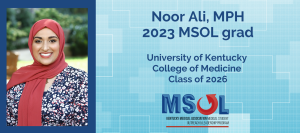 Why did you decide to become a physician?
Why did you decide to become a physician?
I pursued a medical career primarily driven by my profound desire to assist individuals from diverse backgrounds. I firmly believe that medicine extends beyond clinical expertise and encompasses a crucial aspect of advocacy. Medicine should not only focus on treating illnesses but also address the broader social determinants of health that affect people’s lives. By becoming a physician, I aim to advocate for equitable healthcare access, support vulnerable populations, and promote health equity for everyone, regardless of their background. Through this commitment to advocacy in medicine, I hope to make a meaningful and lasting impact on the well-being of individuals and communities.
Why did you decide to participate in KMA’s Medical Student Outreach and Leadership Program?
Participating in the KMA’s Medical Student Outreach and Leadership Program was driven by my strong desire to become a better physician for my growth and improving healthcare in Kentucky. This program offers a unique platform where I can enhance my medical knowledge, clinical skills, and leadership abilities while listening to experienced professionals. By doing so, I can ensure I am equipped with the tools and insights necessary to provide the highest quality of care to my future patients. Additionally, my participation in this program aligns with my commitment to positively impacting the healthcare landscape in Kentucky. Through collaboration, advocacy, and community outreach, I aim to contribute to advancing healthcare services and accessibility in the state, ultimately benefiting the well-being of its residents.
What are some key things you learned?
I appreciated the talk explaining why collaborating with the state government to improve Kentucky’s healthcare system is essential. These experiences have illustrated that real change in healthcare often necessitates policy and legislative support. Engaging with state government allows us to influence healthcare policies, allocate resources effectively, and implement reforms that address our communities’ specific needs and challenges. Through this partnership, we can foster innovation, improve healthcare access, and enhance the overall well-being of Kentucky’s residents. By actively participating in the intersection of medicine and policy, I’ve learned that working with the state government is not just a duty but a powerful means to enact lasting, positive change in the healthcare landscape of our state.
Would you recommend the MSOL program to other students, and why?
I firmly believe that every medical student should participate in the MSOL program, as it offers a unique and invaluable experience that goes beyond traditional medical education. This program equips aspiring physicians with essential leadership, advocacy, and community engagement skills, which are increasingly vital in today’s healthcare landscape. It provides a platform to understand the broader societal factors impacting health, fosters a sense of responsibility towards underserved communities, and encourages collaboration with healthcare professionals and policymakers. Ultimately, the MSOL program enhances a medical student’s ability to provide compassionate and effective patient care and instills a deep commitment to improving healthcare systems and addressing health disparities. In a rapidly evolving healthcare environment, this program prepares future physicians to be well-rounded advocates and leaders, contributing significantly to the well-being of individuals and communities they serve.
One of the program’s requirements is participation in a public outreach program. What was yours?
The Day of Dignity event, co-hosted by Islamic Relief USA and the Share Center, is a remarkable initiative that strongly emphasizes healthcare as an essential component of its mission. This event serves as a beacon of compassion and support for underserved communities, offering critical healthcare services to those in need. On this day, dedicated healthcare professionals and volunteers come together to provide free medical check-ups, vaccinations, health education, and access to resources for individuals who may lack regular healthcare access. It addresses immediate healthcare concerns and seeks to promote long-term well-being by connecting participants to vital community resources. Through the Day of Dignity event, Islamic Relief USA and the Share Center exemplify the profound impact that community-driven healthcare initiatives can have in ensuring that everyone, regardless of their circumstances, can access the healthcare they deserve while upholding the dignity of every individual.
What do you enjoy doing in your spare time?
I cherish the moments spent with my family and friends in my spare time. There’s something truly special about the laughter, shared stories, and the sense of togetherness that these gatherings bring. Whether it’s a cozy evening at home or an adventurous outing, these connections with loved ones are an essential source of joy and support. Additionally, I’m an avid food enthusiast, and one of my favorite pastimes is exploring new local restaurants. Discovering hidden culinary gems in my community satisfies my taste buds and allows me to appreciate the diverse flavors and cultures that make up our local food scene. It’s a delightful way to create lasting memories with those I care about and continually explore Kentucky’s vibrant culinary landscape.
When you graduate, where do you plan on practicing?
Upon graduating from medical school, my foremost aspiration is to practice where I am most needed, whether that destination is in Kentucky or any other underserved region. My commitment to medicine extends beyond geographical boundaries, and my primary goal is to provide quality healthcare to those who lack access or face disparities in healthcare services. The essence of being a physician lies in the ability to make a meaningful impact on patient’s lives, irrespective of location. Therefore, I am open to serving in regions where healthcare needs are most pressing, ensuring that I can contribute my skills and expertise to improve the well-being of communities in need, wherever they may be. Ultimately, my dedication to medicine is driven by the desire to make a positive difference in individuals’ lives and address healthcare inequalities on a broader scale. However, Kentucky will always be my home!
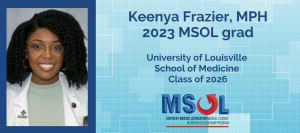 Why did you decide to become a physician?
Why did you decide to become a physician?
I decided to become a physician to make a positive impact on individuals’ lives by ensuring their health and well-being. The desire to help people during their most vulnerable moments inspired me to pursue this career path.
Why did you decide to participate in KMA’s Medical Student Outreach and Leadership Program?
I chose to participate in this program to gain a deeper understanding of the healthcare policy, its impact on young physicians, and to develop skills for effective advocacy. I believed that participating in the program would enable me to be a better advocate for my patients and make meaningful contributions to the community through outreach initiatives.
What are some key things you learned?
During the program, I learned about the intricacies of healthcare policy and the key stakeholders involved in shaping it. I also came to understand the unique challenges that young physicians face, such as managing student loan debt and adapting to a continuously evolving healthcare system. Additionally, I learned the fundamentals of effective advocacy and how to strategically communicate with policymakers.
Would you recommend the MSOL program to other students and why?
Absolutely, I would recommend the MSOL program to other students. It’s an invaluable experience for anyone looking to be more than just a physician, but a leader and advocate in their community.
One of the requirements of the program is participation in a public outreach program. What was yours?
I volunteered with the Future Healers in Louisville. During this outreach, we collaborated with the American Red Cross to educate kids about fire safety. Additionally, we assisted them in an art project where they decorated an “essential bag” filled with crucial items needed during a fire emergency. This experience emphasized the importance of community outreach and being prepared for emergencies.
What do you enjoy doing in your spare time?
In my spare time, I enjoy binge-watching TV shows, engaging in various exercise routines to stay active and fit, and delving into audiobooks that expand my knowledge and perspective.
When you graduate, where do you plan on practicing?
After graduation, I intend to practice at a VA hospital. I’m passionate about serving those who have served our nation, and I believe working in a VA hospital will provide me with the opportunity to give back to our veterans by ensuring they receive the best healthcare possible.
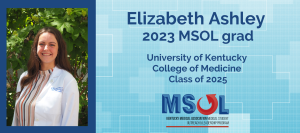 Why did you decide to become a physician?
Why did you decide to become a physician?
I didn’t have just one moment or experience that led me to decide to become a physician, but rather it’s been a culmination of life experiences that led me to pursue this path. Becoming a physician allows me to have an active role in the lives of the people in my community by providing genuine and all-encompassing care. It is also a field that allows for life-long learning to continue to educate myself as well as those around me in important aspects that affect all people.
Why did you decide to participate in KMA’s Medical Student Outreach and Leadership Program?
I decided to participate in KMA’s MSOL program because I know physicians have a huge leadership role within our community and I wanted to ensure I have the proper skills to be a community leader when I graduate. I was born and raised in Kentucky, so I know Kentucky and the unique benefits and challenges we have here in terms of healthcare and life as a whole. I appreciated that this program is tailored towards leadership with these Kentucky-specific aspects in mind.
What are some key things you learned?
Some key things I learned through the MSOL program include the structures of healthcare policies and insurance within Kentucky, how to advocate both directly and indirectly for patients in government, school, work, and medical settings, and how to be a physician leader in Kentucky with a patient-first mindset.
Would you recommend the MSOL program to other students and why?
I would definitely recommend the MSOL program to other medical students because it provides insight into what makes Kentucky unique generally and in terms of healthcare and how we can serve the people of the state in ways that will be directly beneficial to them.
One of the requirements of the program is participation in a public outreach program. What was yours?
I volunteer several times a month at the Salvation Army Clinic which is a free clinic that provides primary medical care to women and children in Lexington. As a medical student volunteer, I obtain a compete history and physical from patients, discuss their health concerns and plan with an attending physician, and help explain the care plan to patients. Helping to provide easily accessible healthcare to everyone in Lexington has been a goal of mine throughout my medical career so far and volunteering at SAC has been a great way to serve Lexington and Kentucky.
What do you enjoy doing in your spare time?
In my spare time, my favorite thing to do is read. I read over 50 books last year from a variety of genres including medical and non-medical non-fiction, memoirs, historical fiction, fantasy, and plain old fiction! I read both because it is something I enjoy, and it helps me learn about and understand perspectives that I would have very little exposure to otherwise. Reading is a personal activity that connects you to the world and people around you in new & exciting ways.
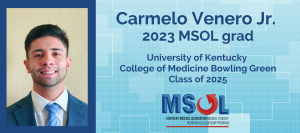 Why did you decide to become a physician?
Why did you decide to become a physician?
There is no other field that is as compelling and intriguing as the medical field. The application of science, compassion with patients, and satisfaction when treating others are some major factors that brought me to medicine. I was ultimately inspired to become a physician from my two parents who were physicians in Venezuela and immigrated to this country. I am privileged to have an opportunity to give back to this wonderful community.
Why did you decide to participate in KMA’s Medical Student Outreach and Leadership Program?
The past few years have amounted in vast amounts of changes in the healthcare system. The KMA MSOL program gave me an opportunity to hear from others about medical leadership and the impact that physician have on their communities.
What are some key things you learned?
I learned how to advocate for patient health in the Commonwealth of Kentucky. Through these meetings, I furthered my knowledge of the financial and business aspect of medicine along with medical policy processes. A lot of these topics are not necessarily taught in classes and offered an amazing experience for understanding how my career goals can be accomplished by treating patients with the best care available.
Would you recommend the MSOL program to other students and why?
I recommend the MSOL program to all medical students. This opportunity prepares us for the challenges that future physicians will be facing in medicine, and how we can promote our patients’ health.
One of the requirements of the program is participation in a public outreach program. What was yours?
The project that I assisted in was in my phlebotomy volunteering at the Medical Center in Bowling Green. I enjoyed assisting in drawing samples while talking to patients in the outpatient and hospital setting.
What do you enjoy doing in your spare time?
In my spare time, I enjoy running and hiking around the Appalachian Mountains. I am also the biggest Boston Red Sox fan you will ever meet.
When you graduate, where do you plan on practicing?
I intend on practicing somewhere in the Appalachian region. I have spent most of my life in this region and have enjoyed it.
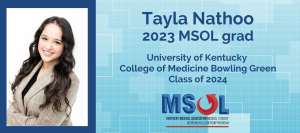 Why did you decide to become a physician?
Why did you decide to become a physician?
I wanted to be a physician to have a positive impact in my community of Bowling Green.
Why did you decide to participate in KMA’s Medical Student Outreach and Leadership Program?
It was a great opportunity to learn more about the main health care issues facing my community.
What are some key things you learned?
I learned about the financial and political policies to medicine.
Would you recommend the MSOL program to other students and why?
Yes, I would recommend the MSOL program. It was a great way to learn more about healthcare policy in Kentucky and a great way to meet fellow medical professionals in the field.
One of the requirements of the program is participation in a public outreach program. What was yours?
I participated in a job fair at an elementary school, where we had a booth that represented UK College of Medicine. We were able to teach the children about life as a doctor and how we help change patients lives.
What do you enjoy doing in your spare time?
I enjoy spending time with family, working out and traveling all over the world.
When you graduate, where do you plan on practicing?
When I graduate, I plan on practicing in Kentucky where my family is.
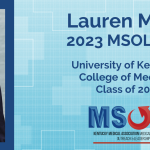 Why did you decide to become a physician?
Why did you decide to become a physician?
I was first inspired to become a physician when my parents decided to return to school to become nurses when I was five. Through watching my parents endure nursing school, I developed a strong admiration for the medical field. Since then, I cannot remember ever considering another career, and I am so grateful for the opportunity to become the first physician in my family.
Why did you decide to participate in KMA’s Medical Student Outreach and Leadership Program?
I wanted to participate in the MSOL program because I believe it is important for future physicians to learn how to advocate for themselves and their future patients. In medical school, students are focused primarily on learning the science of medicine, so it was refreshing to have the opportunity to learn about other issues that I will come across as a physician.
What are some key things you learned?
This program helped me to learn about many aspects of being a physician that go beyond learning about medicine. I learned about a plethora of topics ranging from understanding how medical insurance works to navigating healthcare policy to maintaining a social media presence as a physician. I will build upon this foundational knowledge as I progress through my training, and I will continue to prepare myself to be a strong advocate for my future patients.
Would you recommend the MSOL program to other students and why?
I would recommend the program to other medical students because it is so important for future physicians to learn about every aspect of the healthcare system. In the typical medical school curriculum, most energy is dedicated toward the scientific aspects of medicine, and other topics, such as the innerworkings of insurance and healthcare policy, can be neglected. With knowledge of these facets of the healthcare system, I feel much more prepared to navigate my future in the medical field.
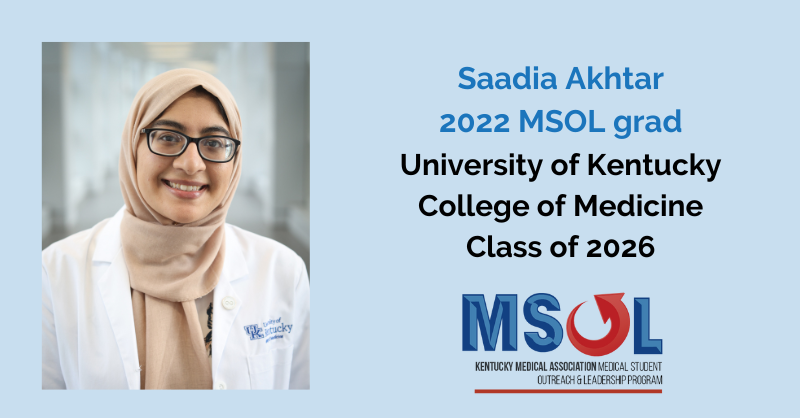 Why did you decide to become a physician?
Why did you decide to become a physician?
To be able to help people at their most vulnerable. People come to their doctor with all sorts of worries about what their symptoms could mean, especially in today’s age with Google. People are scared and want someone to tell them that everything is going to be okay. While I cannot promise that second part, I absolutely will promise that I will try my best to help my patients in any way that I can. I want to provide patients with hope and with solutions for their medical issues.
Why did you decide to participate in KMA’s Medical Student Outreach and Leadership Program?
I wanted to learn more about healthcare policy and “behind the scenes” when it comes to running a practice and being a doctor. We don’t normally learn these things in medical school, so I thought this would be a good opportunity to take advantage of.
What are some key things you learned?
I learned how to be a better advocate for my future patients and the avenues I can take if there is a pertinent issue I want to speak up on.
Would you recommend the MSOL program to other students and why?
I would! In three, one-hour sessions, you get a good base of knowledge on how to be an effective physician-advocate for your future patients. You are exposed to the legislative side of medicine, which our current medical education does not expose us to.
One of the requirements of the program is participation in a public outreach program. What was yours?
I, along with some medical school peers, hosted a Fast-A-Thon last April. We educated healthcare students and professionals about Islam, the month of Ramadan, and healthcare considerations for patients who fast during Ramadan. We had two presentations and a dinner served afterwards!
What do you enjoy doing in your spare time?
Reading, writing, cooking, watching historical fiction series, and spending time with friends and family.
When you graduate, where do you plan on practicing?
I see myself practicing in an academic setting at a large institution. I would like to see a variety of cases each day and would also like to be involved in mentorship.
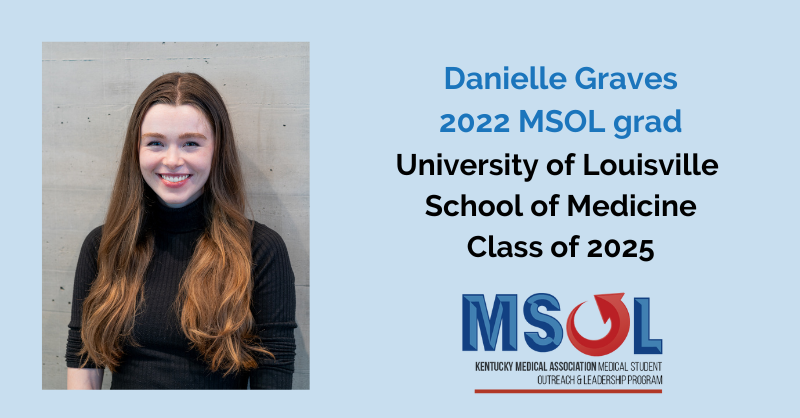 Why did you decide to become a physician?
Why did you decide to become a physician?
Initially, it was a childhood dream. There are pictures of me dressed up as a doctor with a plastic stethoscope and tiny scrubs. Later, I found that my childhood intuition matched my skill and passion for learning science and my hunger to advocate for a better future for my community. I think that I grew to fit medicine rather than chose it as a profession.
Why did you decide to participate in KMA’s Medical Student Outreach and Leadership Program?
I knew that I wanted to connect politics with my future as a physician. I have an undergraduate degree in Political Science along with Chemistry and I firmly believe that the legislature and its decisions play as much of a role in the health of my future patients as I will. So, I was looking to get involved and to find instruction in how to be involved as a physician.
What are some key things you learned?
I learned a lot about the framework of paying for medical care in the state of Kentucky and about the specific risk factors for this patient population. Though I grew up here, there was a lot that I did not know.
Would you recommend the MSOL program to other students and why?
I think this program is especially valuable if you are confused about how advocacy might turn into actual legislative priorities and change. Most people haven’t had instruction in civics since high school. It is also helpful if you’re unfamiliar with the specific challenges that face our patients in Kentucky.
One of the requirements of the program is participation in a public outreach program. What was yours?
Our AMA chapter created a public event with our Metro Council Members helping citizens understand how they can most effectively advocate on local issues and educating people on blue-lining and its impact on patient health. We also created a policy memo about the issue with community members at the event.
What do you enjoy doing in your spare time?
I love to cook (an essay about my cooking is coming out soon in Louisville Medicine!) and forage for new ingredients. I am also an avid runner and working on rock climbing, though I’m not very good yet. I also have an adorable black cat named Omen who sits on my legs while I watch period dramas.
When you graduate, where do you plan on practicing?
Truly, I do not know yet. I am very open minded.
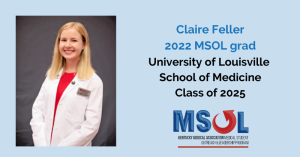 Why did you decide to become a physician?
Why did you decide to become a physician?
I was inspired to become a physician by my own experience as a childhood cancer survivor. I received amazing care from physicians who truly cared not only about treating my cancer, but also about the wellbeing of my family and myself. My experiences led me to volunteer with Norton Children’s at a young age, first with fundraising efforts and later inpatient. Given my desire to give back, coupled with my excitement for science classes in high school and undergrad, I knew that medicine was the right path for me!
Why did you decide to participate in KMA’s Medical Student Outreach and Leadership Program?
I participated in KMA’s MSOL program because I am passionate about advocacy and wanted to learn more about how to effectively advocate for my patients as a physician. Our curriculum in medical school is jam-packed with all the scientific content we need to know to be good physicians; however, we do not always have time to learn about healthcare policy and advocacy inside the classroom. The MSOL program provided a wonderful opportunity to learn about these topics.
What are some key things you learned?
I gained a better understanding of healthcare policy and the ways that it impacts practice. Additionally, I learned about concrete ways to engage in advocacy as a physician.
Would you recommend the MSOL program to other students and why?
I would definitely recommend the MOSL program to other medical students. This program is a great introduction to healthcare policy and advocacy. I felt that it provided me a foundation to build upon during residency and beyond.
One of the requirements of the program is participation in a public outreach program. What was yours?
I volunteered with Feed Louisville, an organization that prepares nutritious, fresh meals and distributes them to Louisville’s houseless population. I spent time assisting with food prep by chopping and storing fresh vegetables that the chefs used to make the meals for that week. I enjoyed getting to help their mission of combatting hunger in our community.
What do you enjoy doing in your spare time?
I love reading, traveling, trying out Louisville’s many amazing restaurants, and spending time with my wonderful friends and family.
When you graduate, where do you plan on practicing?
I’m keeping an open mind but am currently drawn to Internal Medicine or Pediatrics. As a lifelong Kentuckian, I would love the opportunity to stay close by and serve our great state!
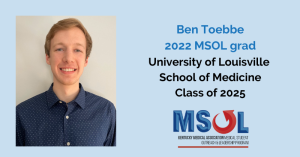 Why did you decide to become a physician?
Why did you decide to become a physician?
When I was 16, a large mass was found in my abdomen. My medical journey has been a rollercoaster with 2 misdiagnoses and a lot of unknowns, but the impact that my physicians have had on me is what motivated me to become a physician. Throughout the process, I have had many positive experiences that emphasized the impact that compassion and honesty can have when building patient relationships. I look forward to using these experiences to provide the best possible care for my future patients.
Why did you decide to participate in KMA’s Medical Student Outreach and Leadership Program?
I participated in the program because many people stressed the importance of advocacy and outreach as a physician. The MSOL program seemed like the perfect fit to get my feet wet in these areas at the beginning of my medical journey.
What are some key things you learned?
The most important things I learned were how health care impacts me as a future physician and the basics of effective advocacy and how to use my platform to uplift others.
Would you recommend the MSOL program to other students and why?
I would recommend the MSOL program because I believe that advocacy is an incredibly important concept for future physicians to start practicing as soon as possible. By the time our generation becomes physicians, I hope that programs like the MSOL program will teach us to use our platform to advocate for both our patients and other people who are not able to advocate for themselves.
One of the requirements of the program is participation in a public outreach program. What was yours?
For my public outreach, I worked together with other members of our AMA/KMA chapter on campus to create a trauma-informed care protocol for a local family medicine clinic. As part of this project, we aimed to teach employees in the clinic about the importance of trauma-informed care and creating a safe environment for their patients.
What do you enjoy doing in your spare time?
In my spare time, I enjoy playing basketball and sand volleyball, listening to podcasts, watching sports, and relaxing with my fiancé and dog.
When you graduate, where do you plan on practicing?
I’m not entirely sure of exactly where I am going to practice, but I hope to practice somewhere in Kentucky!
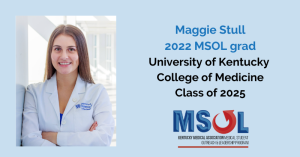 Why did you decide to become a physician?
Why did you decide to become a physician?
I decided to become a physician because I feel that it is important to advocate for, educate, and empower those who have less resources and/or education than I have access to. I want to be one of the “helpers” in the world and show other individuals who have a similar background to myself that if I can do it, they can do it too.
Why did you decide to participate in KMA’s Medical Student Outreach and Leadership Program?
The KMA’s MSOL program was offered to me at no expense during my first year of medical school. As a lifelong Kentucky resident and as someone who hopes to practice medicine in Kentucky one day, I thought that this program would be a great way to start learning about how Kentucky and medicine intermingle. This program also offered me the opportunity to become a leader among my peers and give back to my community through the outreach component of the program.
What are some key things you learned?
Some of the most interesting aspects of the program to me were about life after graduating medical school and working as a resident physician and about the ways in which the government and certain laws were involved within practicing medicine, no matter what specialty you go into.
Would you recommend the MSOL program to other students and why?
I would recommend the MSOL program to other medical students because it is a great opportunity to get acquainted with the state you are receiving your medical education from and may practice in one day. It allows you to gain education in the social, financial, and personal relationship aspects of medicine, which supplements the biomedical knowledge you are receiving while in your medical program. The demands of the program are very reasonable to complete within a year term.
One of the requirements of the program is participation in a public outreach program. What was yours?
For my participation in a public outreach program, I signed up for a shift at the Salvation Army Clinic (SAC) in Lexington, KY. This is a free clinic run by medical students at the University of Kentucky that aims to improve the health and well-being of under-insured or un-insured individuals in the community by providing medical services and referrals to other resources.
What do you enjoy doing in your spare time?
In my spare time, I enjoy listening to true crime podcasts, reading books for “fun”, and trying out new vegetarian recipes.
When you graduate, where do you plan on practicing?
Although I am not sure as to where I want to attend residency (in-state vs out-of-state), my goal is to ultimately practice medicine in my home state of Kentucky. I could see myself starting my career in a more rural area and looking to settle down in a small city as a physician who practices in a local clinic.
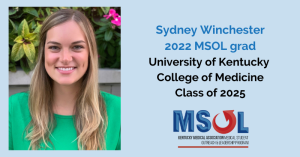 Why did you decide to become a physician?
Why did you decide to become a physician?
I have always loved basic science and its application to the human body. I wanted a career that would allow me to combine this with my passion for improving the lives of others.
Why did you decide to participate in KMA’s Medical Student Outreach and Leadership Program?
I wanted to learn more about the political, social and economic issues in the health care system – specifically those related to Kentucky.
What are some key things you learned?
This program is full of valuable information! I learned about relevant public health issues that are affecting Kentucky and about the economics that play a significant role in health care. I also learned how health care policy is changing and will impact my future as a practicing physician. One of my favorite lectures was about effective advocacy and the best techniques to advocate for yourself as a physician and your patients. I hope to use my medical expertise to improve the practice of medicine and promote better health policy and patient outcomes.
Would you recommend the MSOL program to other students and why?
Absolutely! It is a great way to learn more about health care policy and advocacy – topics that are not taught in medical school, but are so crucial to everyday practice.
One of the requirements of the program is participation in a public outreach program. What was yours?
The Salvation Army Clinic
What do you enjoy doing in your spare time?
When I am not studying, I enjoy going to OrangeTheory and walking my dogs. I am also wedding planning right now, which has been a lot of fun!
When you graduate, where do you plan on practicing?
My dream would be to stay in Kentucky – Go cats!
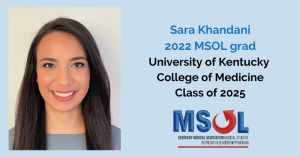 Why did you decide to become a physician?
Why did you decide to become a physician?
I’ve known I wanted to go into medicine since I was six years old. My father was a physician while I was growing up and as cliché as it may sound, he was my hero. Growing up in Iran, healthcare access was limited so many members of our community and family relied on my father during hard times. He had such a positive impact on everyone around us and it made me really look up to him. He was a healer, and I knew I wanted to follow in his footsteps since the moment I was old enough to understand the impact he had on everyone around him.
Why did you decide to participate in KMA’s Medical Student Outreach and Leadership Program?
The MSOL program caught my eye as soon as I started medical school. It felt like the perfect fit for me to be able to learn about healthcare and to give back to the community. I think another enticing aspect of the program is that it considers the challenging schedule of medical students. I really liked being able to participate in my outreach project on my own time and the flexibility ensured that I didn’t fall behind in school.
What are some key things you learned?
The program taught me a lot about healthcare policy. The seminars that I attended focused on the ties between public health and economics, patient advocacy, and the process of policy making in healthcare. These topics are not heavily covered in medical school, so I enjoyed being able to learn about a topic that heavily influences healthcare.
Would you recommend the MSOL program to other students and why?
I would absolutely recommend the MSOL program to my peers because it enriched my medical education by focusing on topics that are not heavily discussed in our day-to-day lectures. Healthcare policy and public health are two huge topics that affect our daily lives as medical students and future physicians, so I think it was important and very beneficial for me to learn more about them. Additionally, the outreach project allowed me to get out of my comfort zone and volunteer at places that I wouldn’t have typically thought to do so.
One of the requirements of the program is participation in a public outreach program. What was yours?
For my public outreach project, I volunteered at elementary schools and taught them about medicine. Alongside my peers, I attended elementary schools to teach them about vital signs and our senses. It was enjoyable to be able to revert to the basics of medicine. I also loved seeing the children’s excitement for learning about the human body through creative means.
What do you enjoy doing in your spare time?
In my spare time, I really enjoy spending time with family and friends. With medical school’s demanding schedule, I try to spend as much time with the people I care about. I specifically love to spend time with my loved ones outdoors when the weather permits.
When you graduate, where do you plan on practicing?
Although I was born and raised in a different county, Kentucky has been my home for the majority of my life. Additionally, my friends, family, and community are very important for me so I hope to practice in Kentucky and stay close to my support system.
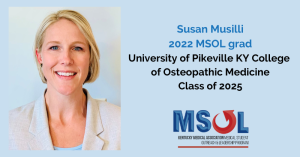 Why did you decide to become a physician?
Why did you decide to become a physician?
After spending over a decade as an ED, ICU, and flight nurse, I decided to pursue medicine. I wanted to learn more about disease and treatment as well as to become a stronger advocate for patients both locally in my community as well as regionally.
Why did you decide to participate in KMA’s Medical Student Outreach and Leadership Program?
The topics that were advertised interested me because they pertained to regulations in my home state as well as topics not heavily covered in regular course work.
What are some key things you learned?
The basics of health care policy was a great introduction into the policy landscape of Kentucky and how physicians can impact this. Learning how physician lobbying groups are involved in health care policy was also very interesting to me.
Would you recommend the MSOL program to other students and why?
I would recommend it. Student time is limited and this is a great introduction into becoming involved as a future physician without dedicating a large portion of study time.
One of the requirements of the program is participation in a public outreach program. What was yours?
Myself and several others who completed the program participated in a healthy kids’ day sponsored by the local YMCA with multiple vendors and booths set up. The purpose was to educate families on topics such as physical activity, nutrition, vaccinations, and dental health, just to name a few.
What do you enjoy doing in your spare time?
I enjoy spending time with my husband and children, running, and keeping the too many plants I have alive
When you graduate, where do you plan on practicing?
I intend to practice in Kentucky. As someone who was raised and educated here, I hope to give back to the place that made me who I am.
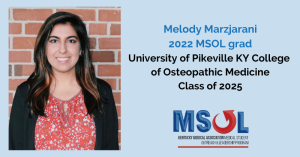 Why did you decide to become a physician?
Why did you decide to become a physician?
My love for medicine started when I was in middle school and was visiting family overseas in Iran for the summer. My cousin was a 2nd year resident at a time, and he would always share stories of how his patients didn’t have access to medications or quality care. Hearing first-hand accounts of medical shortages in Iran was something that I realized I took for granted as a first-generation American in my family. I’ve always grown up reassured that my healthcare was a guarantee, but for millions in Iran, even a simple over-the-counter medication was hard to come by. This clear need for better healthcare made me want to be a part of something that made a difference in people’s lives. Fast forward years later, I was studying for my Master of Public Health and that further reinforced my passion for medicine. Learning of how much our environment impacts our health made me want to be a force for change—to advocate for others, and to support them throughout their health journey.
Why did you decide to participate in KMA’s Medical Student Outreach and Leadership Program and what are some key things you learned?
I decided to participate in KMA’s medical student outreach and leadership program because as an out-of-state student, I wanted to immerse myself in my new community and learn of health problems and changes in healthcare specific to the state of Kentucky. Along with that, I wanted to learn from others on how I can better serve future patients. I learned of the importance of an online reputation, as physicians interact with community members on a daily basis and are considered public figures. Further, learning of the current state of healthcare—from specific health issues to seeing a rise in healthcare costs despite changes in insurance coverage—increased my awareness of what the future of healthcare will look like and how we can be a force for change.
Would you recommend the MSOL program to other students and why?
I recommend the MSOL program to other students because it gave me key things to reflect upon while working towards my degree. I learned of the many hats we will wear as future physicians: from being a team member, advocate, employee, manager, and role model within the community.
One of the requirements of the program is participation in a public outreach program. What was yours?
I volunteered at the YMCA for their Healthy Kids Day event, and it was a great way to interact with members of the community and promote healthy living.
What do you enjoy doing in your spare time?
I really enjoy reading, working out and spending time with friends
When you graduate, where do you plan on practicing?
I’m originally from Michigan and have lived there all my life so that is definitely one of my preferences, but I am open to wherever life takes me!
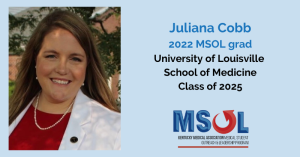 Why did you decide to become a physician?
Why did you decide to become a physician?
I have wanted to become a physician since I was 7 years old. Both of my parents were in healthcare and made the field seem interesting and exciting. As I got older, though, I came to love and appreciate the science underlying human physiology. I find myself constantly wanting to know and understand more about it and medicine provides the perfect opportunity. More than all of that, though, medicine and healthcare are some of the greatest gifts that we can provide to each other. Partnering with patients to help them lead longer, healthier lives in order to accomplish their own goals, spend time with their families, and enjoy their lives is the best way I can think of to spend my career.
Why did you decide to participate in KMA’s Medical Student Outreach and Leadership Program?
I believe that dedicated leadership training is so important and yet so often overlooked in many fields. With occasional exception, good leaders are taught, not born. The characteristics of a good leader have to be fostered and encouraged. I wanted to learn which qualities are important for my future career so that I can start building them now in order to be a better team member later.
What are some key things you learned?
I learned a lot about the finance and business side of medicine. This isn’t often emphasized during medical training but it is incredibly important to understand in order to better serve our patients. I am involved in advocacy work through my school’s AMA chapter and the MSOL program helped me to better understand the systems that are currently in place so that I can be a more effective catalyst for change within our healthcare system.
Would you recommend the MSOL program to other students and why?
Absolutely. As future physicians, we will be leaders in the field of healthcare. I strongly believe that good leaders can be taught, and we have the responsibility to hone those skills that will make us better physicians in the future. It also gives you the chance to learn things about the healthcare system that you otherwise may not find time for. MSOLP is also a great opportunity to network with other medical students in the state and meet your future colleagues!
One of the requirements of the program is participation in a public outreach program. What was yours?
I helped organize and host a community education event and policy writing workshop focused on Bluelining. We had a panel comprised of local and state legislators, legal professionals, and law enforcement who discussed the complicated history of Bluelining and how we might take steps to alleviate some of the burdens that Bluelined communities face. The event included live polling and open discussion with attendees as well as breakout groups. It culminated in the crafting of a policy memo that was sent to Louisville Metro City Council to encourage them to consider expanding access to mental health resources in Bluelined communities.
What do you enjoy doing in your spare time?
If I am not studying then I am probably at a dog park with my golden retriever, Left Twix. I also enjoy swimming, completing all kinds of craft projects, and listening to podcasts.
When you graduate, where do you plan on practicing?
That is a great question and I have no idea! I am torn between living on a beach or having some land in the mountains somewhere. It will likely come down to what specialty I end up practicing!
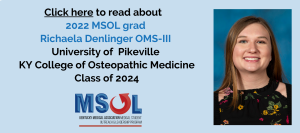 Why did you decide to become a physician?
Why did you decide to become a physician?
It all started in 8th grade when I discovered a nonprofit organization called Cure International, which was a program that sent physicians to underserved countries to provide life changing medical care to children born with defects such as cleft lip and bowed knees. After learning about this company I thought to myself, “that’s what I want to do with my life – help others to live the best life possible by providing them with life changing medicine.”
Why did you decide to participate in KMA’s Medical Student Outreach and Leadership Program?
I’ve found myself in many different leadership positions throughout my schooling career and have taken great consideration in how I am impacting the lives of everyone I encounter. Being a physician is once again another very important leadership position where I will have an influence on many patients’ lives and will have many people looking up to me for guidance. I strive to be an honest, knowledgeable, and caring leader and I knew that the MSOL program would help me to build on these qualities as I finish my medical schooling.
What are some key things you learned?
The presentations held by the program opened my eyes to real life topics and issues that are not always addressed in the classroom throughout medical school. I learned that over half of the adults in Kentucky are on Medicaid. Compared to the rest of the US, this is a 38% higher difference, and many citizens are still struggling with increased cost of health care even with coverage. Additionally, the program taught me that I can use my leadership position and voice to help influence decisions for the general population. It is important that future physicians are informed of the current social and political issues and can advocate for the best interest of the people. Through this program I learned how to reach out to legislators and voice my thoughts professionally and effectively.
Would you recommend the MSOL program to other students and why?
I would recommend this program to all students because whether we realize it or not, physicians are leaders in their community and hold many responsibilities. Physicians are the voices of their patients, and it is their duty to be an informed and honest leader when dealing with the health and wellbeing of the members of the community.
One of the requirements of the program is participation in a public outreach program. What was yours?
I participated in a “healthy kids’ day” at our local YMCA. During this event, there were fun games and activities to help kids in the community learn the benefits of being active and eating healthy and learn more about the various programs offered by the YCMA during the summer to help keep them healthy and moving throughout the summer.
What do you enjoy doing in your spare time?
I love spending time with my husband and our pets. We enjoy nature walks, golfing, trying new restaurants, playing board games, and spending time with our families.
When you graduate, where do you plan on practicing?
I am originally from a small town in Pennsylvania, so I am interested in moving back to my hometown to be closer to our family and to give back to the community that raised me.
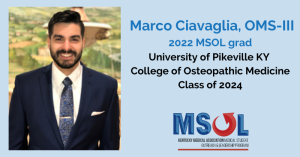 Why did you decide to become a physician?
Why did you decide to become a physician?
For me, the decision to become a physician started when I was in high school and fell in love with human anatomy and physiology. One of the projects we did as a class was to apply our anatomical knowledge to the practice of weightlifting. Placing ourselves in the optimal position to contract a muscle or muscle group was fun to me. Then we started to learn how electrocardiographs work to determine the heart’s electrical flow. But this class was only able to take me so far. I wanted to know why medications worked on the body and how we determined what to do to treat sick people. I wanted to be the person people come to when they are questioning something that is out of their normal to guide them with accurate information so they could potentially get better. These are qualities I believed were crucial to the practice of being a physician.
Why did you decide to participate in KMA’s Medical Student Outreach and Leadership Program?
During my undergraduate and current graduate medical studies, I have had a passion in connecting with others and making impacts on their lives. I knew this program would help teach me how to be a better political advocate for the field of medicine but also how to expand my mentoring capabilities to teach future students how they can navigate the ever-changing health care marketplace across the nation. Through this we can work together to push for better policies that positively effect our patients.
What are some key things you learned?
I learned how national health care policy is created, discussed, voted upon, and then implemented in the United States. We also learned how the insurance market works in the state of Kentucky. This is when we discussed the Affordable Care Act which is undoubtably one of the largest changes to our health care system in recent times.
Would you recommend the MSOL program to other students and why?
I would recommend the MSOL program because the topics discussed in the program are not things you would learn in typical medical school courses. No one tells you how insurance works or about the numerous Medicare/Medicaid rules and regulations that are being discussed and changed. You also have the ability to learn how to manage personal finances as a future physician so that you recognize your value and push for appropriate compensation for the job we perform.
One of the requirements of the program is participation in a public outreach program. What was yours?
My public outreach program was a Healthy Kids Day event with the local YMCA in Pikeville, KY. We promoted health education in a fun, interactive way with the children that attended while also encouraging parents to participate in the activities so that they became a joint family effort. There was also information booths and free blood pressure screenings offered to educate the community on the importance of preventative medicine.
What do you enjoy doing in your spare time?
In my spare time, I find myself at the gym exercising or spending time with family and friends. Life as a student and eventual physician is all about balance and enjoying the simple things becomes more important as life gets busy.
When you graduate, where do you plan on practicing?
I have no specific location where I would like to practice, however, I do know I would choose a community-based hospital system that is in an underserved area. These are the communities that are chronically overlooked and deserve better attention.
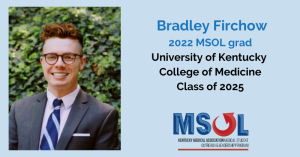 Why did you decide to become a physician?
Why did you decide to become a physician?
I decided to become a physician because I am passionate about developing leadership on rural health issues through medical care, research, communications, and advocacy. In University of Kentucky College of Medicine’s Rural Physician Leadership Program, I have found a community of like-minded future doctors who want to accompany rural communities in the Commonwealth and beyond to better health. When I lay roots down after residency, I am excited to improve health outcomes for patients in medically underserved areas, which stems from spending my formative years in rural Appalachia and Western Kentucky. I am interested in full-spectrum primary care and integrating mental health into rural care systems. I am also interested in how physicians can work at the individual and community levels to foster local healthcare capacity and resilience.
Why did you decide to participate in KMA’s Medical Student Outreach and Leadership Program?
I am a member of University of Kentucky College of Medicine’s AMA Medical Student Section, and I saw MSOL as a good opportunity to learn more about early career practice and advocacy.
What are some key things you learned?
I learned about some of the procedural intricacies of legislative advocacy, such as how the committee system can be used to quietly stall legislation or expedite its passage. I also learned about hiring practices that can be used by health systems to lock providers into a particular community, such as non-compete clauses that stipulate a practice radius and linking physicians with realtors to show them the most expensive houses in town, which may have difficulty upon resale. These are ideas I have not learned about elsewhere in my medical education, so the insights are useful as I begin to think about navigating my early career. I feel better prepared about finding information that will guide my family in the years to come.
Would you recommend the MSOL program to other students and why?
I actively recommend MSOL to other students because it provides a forum to dip your toes into topics not covered in-depth in medical school curricula. MSOL provides a branching point for finding resources and organizations, such as KMA itself, political campaigns, and financial literacy books. MSOL broadens the “community of practice” to include both the household and the political arena.
One of the requirements of the program is participation in a public outreach program. What was yours?
For my outreach project, I ran social media and crafted shareable donor asks for the University of Kentucky College of Medicine Kentucky Tornado Relief Fund, which reached over 10,000 users, 2,000 donors, and helped raise $162,000. Funds were disbursed to community organizations working to address the short- and long-term needs of people affected by the Tornados in Winter 2021. This was particularly important to me as someone who was born in Logan County, Kentucky which was on the edge of the Tornados’ paths.
What do you enjoy doing in your spare time?
In my spare time, I enjoy running, walking at the arboretum with my fiancé and our dog Dixon, reading classic texts, doing yoga, trying out new recipes, and working on my art collection.
When you graduate, where do you plan on practicing?
When I graduate, I want to practice in Central Appalachia. My fiancé and I plan to base our relocation primarily on community need for a physician and proximity to family.
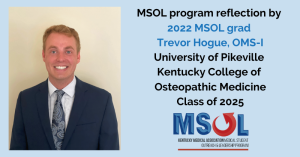 A piece of advice I heard before starting medical school was that most of the learning is done outside of the classroom. The price tag on a shiny medical school tuition paired with the vigorous study schedule would make it seem like that sentiment is, in fact, opposite of the truth. What many of us starting our career don’t realize is that being a physician is more than just being a diagnostician. There are various economic, legal, and political hoops that we are forced to jump through. The MSOL program allows a glimpse into these intricate facets of medicine, and how they can and do affect the delivery of care.
A piece of advice I heard before starting medical school was that most of the learning is done outside of the classroom. The price tag on a shiny medical school tuition paired with the vigorous study schedule would make it seem like that sentiment is, in fact, opposite of the truth. What many of us starting our career don’t realize is that being a physician is more than just being a diagnostician. There are various economic, legal, and political hoops that we are forced to jump through. The MSOL program allows a glimpse into these intricate facets of medicine, and how they can and do affect the delivery of care.
According to the 2020 United States Census, the official poverty rate was 11.4% – this means that more than 1 in 10 people in the collective 50 states are living in poverty. In Kentucky, this rate was estimated to be even higher, sitting at almost 15% (United States Census Bureau, 2020). According to the Appalachian Regional Commission (ARC), 54 of the 120 counties in the state of Kentucky are considered part of Appalachia, and while the Appalachian Mountains stretch from New York to Mississippi zigzagging through twelve states, many parts of Eastern Kentucky are the most severely impoverished. While the mountains may be known for their beautiful scenery and rolling stretches of land, they are rather isolated from other parts of their respective state. This contributes to the higher unemployment rates, lower levels of education, and thus, as published by an ARC report measuring the poverty rates of Appalachia residents of Kentucky from 2013-2017, a statistic finding that 18.3% of residents were living at or below the national poverty level (Appalachian Regional Commission, 2020) – almost 7% higher than the national average!
Picture this: your brother or sister become sick with the flu but live 2 hours away from the closest hospital. They don’t have health insurance as it is too expensive. Their current job hardly covers the cost of three meals per day, let alone an out-of-pocket deductible. If they do see a physician, it can be expensive, often creating a debt that cannot be repaid. Many times, simply scheduling a doctor’s appointment can be stressful because it is often assumed that costs are immediately incurred. These are real-life experiences the state of Kentucky faces, specifically those in Appalachia. The MSOL Program attempts to inform future healthcare providers about these intricacies that patients face – not just from the perspective of delivery of care, but from the legislative and political lens in hopes to truly enact change. In our public outreach project, we volunteered at the Pikeville YMCA for Healthy Kids Day, promoting exercise and healthy lifestyles. In fact, we were assigned to work with medical personnel at the event and help administer COVID vaccines, exercise with the children through various games, and there was even an area dedicated to healthy eating and proper diets. It is important for these children living in underserved areas such as Appalachia are educated about healthy lifestyles and habits, especially considering that Kentucky has some of the highest rates of heart disease, obesity, drug overdoses, and cancer deaths in the United States (Centers for Disease Control and Prevention, 2018).
Overall, the MSOL program enlightened me to the idea of advocacy and how to go about enacting change and navigate the legislation behind issues. They inform you who your current representatives are, how to lobby for healthcare issues affecting your region and patients, medical advocacy, and the intricacies that providers must overcome to provide superior patient care, such as the various health insurance complexities. I believe that participating in this program will allow me and all other participants to promote better healthcare delivery to our patients and improve the ability to assist them in every aspect of their health.
Works Cited:
“Poverty Rates in Appalachia, 2013–2017.” Appalachian Regional Commission, 14 Aug. 2020, https://www.arc.gov/map/poverty-rates-in-appalachia-2013-2017/#:~:text=(County%20Rates)&text=Appalachian%20poverty%20rates%20range%20from,The%20U.S.%20average%20is%2014.6%25.
“Stats of the State of Kentucky.” Centers for Disease Control and Prevention, Centers for Disease Control and Prevention, 11 Apr. 2018, https://www.cdc.gov/nchs/pressroom/states/kentucky/kentucky.htm.
U.S. Census Bureau Quickfacts: Kentucky; United States. United States Census Bureau https://www.census.gov/quickfacts/fact/table/KY,US/PST045221.
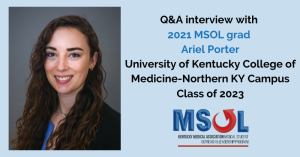 Why did you decide to become a physician?
Why did you decide to become a physician?
I decided to become a physician because I felt called to help others and was inspired by my former Neonatologist. He supported my family and me through a dark time when I was in the NICU. I am so grateful to him for his compassion and diligence during that time. I was inspired by how impactful the interventions of medicine were in my own story. This encouraged my interest in pursuing medicine as it impacts everyone and includes some of our darkest and brightest days. Physicians have the honor to be able to be there to lend a helping hand throughout all those days. I chose to become a physician because it allows me to give back and make a difference in our communities with the same blessings of care and compassion which were given to me at such an early age.
Why did you decide to participate in KMA’s Medical Student Outreach and Leadership Program?
I chose to participate in the KMA (Kentucky Medical Association) MSOL program because it allowed me the opportunity to learn more about medicine and healthcare from a unique perspective which is not taught in the classroom. The MSOL Program taught me more about health insurance, advocacy, and healthcare policies, all of which are important concepts to entering the field of medicine. It also encouraged me to get creative and build something in my community.
What are some key things you learned?
I learned more about the community that I am living in and how to better advocate for my community and my future patients. I also learned more about how some of what I learn in the classroom is applied to the real world of healthcare.
Would you recommend the MSOL program to other students and why?
Absolutely! This was a great program that allowed me to learn more medicine outside of the traditional curriculum. The program also provided me with a wonderful opportunity to grow as a leader.
One of the requirements of the program is participation in a public outreach program. What was yours?
I organized and created an outreach program at Campbell County High School with faculty for the PLTW Biomedical Sciences & Integrated Science students. This program is a series of workshops to teach the students how to conduct a patient interview. Throughout 2-3 meetings, medical students work with the high school students to teach them about patient interviewing and then they have the opportunity to practice their skills in a simulation workshop with medical students as the mediators and “patients.” High school students also have the opportunity to get to know and learn from medical students during these workshops. They were able to create connections, find mentors, and ask them questions. This program was a wonderful experience for all the high school students and medical students!
What do you enjoy doing in your spare time?
In my spare time, I enjoy running, hiking, traveling, listening to podcasts, and spending time with my loved ones.
When you graduate, where do you plan on practicing?
I plan on practicing in the field of Pediatrics.
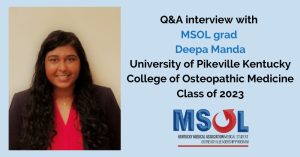 Why did you decide to become a physician?
Why did you decide to become a physician?
Throughout my schooling, I have always wanted to make an active difference to my community, but I was never sure of how I want to accomplish this. I went to the University of Akron for undergraduate school, where I became interested in public health and medicine. I explored these interests at the University of Cincinnati, where received a Master of Public Health (MPH) in Health Education and Health Promotion. Through my MPH program, I was able to combine my interests in mental health and health inequities with my love for service. By working at the Ohio Department of Mental Health and Addiction Services (OhioMHAS), I worked with other MPH students to develop a toolkit for physicians to address health inequities among racial and ethnic populations in Ohio. Through this experience, I learned how to deliver and package health related messages for the public, but I also learned that physicians to personally help individuals and they can increase public health programs by working with interdisciplinary teams. I decided to become a physician because I want to create impactful and long lasting changes to better serve our communities.
Why did you decide to participate in KMA’s Medical Student Outreach and Leadership Program?
Many massive changes occurred in the medical field these past years. The COVID-19 pandemic has forever changed the future of the U.S. healthcare system. Other issues like challenges of minority patients in the healthcare field have also taken center stage in national news. We have also seen political shifts in power among the national government. To say the least, healthcare policies have been tested with the many issues that have come up this past year. I joined KMA’s MSOL program because I wanted to learn more about advocacy and legislation in healthcare policy. In doing so, I was eager to increase my skills and knowledge to address community health issues.
What are some key things you learned?
As a medical student, it has been interesting to learn more about the changes the political systems have on healthcare policy making. Through the MSOL lecture series, I was able to further my education about the impact of the political systems in the healthcare field. I learned more about how the affordable care act has impacted healthcare costs and insurance policies, and I was surprised to see how these changes have changed under the previous administration. Also, I was able to learn more about how current physician dominated groups and political action committees have become involved in the process to advocate for changes in the healthcare field. I was able to further learn about how medical students and healthcare professionals can personally impact our communities by being a voice in their community.
Would you recommend the MSOL program to other students and why?
I would recommend MSOL program to any medical student who is interested in this program. Advocacy is a vital part of being a physician. Medical professionals not only have to advocate for our patients but also for our local, state, national and international communities. It is one of our duties and helps foster greater impact in communities. This program gives medical students knowledge and information about current healthcare policies and public health issues, along with information about healthcare providers can advocate for policy changes.
One of the requirements of the program is participation in a public outreach program. What was yours?
As a medical student, I wanted to make an impact in my community, especially in these trying times. I realized that communication is key to implementing changes and making an impact in communities. Thus, I decided that the way I could impact my community by making sure more people were educated on the issues that we as a KYCOM community were facing this past academic year. I worked with other UP-KYCOM students to help inform our student body about topics like diversity issues in medicine, Covid-19 precautions and awareness, mental health resources during the pandemic, and much more. We became the voices of our community to help spread information and resources about these topics to our community. By doing so, we became student and community leaders.
What do you enjoy doing in your spare time?
In my free time, I enjoy reading books, watching television shows and anime, and play tennis and basketball. When I have time, I enjoy participating in ceramic classes. I also enjoy playing piano despite not playing it well. Volunteering is another one of my past times. Mostly, I volunteer with NextGen America, a nonpartisan organization to increase voter registration.
When you graduate, where do you plan on practicing?
In the future, I plan to work in the Midwest.
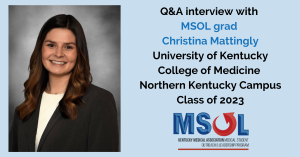 Why did you decide to become a physician?
Why did you decide to become a physician?
Physicians have an incredible opportunity to impact people’s lives more than any other field of service. A person’s state of health impacts all areas of their lives: whether they are able to enjoy their hobbies, fulfill their career dreams, or make memories with the people they love. I knew I wanted to be the one to help people maintain a state of health to live the life they imagined.
Why did you decide to participate in KMA’s Medical Student Outreach and Leadership Program?
I did not know much about healthcare policy and how changes are made at the regional and state level. I know politics and policy impact me as a healthcare worker and more importantly impact the patient population I am serving. I wanted to learn more about getting involved with health care policy and patient advocacy in the state of Kentucky.
What are some key things you learned?
I have learned more about healthcare policy and that I can be an advocate for change, even as a medical student. This program has given medical students a “springboard” to educate and advocate for the change we want to see in our healthcare system.
Would you recommend the MSOL program to other students and why?
I would recommend this program to give medical students a foundation for the ways they can get involved with healthcare policy and advocacy in the state of Kentucky in medical school and throughout their career.
One of the requirements of the program is participation in a public outreach program. What was yours?
For our outreach program our campus held a zoom event where we met with local high school students to talk about pursuing a career in medicine. We simulated patient interviews and how we collect information from
What do you enjoy doing in your spare time?
In my spare time I enjoy gardening, playing with my two dogs and spending time with my family.
When you graduate, where do you plan on practicing?
When I graduate, I would like to practice pediatrics in central Kentucky.
Why did you decide to become a physician? 
I decided to become a physician due to an unequivocal passion to utilize both my drive for success and my desire to excel in my education—to create a better, healthier, and more comfortable life for others to live. There is absolutely a lot to be proud of for any physician, as the road to an MD is not an easy one by any means, but the drive to accomplish this must be fueled by something much deeper and more powerful than a desire for self-gratification; in my case, as with many others, this drive is fueled through the altruistic passion to help others. The reward of knowing that your hard work and dedication to your studies is going to one day save a life—to give a mother and daughter a chance to live a longer life together, to give a husband and wife an opportunity to have a child that they thought was not possible, to give a grandmother and grandfather an opportunity to see their grandchildren—these are the reasons why I chose to become a physician.
Why did you decide to participate in KMA’s Medical Student Outreach and Leadership Program?
I heard about the MSOL program through our AMA chapter at the University of Kentucky College of Medicine. I was immediately interested when I learned that this was a program that allowed all medical students across the state of Kentucky to participate, giving us an opportunity to all share an educational experience during medical school. In a sense, the MSOL program served to me as a bridge between all of the medical schools in Kentucky. I felt as though it was to the advantage of all medical students in the state of Kentucky to participate in the MSOL program for this reason.
What are some key things you learned?
The MSOL program emphasized the importance of community service, health care policy, financial literacy, and legislative process advocacy. Several topics were covered in this program that were real-world problems that all physicians will face, including controlling your reputation, general rules on employment contracts, roles we can have as community leaders, and using our platform on the forefront of medicine to effectively communicate with members of the Kentucky government.
Would you recommend the MSOL program to other students and why?
I would absolutely recommend the MSOL program to other students. The MSOL program focuses on real-world knowledge that is very beneficial for future physicians. The program helped me prepare for challenges that I will certainly face in the future, and I am now more informed on how to handle these challenges when they present themselves later on in my medical career. Prior to medical school, I received my MBA from the University of Kentucky. The MSOL program briefly discussed many topics that I had covered in my MBA program. For every medical student to have the opportunity to be exposed to this information at such an early point in their medical training is a great advantage to have in our careers.
One of the requirements of the program is participation in a public outreach program. What was yours?
For our public outreach program, the program participants at the University of Kentucky College of Medicine-Northern Kentucky Campus all worked together to host Campbell County High School biomedical students in a mock interview session. This was very fun and was also an opportunity for us to help share some of our experiences with high school students that we believed would be beneficial to them at this point in their career decision making path. The first time I was able to participate in a mock interview was my first semester of medical school. It would have been an unforgettable experience to be able to do this as early as high school. The students were all very engaged and I am glad our class worked together to make the public outreach program a group effort.
What do you enjoy doing in your spare time?
My favorite activity in my spare time is cooking. I believe that food is a universal language. Learning how to cook foods from different countries teaches me so much about different cultures. I find cooking to be very therapeutic during stressful days. I enjoy cooking for others, which has given me an opportunity to also incorporate cooking into my social life by having people over for dinner as often as possible.
In addition to cooking, I also love to exercise regularly. I go to the gym 3 to 4 days a week and believe this is essential for my mental health during medical school. I play on various teams for Cincinnati Sports Leagues including sand volleyball and kickball, which is a great way for me to not lose touch with friends of mine who are not in medical school. I also enjoy playing tennis and pickleball with my classmates on days that we have extra time. Through balancing cooking, exercising, and a healthy social life, I have been able to reduce my stress levels during medical school and enjoy my experience as a medical student.
When you graduate, where do you plan on practicing?
I would like to practice wherever I can best serve a community while also raising a family. I believe it is best to approach this with an open mind. However, if I were to practice in a larger city, I would still want to spend some of my time in more rural areas to help give back to the communities that I grew up in. This is a decision that I will be giving more thought to when I decide where I will apply for away-rotations during for my fourth year of medical school.
 Why did you decide to become a physician?
Why did you decide to become a physician?
My interest in becoming a physician is mainly due to my desire to serve medical mysteries and my interest in health disparities. I will have the chance to serve those who can’t afford health care otherwise and maybe people who have never seen a physician before. Additionally, a career in medicine is one of the only careers where you can integrate service, teaching, research, and outreach while also feeling like you are constantly making a difference. A profession in health care also guarantees lifelong learning, which keeps me engaged and is one of the biggest reasons I’d like to be a doctor. As a doctor, you have the opportunity to directly help improve another person’s life and make an impact on the trajectory of another person’s health. A career in medicine will give me the opportunity to problem solve and work towards determining the root causes of medical ailments.
Why did you decide to participate in KMA’s Medical Student Outreach and Leadership Program?
I wanted to join the KMA’s Medical Student Outreach and Leadership Program so that I could become a more effective leader, to serve my community, and to learn more about legislation to become a more effective clinician.
What are some key things you learned?
I learned how to become a better patient advocate and how to get more involved in public policy. I also learned that physicians could have a great impact on legislation in the state of Kentucky, which I think we often overlook the impact we can have.
Would you recommend the MSOL program to other students and why?
Absolutely! I think that this was a great experience and taught me a lot about health care policy and advocacy. One of the most important things I think this program discussed was how to deal with finances and loans that we obtain in medical school. I believe this is something that is critically important for students to know, and it is not something discussed extensively in medical school.
One of the requirements of the program is participation in a public outreach program. What was yours?
One of the most important things I wanted to accomplish was identifying a need in the city of Louisville. We have a very large population of individuals suffering from homelessness, so I wanted to do something to try to help to meet the needs of individuals. I worked with another MSOL graduate and we purchased food to feed the homeless. We recruited a group of over 10 medical students and we cooked a warm meal and delivered socks, shoes, clothes, blankets.
What do you enjoy doing in your spare time?
I enjoy arts and crafts and playing volleyball, swimming, and cycling!
When you graduate, where do you plan on practicing?
When I graduate, I hope to practice in a low-income metropolitan area, similar to Louisville. I ultimately want to serve both disadvantaged and minority populations.
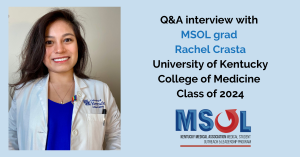 Q: Why did you decide to become a physician?
Q: Why did you decide to become a physician?
I was drawn towards being a physician because it is not a stagnant profession. Every day we learn more and more about improving patient care and different treatments. Furthermore, I like that physicians also embody many roles—teacher, confidant, and problem solver to positively impact a person’s life.
Q: Why did you decide to participate in KMA’s Medical Student Outreach and Leadership Program?
My classroom education is preparing me well for my work inside the hospital, but I needed more training for my future work outside the hospital which is why I decided to participate in KMA MSOL program.
Most of our patients’ time is spent outside the hospital. Contrary to popular belief, most of their outcomes and well-being are dependent on factors outside the hospital. Our mission as physicians is to better the lives of others. Physicians’ impact can extend beyond the hospital, therefore our responsibility must extend beyond the hospital.
Q: What are some key things you learned?
I learned that in Kentucky there is still a lot of work to be done to control health care costs, provide more people with coverage, and address access issues. I’ve realized the importance of physicians being active leaders beyond the hospital doors. Advocating for other physicians or healthcare workers and the people they care for is a privilege. Legislative advocacy allows physicians to be involved in decisions that impact them and their patients by tracking bills and familiarizing themselves with the issues at hand. Much of our country’s laws relate to healthcare, yet few of our country’s lawmakers come from medicine. Physicians need to weigh in, teach, and guide our legislators to form policies that benefit our patients.
Q: Would you recommend the MSOL program to other students and why?
I would! The MSOL program demonstrates that being a physician extends beyond the hospital doors. It gives students insight into the whole picture of being a physician from understanding the legislative aspects of the profession to ways to be better leaders and advocates not only for your patients but also your colleagues.
Q: One of the requirements of the program is participation in a public outreach program. What was yours?
I volunteered at COVID vaccination clinics throughout Lexington and provided medical care to Lexington’s homeless population at the Salvation Army Clinic.
Q: What do you enjoy doing in your spare time?
I enjoy spending time with my family and playing with my cat, trying international cuisines, hiking, and traveling.
When you graduate, where do you plan on practicing?
Lexington is my home and I absolutely love living here. I would love to remain close to my family and plan to practice in or around the Lexington area.
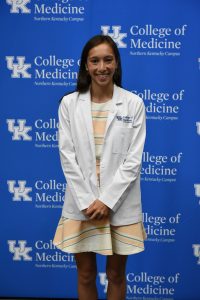
Interview with Callen Conroy, University of Kentucky College of Medicine, Northern Kentucky campus, Class of 2024
Q: Why did you decide to become a physician?
When I was deciding what I wanted to do as a career, I thought about what type of impact I wanted to have on the world. I wanted to choose a career where the main goal was to help people, to make them feel happy and well again. As I continued through my education I found a love for science, particularly biology and microbiology. I became interested in how our bodies worked in such a specialized manner, and I was curious to learn more about how things can go wrong with our bodies and how to fix them. I eventually pursued a career as a physician because I knew that becoming a doctor would be a way to help people using the scientific knowledge that I loved.
Q: Why did you decide to participate in KMA’s Medical Student Outreach and Leadership Program?
As a physician, I want to be able to help people on a one-on-one level at my practice, but also to be able to work past that and help provide support to the community in whatever way possible. I want to give people the support they need to be the best version of themselves which means helping to take care of the community via support and prevention rather than fighting each disease as it comes. Therefore, I joined MSOLP so I could learn more about the community and various cultures around me and use that knowledge to aid my approach to becoming a physician.
Q: What are some key things you learned?
One of the most important things that I learned from MSOLP is that trust is one of the most important parts of healthcare. I want to remember that a patient’s trust in a physician is not a guarantee. Physicians need to earn that trust by listening to their patients, being empathetic, and understanding of their patients’ illnesses as well as their patients’ overall lives.
Q: Would you recommend the MSOL program to other students and why?
I would recommend the MSOLP to other students because I think that as medical students it can sometimes be easy to become blinded by the amount of textbook, course materials, and exams that we must study for. The MSOLP provides and avenue to remember that being a physician is not only about how many facts you can recall. It’s also about being a community leader and someone that other people entrust their lives to. Physicians need to be aware of each patient’s culture and lifestyle, and MSOLP did a good job of providing the knowledge on community and leadership that all physicians should maintain.
Q: One of the requirements of the program is participation in a public outreach program. What was yours?
We went to a local school and connected with some of the high school students. It was nice getting to talk to the students and hear about what they wanted to be when they grew up. They shared their ambitions and interests. Many of them were interested in science, so it was nice getting to talk to the next generation of future scientists and learn about their perspective on the world. Talking to the kids was fun because they were optimistic and excited about their careers in science. It reminded me of when I was their age, and I was glad to be able to be there to answer their questions and give them some motivational support that hopefully they will remember in the future.
Q: What do you enjoy doing in your spare time?
In my free time, I like to play soccer. I grew up playing soccer, and it’s a fun way to get some exercise in and take a break from school.
Q: When you graduate, where do you plan on practicing?
I’m not sure what type of physician I want to be yet. I’m interested in a lot of things, so I will have to work on narrowing down the options.
Q& A with MSOL graduate Bharath Chithrala, KYCOM OMS-II
University of Pikeville, Class of 2024
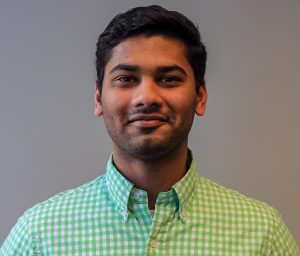 Q: Why did you decide to become a physician?
Q: Why did you decide to become a physician?
A: Growing up as a child in rural India, I was exposed to poverty and a myriad of healthcare issues that affected every aspect of my family’s life. We used antiquated home remedies to cure ailments, and our food often made us sick. Instead of compassion, the doctors are motivated by greed, and hospital conditions were neglected because no one sincerely cared about the patients. If my parents had decided not to move to America, I would still be trapped there. Since I immigrated to the United States, I have pursued countless opportunities to continue my healthcare education and to become a physician.
Q: Why did you decide to participate in KMA’s Medical Student Outreach and Leadership Program?
A: I participated in the KMA’s MSOL program because I wanted to be a well-rounded medical student that is knowledgeable about the political, social, and economic issues in the health care system.
Q: What are some key things you learned?
A: Lawmakers for my region are willing to listen to me and my opinion. I was able to speak with my representative and provide him my thoughts in regard to bills that were being voted on.
Q: Would you recommend the MSOL program to other students and why?
A: I would 100% recommend the MSOL program because becoming a physician is more than just medical school. Students need to be knowledgeable about all topics regarding healthcare. MSOL provides students with opportunities to hear from a variety of speakers in many different topics.
Q: One of the requirements of the program is participation in a public outreach program. What was yours?
A: My public outreach program was volunteering at the local soup kitchen. I volunteered many weekends and helped make over 500 meals that were donated to the local emergency shelter.
Q: What do you enjoy doing in your spare time?
A: Going to the gym, reading books, watching sports, hanging out with friends and traveling as much as I possibly can.
Q: When you graduate, where do you plan on practicing?
A: I am very open minded to where I want to practice medicine!
Q&A with MSOL graduate Ellora Amrit
University of Kentucky College of Medicine, Class of 2024
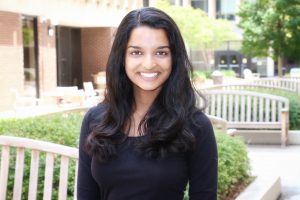
Q: Why did you decide to become a physician?
A: I wanted a career where I could form connections with people and advocate for those who cannot do so for themselves. My experiences in college such as participating in the Summer Health Professions Education Program and the Summer Undergraduate Research Experience in Environmental Health Science gave me a further look into the work that physicians do and made me realize that it is the right career path for me.
Q: Why did you decide to participate in KMA’s Medical Student Outreach and Leadership Program?
A: I saw the MSOLP program as a great opportunity to learn more about the community where I am learning and may one day practice medicine in.
Q: What are some key things you learned?
A: I learned how to not only how to advocate for my patients but also how to advocate for myself as a physician. Coming from a family of no physicians, this was especially useful for me. I learned important tidbits of advice such as the importance of using an attorney while signing a contract as a physician and other useful financial information with is not presented in the regular medical school curriculum. I also learned about the unique healthcare needs of Kentuckians including the proportion of Kentuckians on Medicare and Medicaid and how the Affordable Care Act has helped Kentuckians.
Q: Would you recommend the MSOL program to other students and why?
A: I would definitely recommend the MSOL program to other students as is provides great information on how to be fairly compensated in your future career as a physician as well as the best avenues to take to advocate for your patients.
Q: One of the requirements of the program is participation in a public outreach program. What was yours?
A: I volunteering to help give COVID vaccines in our community.
Q: What do you enjoy doing in your spare time?
A: I enjoy going on long walks, doing yoga and listening to one of Taylor Swift’s many albums.
Q: When you graduate, where do you plan on practicing?
A: I plan to have a General Pediatrics Practice in Kentucky.
Multitalented MSOL Grad Andrew Ray Discovers Career in Medicine Through Experience in Research and Pharmacology
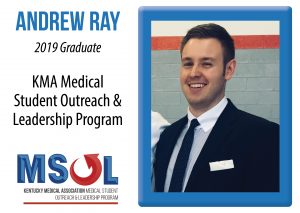 A renaissance man can be described as “a person with many talents or areas of knowledge.” Andrew Ray, a graduate of KMA’s Medical Student Outreach and Leadership Program (MSOL), fits that description.
A renaissance man can be described as “a person with many talents or areas of knowledge.” Andrew Ray, a graduate of KMA’s Medical Student Outreach and Leadership Program (MSOL), fits that description.
He’s studied German, chemical science, pharmacology, sociology, and research and plans to earn an MBA while studying to become a physician.
Currently a second-year medical student at the University of Louisville, in his spare time, he enjoys listening to podcasts about Navy Seals, ultra-marathon runners and “people who are unbelievable,” he said. Radiolab is one of his favorites.
He’s also training for a mini marathon this May.
A native of Louisville, Ray graduated from St. Xavier High School. He received his undergraduate degree in chemical science at Xavier University.
During college, he served as a research assistant at the University of Cincinnati where he had the chance to work with pharmacology and chemistry faculty members who were studying a small town outside of Cincinnati where a steel plant contaminated the town’s water supply. “There wasn’t a good way to test for the heavy metal that was making people sick,” he said. “The University of Cincinnati and Xavier paired up to help find the root cause of the illness and prevent it.”
After graduating from Xavier, his mentors encouraged him to investigate pharmacology. “A lot of people mistake pharmacology for pharmacy,” he said. “The difference between a pharmacist and a pharmacologist is the pharmacist is applying what a pharmacologist has learned/discovered.”
He says it’s an interesting field because it integrates different basic sciences. “It’s chemistry meets biology in terms of medicine and it’s somewhat chemical engineering as well because you’re trying to take advantage of certain biology to treat disease to make people better,” he said.
While earning his Master of Science in pharmacology from the University of Cincinnati College of Medicine, he served as a graduate student researcher at Cincinnati Children’s Hospital Medical Center where he studied zebrafish to learn how to treat circulation disorders. “You can see from the outside of the fish how their circulation develops,” he said.
He admits he came to the decision to study medicine a little later than most people. “I had a pretty decent career as a researcher,” he said. “I went into this field thinking you get a pretty gratifying career where the drugs or methods you develop help people directly,” he said.
But this self-proclaimed “people person” discovered a research career was more about lab work and animal research.
“I wanted to see the hard work that I was putting into research pay off more directly,” he said. “In medicine if you do clinical type transitional research, that’s the kind of thing you see every day, so I transitioned out of my researcher career and into medical school.”
Ray attributes KMA’s MSOL program with helping him “take the plunge” to pursue his MBA. “I’m enrolled for the 2023 MBA class at UofL,” he said.
He and fellow second year M.D./Ph.D. program student Casey Woolley recently revamped the Innovation in Medicine Club at UofL. “It’s a club that explores what the medicine of tomorrow would look like,” he said. Topics of discussion include how Artificial Intelligence and research tools like CRISPR will play a role in medical in the future.
“It (MSOL) gives them a more thorough understanding of the community and state they’re going to be practicing in, or at least training in. It gives them a financial history of the challenges people are facing. It gives them the beginning education on how we pay for healthcare.”
Ray said he thinks it’s important for the next generation of physicians to have some sort of education on healthcare financing, the way healthcare is managed in big hospital systems, insurers involvement and how insurance can change over time.
“I think every student should have to participate in the MSOL program,” he said.
Rachel Safeek Leads the Way for Local and Global Health
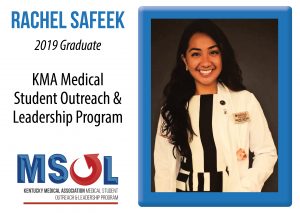 Rachel Safeek, a second-year medical school student at the University of Louisville, is combining her passion for public and global health with her love of medicine.
Rachel Safeek, a second-year medical school student at the University of Louisville, is combining her passion for public and global health with her love of medicine.
The daughter of immigrant parents, her father Yisreal is a former anesthesiologist originally from South America and her mother Gina is a former nurse from the Philippines. Fluent in Portuguese, Safeek has completed public health work in South America, and hopes to continue work abroad after graduating medical school.
After receiving her undergraduate degree in health policy and a distinction in global health from Duke University where she graduated with honors, she went on to receive her Master of Public Health degree, with a concentration in infectious diseases from the Emory Rollins School of Public Health in Atlanta, where she graduated with Delta Omega Honors.
Medicine wasn’t part of her career path until her second year of graduate school.
“I began work in Centers for Disease Control funded clinical based projects including clinical research and working with patients,” she said. “I enjoyed the patient interaction.”
Safeek believes it’s important for medical students to remain advocates while they are in medical school.
She’s the medical student section representative on the Kentucky Medical Association Board of Trustees and president of the UofL chapter of the American Medical Association.
“There’s a misconception, particularly in medical school, that you don’t have that opportunity to take a stand, but I appreciated the opportunity and the avenue carved out by the AMA and the KMA to get involved in advocacy work and in policy,” Safeek said.
Safeek is a 2019 graduate of KMA’s Medical Student Outreach and Leadership Program. For her community service project requirement, she focused on gun violence prevention and has led the efforts at the UoL medical school to help prevent firearm related injuries.
“About 40,000 Americans die and 85,000 others are injured each year from firearm-related causes, and the incidence of firearm-related morbidity and mortality has increased over the past decade,” Safeek said. “This is a very important public health issue.”
“We didn’t have anything in the curriculum about talking to the patients about gun safety,” she said. “This is Kentucky where a large part of the population are firearm owners. It’s important that we can talk to our patients about how to safely store their guns and how to prevent young children from getting access.”
Thanks to her leadership, UofL voted to include a gun violence prevention component in the school’s curriculum beginning with the 2020-2021 academic year.
“It started with advocacy through the AMA and KMA student chapter group,” Safeek said. “This is a new generation of medicine and it’s an important topic that we need to address.”
She’s also helped organize Gun Violence Week, Feb. 17 – 21, to educate UofL medical students, faculty and residents on firearm violence prevention.
After she graduates from medical school, Safeek plans on combining her public and global health backgrounds with her passion for advocacy.
“If I practice in Kentucky, I plan on staying active in the KMA and AMA bringing forth resolutions that address important topics like health disparities,” she said. “I’m active in public health disparities research and I’ve published a lot about HIV, one of my first passions when I came to medical school.”
“Sometimes when you start a new chapter of your life, your interests change a little bit,” she said. “That’s why I’m trying to figure out if I really like surgery or infectious disease. Whatever specialty I choose, I plan to remain active with the medical association, continuing with legislation and research.”
In her spare time, she enjoys lifting weights, working out and travelling.
Tim Berg Values Team-Based Approach to Medicine and Interaction with Others
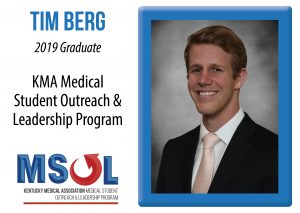 Tim Berg grew up in a family of physicians who taught him the importance of service.
Tim Berg grew up in a family of physicians who taught him the importance of service.
“They emphasized there were a multitude of ways you could serve people, whether it be through education, the arts, or medicine,” Berg said.
A fourth-year medical school student at the University of Kentucky, Berg chose to follow in his parents’ footsteps and plans on specializing in general surgery.
“I really like team-based medicine and interacting with patients,” said this self-proclaimed extrovert. “In general surgery, you see patients in pre-op, in the OR, in post-op, and you’re trying to deal with all their complications so you’re always interacting with them.”
His father, Sven, practiced for several years as a pediatric oncologist in the Air Force. He currently serves as CEO of Quality Insights in Charlestown, W.Va.
His mother, A’Lynn, is a retired pediatric nurse practitioner and his brother Patrick is in his last year of a general surgery residency.
Born in Memphis, Tenn., Berg has lived in eight states and spent four years in Portugal. Fluent in Portuguese, he did a medical study abroad program in Costa Rica during his first year of medical school.
His love of people is matched with his affinity for travel. He’s been to 15 countries and 48 states. “I love trying to immerse myself in other cultures—to understand where people are coming from,” he said. “The more we understand people, the better we can treat them.”
He completed his undergraduate degree in microbiology at Brigham Young University. When his parents moved to Ashland, he followed them and decided to attend UK, where he’s applied for his residency.
“I’ve adopted Kentucky as my home now,” he said. “I love living in Lexington.”
A graduate of KMA’s Medical Student Outreach and Leadership Program (MSOL), Berg said the program was good at getting students involved and informing them about the major issues facing physicians and patients.
“I learned we really do have a powerful voice for our patients,” he said. “I want to make sure that my patients are safe and that they’re getting the best care possible and that the laws protect them.”
For the MSOL volunteer requirement, Berg was a regular volunteer at the Salvation Army Clinic where he interacted with patients as a floor manager and interviewer.
He is the current president of his medical school class and serves on the dean/student advisory committee. Berg relishes his leadership roles and understands the importance of the contributions of others around him.
As a future surgeon, Berg said, “The surgeon is the team leader, but everyone has a very important role to play.”
Julie Beck Enjoys Giving Back to Her Community
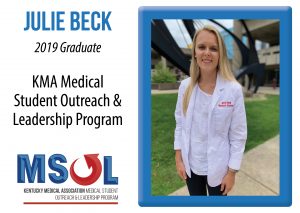 Volunteering has always been important to Julie Beck, a third-year medical school student at the University of Louisville, where she’s serving as the medical school class of 2021 volunteer coordinator.
Volunteering has always been important to Julie Beck, a third-year medical school student at the University of Louisville, where she’s serving as the medical school class of 2021 volunteer coordinator.
Beck, the first person in her family to become a physician, first realized she wanted to become a doctor during her freshman year at Ryle High School in Union, Ky.
With the encouragement of her mother, Beck participated in a week-long national youth leadership forum at Villanova University where she learned about medicine.
“I’m leaning toward primary care,” she said. “I really enjoy family medicine.”
What sold her on family medicine was her area health education center rotation in a small office in Somerset, Ky. “Even just being there a month, I got to see some patients multiple times,” she said. “Those interactions you get to have with people in a small office is just really special.”
Beck has her undergraduate degree in biology from UofL. She’s completed three full rotations and is currently working on her fourth.
She is a 2019 graduate of KMA’s Medical Student Outreach and Leadership Program. “The outreach part is really special to me,” she said. “KMA does a good job of showing you how you can implement community service into your career as a physician and also how to develop leadership skills that we will carry with us when we become physicians in the community,” she said.
She volunteers in the emergency department at Norton Children’s Hospital and has also helped her medical school class plan events such as a Thanksgiving food drive and a Christmas party at Seneca Place nursing home.
This year will be the third year she’s helped plan the Christmas party. “There’s a music group made up of medical students who get together and sing and play instruments,” she said. “They come and do the Christmas carols. And we have sugar cookies, which I make, that the residents help decorate while we listen to Christmas music and talk. It is wonderful.”
When asked if she is part of the music group, she laughs and says, “I’m not that gifted.”
In addition to baking, she enjoys working out and is training for another half marathon. She completed the Medals4Mettle marathon her first year of medical school where UofL medical students present their medals to pediatric patients. This spring, she plans on running in the Flying Pig marathon. “I’m told there are more hills though because it’s in Cincinnati,” she said. “We’ll see how it goes.”
Spanish Opens Doors for MSOL Grad Jerome Soldo
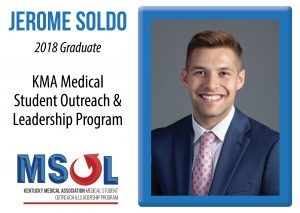 Jerome Soldo has spent hundreds of hours volunteering as a medical interpreter at the Kentucky Racing Health Services Center, a health clinic for people who work on the backside of Churchill Downs, many who are migrant workers from Latin America.
Jerome Soldo has spent hundreds of hours volunteering as a medical interpreter at the Kentucky Racing Health Services Center, a health clinic for people who work on the backside of Churchill Downs, many who are migrant workers from Latin America.
“I saw how much of a difference providers made in the lives of the people at the clinic and thought how awesome it would be if I could do that too,” he said. “Family medicine seemed like the best route to becoming a primary care provider.”
Currently a third-year medical student at the University of Louisville, Soldo is interested in specializing in family medicine and wants to become a primary care provider.
“I like the philosophy of the field in terms of serving everybody, being an advocate for patients, and treating people holistically,” he said.
Fluent in Spanish, his major at UofL, Soldo enjoys communicating with his Spanish speaking patients during his current OB/GYN rotation.
“The language skills definitely open doors in terms of being able to see a more diverse patient population and make people feel more comfortable by speaking in their native language,” he said.
Soldo has a special place in his heart for Latin America. He minored in Latin America and Latino Studies at UofL and traveled to Peru the summer after his freshman year where he did some volunteering and backpacking.
“I stayed in Latin America and backpacked through Bolivia and Argentina on route to Chili,” he said. He also spent a semester abroad in the south of Chile.
“My practice will probably be in the United States, but I definitely would like to find somewhere in Latin America where I’d like to return to regularly for medical service and education,” he said.
He has also served as a medical interpreter for Surgery on Sunday Louisville since the fall of 2014 and became the medical interpreter coordinator in the fall of 2017.
Surgery on Sunday Louisville is a nonprofit organization based in Louisville that provides free outpatient surgical and endoscopic care to income-eligible members of the community who are uninsured or underinsured.
“I make sure they have qualified language interpreters at all our clinic and surgery events and I also recently started managing their social media accounts,” he said.
A 2018 graduate of KMA’s Medical Student Outreach and Leadership Program (MSOL), Soldo was the health care policy representative for his medical school class last year where he served as the liaison between his class, the Greater Louisville Medical Society, KMA and the American Medical Association.
“I’m interested in health policies,” he said. “Physicians in society have a larger role to play. There’s a lot we can do to use the privilege that we have as educated citizens and respected members of society to advocate for policies that improve the health of the public and improve our patients’ health.”
He said his MSOL experience helped him learned more about how to write and speak out for policy. “I learned how to find out who our legislators are and how to use our voice to influence them,” he said.
“Participating in the program helped me feel more connected to the KMA and have a better understanding of what it is and what it does and how students can be involved.”
In his spare time, Soldo enjoys running, having coffee with friends, traveling, reading articles on politics and cooking vegetarian food.
MacKenzie Wyatt Connects with Her Patients Through Music
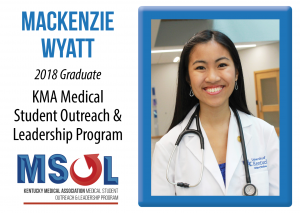 MacKenzie Wyatt has been a musician her entire life. This fourth-year University of Kentucky medical school student, who plans on specializing in pediatrics, recently taught herself how to play the ukulele by watching YouTube videos. Her patients enjoy listening to her play and she says this is just one way she connects with them.
MacKenzie Wyatt has been a musician her entire life. This fourth-year University of Kentucky medical school student, who plans on specializing in pediatrics, recently taught herself how to play the ukulele by watching YouTube videos. Her patients enjoy listening to her play and she says this is just one way she connects with them.
“I think patients really appreciate when you spend extra time with them and get to learn more about them,” she said.
“She is going to be an amazing pediatrician because she is able to make every person she meets feel special and unique and seen,” said her friend and fellow medical school student Hannah Ruggles. “She is a passionate advocate for the underserved and I have no doubt she will be an asset to her patients and her community as a physician. She is the kind of person you want to have in your corner.”
“Music really changes the plasticity of the brain,” she added. She became interested in neuroscience after reading This Is Your Brain on Music by Daniel J. Levitin. So much so, she majored in it as well as in behavioral biology at Emory University. “My research project in undergraduate was on the songbird,” Wyatt said. “I got to relate the musicality in birds with how their brains are developing.”
Wyatt says she first became interested in medicine her junior year at Montgomery County High School in her hometown of Mt. Sterling, Ky.
“I shadowed Dr. Case Ratliff and I just loved it,” she said. She said she knew she wanted to work with kids before she decided to study medicine. “I’d always thought about teaching, nonprofit work or advocacy,” she said. “I found out (in medicine) you could be an advocate, you could be a teacher for your patients, but also treat your patients and have meaningful relationships with them.”
Music is an important part of Wyatt’s life. In middle school she won the title of Renfro Valley “Country Talent of the Year.” She participated in musical theatre during high school and performed acapella during college.
Wyatt is a 2018 graduate of KMA’s Medical Outreach and Leadership Program. For the community service requirement, she served as captain of UK’s college of medicine DanceBlue team. She and her team of twelve medical school students help raise money for pediatric cancer, as well as volunteer to sit with families who have children fighting cancer. She’s followed one little boy on his cancer journey for three years. “Today is his last cancer treatment,” she said. “It’s exciting to see him ring the bell to celebrate.”
During her time at Emory, she travelled to Washington, D.C. and met Emory alums who worked at the United States Capitol as lobbyists. “We got to meet the clerks for Supreme Court Justices Sonia Sotomayor and Ruth Bader Ginsberg,” she said. “We met with Congressman John Lewis and a lot of other famous senators and representatives. They taught us how important advocacy is and how doctors have a lot of power in that.”
This February, she’s excited about taking a pediatric advocacy class where she’ll create a project and present it to her state representatives. “Hopefully, it will effect change,” she said.
She served on the curriculum committee the first two years of medical school and has served on the admissions committee the past two years.” I think it’s really important to help the communities that invest in you,” she said. “The college of medicine has been a huge part of my life. Being able to give back to UK is really important.”
Hannah Ruggles’s Path to Medicine Influenced by Love of Chemistry, Math and Helping Others
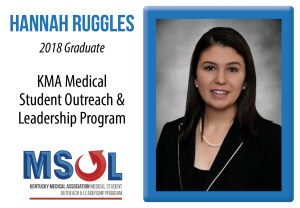 A fourth-year medical student at the University of Kentucky, Hannah Ruggles said the combination of humanitarianism and science is what led her to study medicine.
A fourth-year medical student at the University of Kentucky, Hannah Ruggles said the combination of humanitarianism and science is what led her to study medicine.
“I really love chemistry,” she said. “Chemistry has lots of equations and math problems to solve and the balance of finding equilibrium and how electrolytes flow.”
She also loves math. So much so she took five math courses at Lexington Catholic High School in Lexington rather than the required four.
Ruggles was the salutatorian of her high school graduating class and the recipient of Western Kentucky University’s Presidential Scholarship, the highest merit award offered. She graduated summa cum laude from WKU with a Bachelor of Science degree in chemistry and a minor in gerontology.
She says she knows the combination of chemistry and gerontology might seem strange, but it’s a perfect fit for her. “As a kid I was very close to my grandparents,” she said. “Seeing all their various health issues and watching them age made me want to learn more about how we can create living situations for older adults to maintain their dignity and independence.”
She became aware of the special needs of the aging population when she worked at an independent pharmacy with her Aunt during her senior year of high school. “I learned a lot there, not just about medications,” she said. “I became particularly aware of how common the practice of polypharmacy is within the geriatric population and how confusing this can be for the patient.”
She says this experience will help her when she’s a physician. “It’s the other side of things we don’t get to see,” Ruggles said. “We (doctors) write on the prescription pad but we’re not in the pharmacy when the patient doesn’t have the money to pay for the medication.”
Ruggles was focused on internal medicine for most of medical school until the end of last year when she did a pediatric rotation. Now she’s interested in Combined Internal Medicine and Pediatrics and specializing in nephrology. “It would be a lot of training,” she said. “Four years to complete a med-peds residency and another four years to do a fellowship to be an adult and pediatric nephrologist—but I have time.”
Her friend, MacKenzie Wyatt, also a fourth-year medical school student at UK, is one of Ruggles’s best friends. “Hannah is motivated by her patients,” Wyatt said. “She goes above and beyond for each of them, caring about them so much and always researching and learning new things about each of them. Hannah puts her all into everything she does and exemplifies a compassionate person.”
Last year, Ruggles completed KMA’s Medical Student Outreach and Leadership Program (MSOL). “There was a big group of students from UK who participated that year,” she said. “I knew the program had a medical advocacy component and I wanted to understand how politics and policy at the state level influence medicine.”
Ruggles said she joined KMA, the Lexington Medical Society and the American Medical Association because of her participation in the MSOL program. One piece of advice she gives to first year medical students is to be involved earlier, especially in advocacy. She wishes she would have attended the AMA conferences and helped write policies.
“The (MSOL) program helped me appreciate the importance of physicians as a group,” she said. “Having a voice in policy making and legislation is important. Prior to participating in MSOL, I thought about physicians working at the patients’ bedside or in the clinic or hospital. I didn’t really think about how much medicine is influenced at the state level. We advocate for our patients every day when we’re treating them in the clinic or in the hospital, but that duty needs to extend beyond just the bedside as well.”
To fulfill the community service requirement of MSOL, she served as the training coordinator at the University of Kentucky Salvation Army Clinic where she trained the entire first year medical school class to assist in patient care and she also prepared new training materials.
She’s currently doing an ICU rotation at Legacy Emanuel Medical Center in Portland, Oregon.
In her spare time, she enjoys reading fiction, hiking, knitting and crocheting. On her one day off each week, she enjoys spending time with her brother Josh, who is an electrical engineer in Portland, and his fiancée Katie.
Aunt’s Cancer Struggle Motivated Millicent Horn to Become Physician
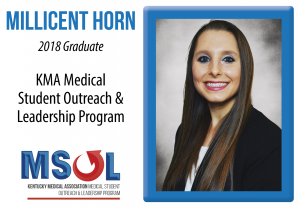 Seeing her aunt fight stage four pancreatic cancer and how her doctors stayed positive throughout her treatment motivated fourth-year University of Kentucky medical student Millicent Horn to pursue medicine.
Seeing her aunt fight stage four pancreatic cancer and how her doctors stayed positive throughout her treatment motivated fourth-year University of Kentucky medical student Millicent Horn to pursue medicine.
“I watched one of the greatest people I knew slowly become encompassed by disease that no amount of chemicals or radiation could really cure,” Horn said about her aunt, Linda Denham.
“Even though her doctor knew her prognosis and the type of cancer she had, he stayed very positive and said, ‘This is the next step’. It helped her get through it. Seeing a physician who knew how malicious her disease was and still remain positive—I think that helped give her hope. That ignited my passion toward oncology.”
Horn, a Louisville native, graduated from duPont Manual High School where she was in the Math Science Technology Program. She attended Centre College where she graduated with a degree in biochemistry and molecular biology.
“I went into college knowing I wanted to do some sort of science, but I wasn’t sure if I wanted to pursue the clinical aspect of science or pursue a more research-oriented career,” Horn said.
Her mentors at Centre encouraged her to apply to summer clinical research programs. She spent the summer following her sophomore year at Vanderbilt doing research in pediatric oncology. The following summer, she did pediatric oncology research in neuroblastoma at Children’s Hospital of Philadelphia. “That was extremely exciting and made my decision very easy to pursue medicine and work towards a career in oncology,” Horn said.
Horn recently started a combined internal medicine acting internship in the pediatric ward of Kentucky Children’s Hospital in Lexington.
This is where she served as the medical student representative for AdvoCats, a resident-run child advocacy group comprised of UK medical students and residents whose goal is to improve child health and wellbeing.
This experience fulfilled the volunteer requirement of KMA’s Medical Student Outreach and Leadership Program, which she completed last year. Through AdvoCats, Horn fought for exercise programs in schools, conducted a warm clothing drive and provided holiday meals for families spending Christmas in the hospital.
Volunteerism is important to her. She also serves as a medical student tutor, is a curriculum committee representative at UK and is the current president of the medical student UK oncology interest group.
During medical school, Horn has worked with several mentors at the Markey Cancer Center in Lexington—Dr. Lowell Anthony and Dr. Aman Chauhan—researching neuroendocrine tumors. She also recently attended the American College of Physicians Internal Medicine National Conference where she won the medical student poster competition. This June, she attended the American Society of Clinical Oncology National Oncology Annual Meeting, where she gave an oral presentation.
“Going into a field like oncology, you can’t always cure everyone but even when we don’t have all the answers, our time and presence and giving back to others serves as a form of treatment,” Horn said.
“You never know how far one small act of kindness can go.”
Seeing the struggles her aunt went through made Horn dedicate her life to helping others. “For me, it’s the words like terminal that give me the drive and passion to make a difference,” she said. “It doesn’t always have to be through treatment. You can make a huge difference by spending time with people and listening to their story.”
Unfortunately, her aunt passed away during her first year of medical school.
“One of the greatest moments of my life was seeing her at my white coat ceremony,” Horn said about her aunt. “That encompassed everything I’d worked towards and she got to witness that.”
Ben Doty Loves Science and Helping Others
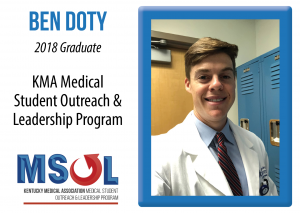 Ben Doty discovered early in life his love of science and helping those in need. With the encouragement of several people, he combined his passions and decided to pursue a career in medicine.
Ben Doty discovered early in life his love of science and helping those in need. With the encouragement of several people, he combined his passions and decided to pursue a career in medicine.
His mom, Lynn, was a special education teacher in Suwanee, Ga., his hometown. Doty said because of his mom, he got to spend a lot of time around children with special needs.
His love of science was sparked by his ninth-grade biology teacher, Matt Johnson, at North Gwinnett High School.
“I combined my interest of sciences and biology with the caring and looking after people who couldn’t care for themselves,” he said.
He attended the University of Georgia and majored in genetics and biology with a minor in Spanish. Every week during his undergraduate studies, he shadowed Melissa Martin, M.D., an internal medicine and pediatric specialist at Piedmont Healthcare in Athens, Ga., “She was also very influential in my career path,” Doty said.
“Ben easily fit into our busy primary care office when he began shadowing me as a pre-med student,” said Dr. Martin. “He has an air of confidence and yet a willingness to learn. He was funny and kind to the patients and showed a genuine curiosity about their problems and how to solve them. He will make an excellent physician!”
Currently a third-year medical school student at the University of Kentucky, Doty recently started his rotations. “I’m interested in emergency medicine,” Doty said. “I’ve had some really good mentors at UK who are in emergency medicine and my girlfriend, Haedan, is in emergency medicine.”
He met Haedan while working at Emory Genetics Lab in Atlanta after college. He was already working there when she applied for a position. “For whatever reason, the powers that be made me interview her,” he said with a smile.
Doty is a 2018 graduate of KMA’s Medical Student Outreach and Leadership Program (MSOL). He says the program was a great way to surround himself with similar thinking people who are advocates for the people they serve.
“I thought it was a really good avenue to continue to do what I was doing beforehand,” he said of the community service aspect of the program. “To be educated on the needs of the people of the Commonwealth was important as well.”
During his undergraduate education, he’s helped tutor children in foster care in Athens-Clark County. “Hopefully I ingrained in them the importance of staying in school and how important an education is to their future,” he said of this experience.
For the MSOL community service requirement, he participated in a program called “Health Yeah,” a student-run club at West Virginia School of Osteopathic Medicine that emphasizes nutrition in medicine. “It’s an opportunity to educate the community and share a meal,” he said. Plus, he considered it a bonus he got to spend time with Haedan, who is enrolled there.
Volunteering has exposed him to issues near and dear to his heart. “There are a lot of people who need help who can’t do it for themselves,” he said. “They need someone who’s been given a platform, which I think we have been given, who can speak on their behalf and be there for them.”
He and Haedan love to hike, enjoy craft coffee and beer, and go on hikes with their dog Brady, a terrier German shepherd mix. “He’s our whole world,” Doty said. “We bring him pretty much everywhere we go.”
Natasha Fraser Lives a Life of Service to Others
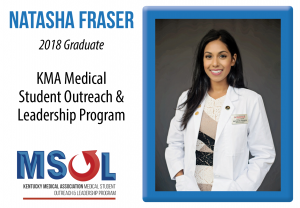 As the daughter of Pakistani immigrants—both physicians—Natasha Fraser feels fortunate to have the opportunities afforded Americans. So much so, she’s been on three medical mission trips to Honduras and two mission trips to Jamaica, where she helped build a school for deaf children.
As the daughter of Pakistani immigrants—both physicians—Natasha Fraser feels fortunate to have the opportunities afforded Americans. So much so, she’s been on three medical mission trips to Honduras and two mission trips to Jamaica, where she helped build a school for deaf children.
“I grew up my entire life with community service being an important part of my life,” Fraser said. “Everyone can play a role in helping the community and making it a better place.”
Her commitment to community service and helping others was instilled in her by her father, Asad, a rheumatologist, and her mother, Ambreen, a family medicine physician. Both practice at Graves Gilbert Clinic in her hometown of Bowling Green.
Currently finishing her third year of medical school at the University of Louisville, she is studying internal medicine and wants to specialize in oncology.
“I always thought internal medicine was the residency path for me,” she said. She knew she found her specialty during her third-year rotation in oncology. “This was the one rotation I found myself seeking opportunities to stay longer.”
Her parents couldn’t be happier. “They just wanted me to find what would make me excited to go to work every day,” she said.
Fraser is a 2018 graduate of KMA’s Medical Student Outreach and Leadership Program (MSOL). Her interest in the program was sparked when KMA representatives gave a talk to UofL medical school students. “It made me realize how important being a physician is—not just on the medical side, but also to advocate for your patients on the political side as well,” she said. “It’s so important for us to be in the know so we can put in our two cents and we can advocate for what’s best.”
For the community service portion of the MSOL program, she volunteered at Smoketown Health Fairs in Louisville where she helped with cholesterol, blood pressure and Body Mass Index screenings. She also helped prepare and distribute educational materials for the Leukemia Lymphoma Society.
In medical school, she’s served as the Women’s Healing Place Clinic director. “We provide a health clinic for any problem – colds, coughs, STD screenings,” she said. “I also organized students to volunteer every week and I saw patients myself. It’s a good way for students to give back to the community and to learn how to see patients.”
When asked how busy medical students can find the time to volunteer, she said, “I’m big on scheduling.”
She enjoys cooking in her spare time. This year, she participated in UofL’s first medical school culinary course called “Eat 2B Well,” taught by local chefs. “They showed us how we can teach our patients to cook healthy,” she said. “It also gave me more ideas in my own life how to cook.”
Father/Daughter Outing Set Natalie Clark on Path to Becoming a Physician
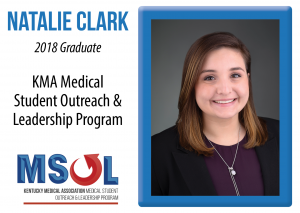 Natalie Clark was just five years old when a day spent with her father determined her future career. They did the typical father/daughter activities like going to a movie and to a fair, but it was what happened later that day that made the biggest impact on her life.
Natalie Clark was just five years old when a day spent with her father determined her future career. They did the typical father/daughter activities like going to a movie and to a fair, but it was what happened later that day that made the biggest impact on her life.
Her father, Robert Clark, an oral surgeon in Lexington, was on call at a local hospital when the phone rang. A man had been in a motorcycle accident and hurt his jaw. Since Robert didn’t have time to drop his daughter off, he took her with him.
When her mother, Evelyn Clark, a prosthodontist, asked her daughter what she did that day, instead of listing the fun activities with her dad, all she wanted to talk about was the hospital visit.
“It was the only focus of my day,” she said. “That’s what I thought was so amazing even though he had taken me to do all these other things.”
Her path to a medical career had begun. After graduating from St. Margaret’s, a boarding school in Virginia, she attended Elon University in North Carolina where she graduated Cum Laude with a degree in Biochemistry and a minor in Neuroscience and Public Health.
Currently in her third year of medical school at the University of Louisville, Clark is often asked why she didn’t go into dentistry like her parents. “I was interested in dentistry and I respect what they do and thought it was pretty amazing,” she said. “I wanted to work in health care, like they do, but I thought I wanted to be a physician. I wasn’t convinced I wanted to just work on the mouth and the face. I wanted to work on the whole body.”
She recently decided to specialize in obstetrics and gynecology. “It was a long decision-making process,” she said. “I knew I really enjoyed the surgical aspects of medicine and I wanted a profession that provided continuity of care. Plus, I think it’s a great profession to advocate for women.”
Clark is a graduate of KMA’s Medical Student Outreach and Leadership Program, designed to promote community involvement and give students an opportunity to learn more about the political, social and economic issues in the health care system.
“I thought it was a great program,” Clark said. The MSOL program offers students an overview of the medical industry, health and the marketplace in Kentucky as well as the basics of health care finance, including Medicare and Medicaid. “The lectures taught me a lot,” she said. “Those are areas in medicine we don’t learn about in depth in the curriculum. They’re really important.”
She said it also gave students an opportunity to be involved in local and statewide legislative process. “It gave us a way to be a part of the community as a whole while we were still working every single day in school,” she said.
For the community service requirement of the MSOL program, she volunteered three times a week for a year at Norton Children Hospital, where she spent time with kids who faced prolonged periods in the hospital for various illnesses, usually cancer. “If it weren’t for the time constraints of a third-year medical school student,” she said, “I would still be participating.”
“A lot of the kids were immunocompromised with cancer,” she added. “They can’t go out in the hallways because they could catch something. I could give them a moment so they can forget why they’re there. It’s also helpful for the parents because when you come in, they can step out of the room for a minute.”
Among her numerous volunteer experiences, a medical mission trip to Tanzania, Africa during her first year of medical school made a big impact not only on the patients who were seen in the clinic, but also on Clark. “This experience taught me about underserved populations, and I came back wanting to serve and be more involved in my local community,” she said.
She holds several leadership positions in medical school, including “College Captain” where she helps answer underclassmen’s questions. “I like representing students and communicating with our faculty members,” she said. “It’s a way for upperclassmen to answer questions and give advice to people in your college.”
Last year, after she finished the first part of her boards, she traveled to Seattle, Wash. and to Vancouver, Canada. “I really love travelling,” she said.
When she has time, she also enjoys visiting her parents in Nicholasville and spending time with her dog Sequoia.
Science and Service Led Bradley Blankenship to Medicine
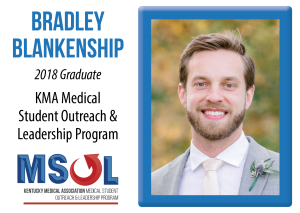 Bradley Blankenship says a combination of science and service is what led him to pursue a medical career.
Bradley Blankenship says a combination of science and service is what led him to pursue a medical career.
“I remember being young and saying that’s what I was going to do,” he said.
Currently a third-year medical school student at the University of Kentucky, Blankenship grew up in Scottsville, Ky. and is the first in his family to study medicine.
“Growing up, I fell in love with science,” he said. “I had some really cool science teachers.”
He credits his fourth-grade teacher’s assistant for sparking his love of science. “She used to be a cave guide in Cave City,” Blankenship recalled. “She had the coolest stories about caves, the history and science behind caves—she made it super interesting.”
He was also involved in Science Olympiad, a premier science competition, in middle and high school.
One of his high school science teachers, Rick Roberts, also made a lasting impact. “He was the kind of teacher who pushed me to do really well in his classes—he was my first genetics teacher—and he also made sure I would be successful in college,” Blankenship said. “He even drove a few of us all over the south east once to tour colleges. He was easily one of the best teachers I’ve ever had to this day.”
Blankenship’s career path was further shaped by his desire to serve others, a quality modeled by his parents. His dad, Chris, is a volunteer firefighter and his mom, Ruthane, is a teacher’s assistant for special needs children.
Throughout high school Blankenship worked as a farm hand on his father and grandfather’s farms, with responsibilities for irrigation, harvest, and delivery of Bermuda Hay crop to customers, farm maintenance tasks and bagging grain and feeding cattle. He said this experience taught him a good manual labor ethic. “I would still help now if I was at home,” he said.
He graduated with a Bachelor of Science in agricultural biotechnology from the University of Kentucky in December 2015. “I was super interested in genetics in undergrad,” he said. “The ag-bio tech major at UK allowed me to take a lot of genetics courses. It had research built into the major requirements for the degree.”
During his undergraduate education he conducted research in genetics and lung cancer.
“Genetics is going to play a huge roll in the future of medicine—in precision medicine and targeting therapies based on their genetic profiles,” he said. “We have targeted immunotherapies now, especially for cancer treatment.”
Before entering medical school at UK, he took a semester off and was a research intern at Alltech.
“When I first started medical school, I was pretty sure I wanted to go into oncology,” he said. “That was one of the huge reasons I was interested in genetics. That could still be something I do if I choose internal medicine.”
But he’s leaning more toward emergency medicine as a specialty. “I like to be there when people really need me,” he said, especially since, “The ER is the worst day in some people’s lives.”
He decided to participate in KMA’s Medical Student Outreach and Leadership Program (MSOL) after participating in KMA’s Physicians’ Day at the Capitol last year. He said he enjoyed being with a community of physicians and learning about the different roles of the Lexington Medical Society, KMA and the American Medical Association.
“(The MSOL program) is a good way for students to get involved,” he said.
To fulfill the community service requirement of MSOL, Blankenship and other students from his Emergency Medical Interest Group at UK worked with Urban Impact to set up a community outreach program for troubled high school kids in Lexington. They taught them how to spot a drug overdose, what to do if they see it and how to conduct CPR.
Blankenship was also a tutor and mentor to students at The Learning Center at Linlee, a magnet school in Lexington that educates 7th- to 12th-graders who have not succeeded elsewhere because of truancy, disciplinary problems or personal problems. He also served as a medical volunteer during a mission trip to Honduras.
But two volunteer experiences that really stood out for him were his roles at the Markey Cancer Center and Southland Christian Church in Lexington.
As a weekly volunteer hospitality host at the Markey Cancer Center Chemotherapy Infusion Center for seven months during his undergraduate studies he said, “I made sure they (patients) were comfortable – gave them pillows or a warm blanket, or if they wanted something to drink or snacks – that was me. It was nice to see everyone interacting with the patients so lovingly.”
He also served as a volunteer escort at the “Jesus Prom” at Southland Christian Church, which was held for the special needs community. “It (the prom) made their year for a lot of them,” he said. “Working with them was really fun.”
When he’s not studying or serving, he enjoys walking, hiking, taking long drives and spending time with his family.
Nursing Degree Led Ashlee Margheim to Learn More and Become a Physician
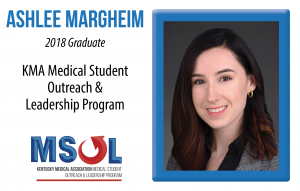 Ashlee Margheim loves to hike, especially in Glacier National Park. “I’ve been very fortunate to go every summer,” she said. She realizes this yearly pilgrimage may have to change, however, now that she’s a third-year medical school student at the University of Louisville.
Ashlee Margheim loves to hike, especially in Glacier National Park. “I’ve been very fortunate to go every summer,” she said. She realizes this yearly pilgrimage may have to change, however, now that she’s a third-year medical school student at the University of Louisville.
Originally from Fairbanks, Ala., Margheim and her family moved to Louisville when she was 11 years old. “Alaska was a winter wonderland with moose and caribou playing in our backyard in the snow,” she remembers.
After graduating from Ballard High School, she attended the University of Washington in Seattle for one year, where she studied nursing. She decided to return to Louisville to be near her family and finish her degree at Bellarmine University. “I’m an only child, so being close to my parents is extremely important to me,” she said.
Her desire to know more about medicine led to her decision to become a physician. Her favorite class in nursing school was pathophysiology, but it never really went into as much depth and detail as she preferred. Another turning point occurred while she was doing a pediatrics nursing rotation at Kosair (now Norton Children’s) and overheard residents and attendings having a conversation.
“This particular conversation was about a procedure for patients suffering from gastroesophageal reflux disease,” she said. “I thought, ‘there’s still so much I don’t know, and I don’t think I’m really ever going to be fully satisfied until I go to medical school.’”
She heard about UofL’s Post-Baccalaureate Pre-Med Program, a program designed for career changers who want a shot at medical school and decided to apply. She was accepted and started taking prerequisite courses for medical school. During this time, she worked as a cardiac telemetry nurse at Baptist Health Louisville.
“It was the busiest and most stressful time of my life,” she said.
She’s currently undecided, but knows she wants to specialize in an area of medicine, and is considering dermatology and internal medicine.
“I’d like to do something that allows me to see immediate results in my patients because my biggest flaw is probably how impatient I am, and I like instant gratification,” she says with a laugh. “But I like to make people feel better.”
Margheim participated in KMA’s Medical Student Outreach and Leadership Program (MSOL) during her second year of medical school. “I think it’s really easy, particularly in the first two years of medical school because you’re studying 24/7, to become immune to the outside world including what’s going on in health care from a social and economic standpoint,” she said. “The reason this program was really appealing to me is, it helps students stay engaged, particularly from an advocacy standpoint, which is something I care deeply about.”
She served as UofL’s KMA student advocacy and legislation chair from 2016-2017 where she represented students from the class of 2020 at KMA advocacy meetings. “I organized the student trip to the Kentucky state capitol for KMA’s Physicians’ Day at the Capitol,” she said. “This gave the students an opportunity to speak with local legislators and even the Governor’s spokesperson. I learned more about the MSOL program through those advocacy meetings. I decided I might as well go ahead and complete the program because I was already on my way to completing those requirements.”
To complete the MSOL community service requirement, Margheim volunteered for the Leukemia and Lymphoma Society where she updated a support group directory for patients in Louisville and Lexington. “When they get the diagnosis of cancer, they obviously need someone to talk to,” she said.
During her second year of medical school, she served as a student clinic director for Family Community Clinic (FCC), an organization that offers free health care to meet the needs of the uninsured in Jefferson and surrounding counties. KMA’s Kentucky Foundation for Medical Care awarded FCC a Community Connector grant in 2017 to provide point of care laboratory tests.
“I was the leader and director for our group of students that went there to get clinical experience,” she said. “The first years of medical school are so academic, book oriented, that’s pretty much our only chance to get into the real world, into clinics, to see patients and to start interacting with them in a meaningful way.”
Her Spanish minor in college helped her communicate with the patients in the clinic, who primarily speak Spanish. “That was an awesome experience,” she said. “I’d volunteered there before medical school as a nurse when I had my nursing license. When I heard there was a position available to be a student clinic director, I jumped on it because that place is awesome, the people are so nice, and the patients are incredible.”
In addition to hiking, Margheim also enjoys traveling, reading, seeing a good film and trying out new restaurants in town.
Mason Johnson Values Mentorship and Seeks to Give Back to His Community
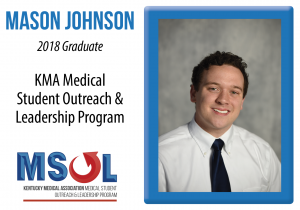 Mason Johnson’s biggest mentor is his brother Ryan. “I’ve always looked up to him,” Johnson said. “He’s like a second parent to me.”
Mason Johnson’s biggest mentor is his brother Ryan. “I’ve always looked up to him,” Johnson said. “He’s like a second parent to me.”
Johnson grew up in Pikeville and attended undergraduate school at the University of Kentucky where he earned a bachelor’s degree in biology. Mason is a first-generation college graduate and the first in his family to become a doctor. He’s currently a second-year medical school student at UK.
“I’m proud of him, not only for what he’s accomplished so far, but for just being an all-around good person,” Johnson’s brother said.
His mom, Diana, is a hairdresser and his dad, Justin, is a retired coal miner. “They’re some of my biggest supporters,” Johnson said.
Johnson knew he wanted to become a physician after participating in the University of Pikeville’s Professional Education Preparation Program (PEPP) during the summer before his senior year of high school at Shelby Valley High School.
According to the program’s website, “The program seeks to address the critical shortage of physicians and dentists in rural and under-served communities of Kentucky by supporting students who hope to return to their home county or a similar geographic area to practice
medicine or dentistry.” He enjoyed it so much that he participated in the program two more times—UofL’s PEPP program before his freshman year of college and UK’s during the summer before his junior year of college.
“I realized the level of health care disparities in my hometown and the shortage of doctors and health care workers, and I use this as a motivation when things get tough (in medical school),” he said.
Johnson is a recent graduate of KMA’s Medical Student Outreach and Leadership Program (MSOL). For the program’s community service requirement, he volunteered in the Salvation Army Clinic, interviewing patients. “It’s important to give back to your community,” Johnson said.
He said the MSOL program helped him realize he doesn’t have to wait to become a doctor to be a health care advocate. The last two years, he’s served as a medical student government ambassador for his class.
As an undergraduate, he participated in UK’s chapter of the College Mentors for Kids after-school program all four years of college. “I had mentors help me growing up and to potentially be that person for one of those kids is nice,” Johnson said.
Johnson is engaged to Katie Thacker, also from Pike County. Both graduates of Shelby Valley High School and UK, the couple entered and recently won a wedding sweepstakes hosted by WTVQ, a television station in Lexington. The giveaway covers $30,000 in wedding costs that will go toward their wedding in March. “It was a big relief (to win),” Johnson said. “It will make it so much easier.”
In his spare time Johnson likes to spend time with his new puppy and attend UK basketball and football games with Katie. “And wedding planning,” he added.
Faihza Hill Seeks to Serve the Underserved, Be Involved in her Community and Impact Families
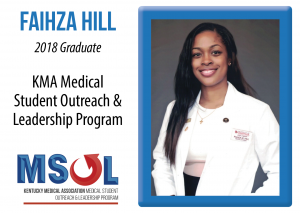 Faihza Hill has a lot of grit and determination.
Faihza Hill has a lot of grit and determination.
Hill was faced with a major obstacle in high school when she tore her ACL playing basketball, a sport she’s played since she was 9 years old. “When I initially got hurt, it was very devastating for me,” she said. “It felt like a piece of who I was, was being taken away prematurely. I was very determined to try to get back to my baseline.”
After undergoing three surgeries, she wanted to prove to herself that she was still capable of succeeding. “Unfortunately, my surgeries weren’t as seamless as most,” she said. “My body underwent a lot more damage than anticipated. It made it harder. But I still wanted to prove to myself that I was capable of doing it. I trained, and I pushed through. There were a lot of nights in the gym when I was by myself and I was trying to train my body to run again. It took a lot of grit.”
She attended the University of Arizona and played on their women’s basketball team even though she did not receive an athletic scholarship.
“I come from a long line of outstanding athletes,” Hill said. “My mother played basketball for Berkley and my father played football at Purdue. I have uncles and cousins that played football in college as well.”
She said this experience taught her to be kinder to herself and listen to her body. “It reminded me that I’m human,” she said.
Hill is now a third-year medical school student at the University of Louisville and is the first person in her family to become a physician. She is completing a Distinction in Medical Education degree and holds a Master of Science in Physiological Sciences and a Master of Public Health with a concentration in Policy Management both earned from the University of Arizona.
“My goal is to become an outstanding physician who is great at the medical sciences, who is involved in community outreach, who advocates for my patients, who is able to be involved in medical education and understand that policies are what create opportunities,” Hill said.
This desire to serve others was instilled in her by her mother, Mazetta, and father, David, who worked with the San Francisco, Calif., city and county government for over 35 years helping underserved youth in the community. “They provided a positive outlook for those kids who grew up in the inner city and acted as role models and mentors for many generations,” Hill said about her parents.
Hill was influenced not only by her parents to become a physician, but also by her cousin Deja, who was born premature and was diagnosed with cerebral palsy, hydrocephalus and severe asthma.
“Despite the statistical odds, they (the doctors) were still going to try everything they could,” Hill said. “It was through a lot of prayer and it was through medicine that my cousin was able to survive. I was really touched with how they interacted with us.”
“I felt like I wanted to be able to provide that same type of care and comfort for other families,” Hill said. “Watching the impact my parents had on the community, I wanted to figure out a way to intertwine both of those worlds.”
Hill comes from a close-knit family and says she can’t name just one person who’s had the greatest influence in her life. “Everyone has embedded a piece of themselves in me and they’ve all placed such love and support behind me, I feel like I’m walking in their footsteps,” she said.
She lives by the principle her great grandfather James Reece taught her dad, who passed it on to her— “Wisdom is the principal thing; therefore, get wisdom: and with all thy getting get understanding” (Proverbs 4:7).
“Regardless of what I’m doing or what obstacles I come up against, I try to live by that principle,” Hill said.
Before she moved to Kentucky, Hill succeeded in accomplishing one of her goals—to impact her community. She completed a community needs assessment for minority women in Pima County, Calif. on breast health and barriers to care and submitted this to Susan B. Komen, who used it to help meet their needs and fill the gaps in care. “I’m really proud of this work that gave these women more access to resources and education,” she said.
Why MSOL?
She participated in KMA’s Medical Student Outreach and Leadership (MSOL) Program to give her an opportunity to learn more about Kentucky and to learn more about the policies that are in place in Kentucky and how the medical association is active here in the community.
“This was a great opportunity for me because it integrated and promoted community health and involvement, but it also has an advocacy component and provided us with some leadership skills that we can take with us in whatever profession we decide to go into,” Hill said.
For the MSOL community outreach requirement, Hill participated in UofL’s School of Medicine “Snuggle Squad” at Norton Children’s Hospital where she spent time with at risk babies who weren’t getting a lot of human interaction other than what was provided by the staff. “It was therapeutic for them, but it was also therapeutic for me because medical school is tough,” Hill said. “We spend hours in the library trying to learn and we don’t have very much interaction with patients. It gave me more drive to fight through the hard days.”
While she was at Norton, she got a chance to speak with social workers where she learned more about how the foster care system works with the healthcare system. “Learning how that whole process works is very helpful for all of us to be mindful of for our patients in the future,” she said.
Even though her family is “a million miles away,” Hill says she enjoys spending time with her family when she’s not in the classroom. Sometimes they visit her when she’s on break. “We explore the country and drive around to different states that we haven’t been to and we absorb the nature. It’s so beautiful over here.”
Kristin Schutzman Inspired by Grandmother to Become a Physician
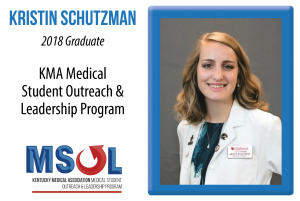 Kristin Schutzman has known since childhood she wanted to be involved in medicine. Her maternal grandmother and retired nurse, Jean Corron, inspired her to pursue her dream.
Kristin Schutzman has known since childhood she wanted to be involved in medicine. Her maternal grandmother and retired nurse, Jean Corron, inspired her to pursue her dream.
“I’ve always really looked up to her and got that drive to do something in the medical field from her,” Schutzman said. “She’s always been a very giving, loving person. I know that carried over to her work as a nurse. I’ve always tried to emulate that aspect of her. She’s such a good person — a total saint.”
Her grandmother worked well past retirement age but decided to retire about two years ago to take care of her husband who has since passed away.
“She would tell me about medicine and her love for her career, Schutzman said. “Seeing how much passion and love she had for caring for patients really influenced me.”
The oldest of four siblings, Schutzman grew up in Alexandria in Northern Kentucky and is the first person in her family to become a doctor. She graduated from Bishop Brossart High School where she discovered her love of learning and started to realize she wanted to go to medical school. “That was confirmed throughout college and during the application process for medical school,” she said.
After graduating from Thomas More College with a major in biology and double minor in chemistry and Spanish, she was accepted into the University of Louisville medical school.
Currently a second year medical school student, Schutzman is interested in becoming a pediatrician. However, she was initially interested in cardiology. “There are a lot of heart problems in my family,” she said. After starting medical school, she’s had some experience working with kids, which helped solidify her interest in pediatrics.
Last summer she did a pediatric internship at UofL where she got to spend four weeks shadowing a doctor and see patients on her own. She got to present patients to physicians, “which was a really cool experience,” she said.
Schutzman is a 2018 graduate of KMA’s Medical Student Outreach and Leadership (MSOL) Program. She said the program exposed her to some of the aspects of the medical field that she doesn’t get to see in the classroom such as the business of medicine and the legal system— “things that really impact how we can practice medicine,” she said.
“Since I’m interested in pediatrics, advocacy for patients is a really huge component. Obviously, kids can’t really advocate for themselves. I wanted a better idea of things I could do in the future as a physician and start doing them now.”
For the community outreach portion of the program, she volunteered with Norton Children’s Hospital as a part of the Students Making Illness a Little Easier (SMILE) program, where she played with children to help them forget about being sick.
“It was a very rewarding experience as I hope to be a pediatrician,” she said. “I enjoyed spending time with these children to get a better idea of what they go through as patients and helping to make that process easier on them.”
She’s also helped rebuild houses for families in need through Housing Opportunities of Northern Kentucky (HONK), and she’s worked with Family Promise, an organization through her church that helps keep homeless families together. She helped set up the space where they stayed, served meals and provided entertainment for the children.
During medical school she became part of a new group called the Louisville Diaper Campaign to help raise awareness of the diaper gap in Louisville. “A lot of low income families struggle with this,” she said. “Government assistance programs don’t help cover the cost of diapers. Families have to deal with, do I turn the heat or do I pay for diapers? It’s a really big issue that most people don’t know about unless it personally affects them.”
In her spare time, she and her husband Craig, a third year medical student at UofL, like to check out the food scene in Louisville, visit family and friends in Northern Kentucky and see superhero movies—especially the Marvel movies—the day they come out.
Craig is interested in possibly specializing in Emergency Medicine, combined medicine pediatrics or family medicine.
They have thought about potentially working together someday. His sister is a nurse practitioner. “We’ve thrown around the idea of opening up a family practice someday,” she said.
“We’ll see where life takes us.”
Her Love of Learning and Helping Others Drives Future Physician Hannah Graff
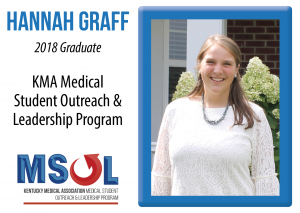 Hannah Graff has known since kindergarten she wanted to become a doctor.
Hannah Graff has known since kindergarten she wanted to become a doctor.
It was around this time she had to get stiches. “I remember watching them put the stitches in and basically sew my leg,” she said. “It made me want to be able to fix things.”
Her interest in medicine was fueled during high school. “I remember being fascinated by how the body works and how things can go wrong but they can be fixed.” She dissected a frog in high school, and called it, “the coolest thing in the whole world.”
She grew up in Northern Kentucky and was homeschooled off and on during this time. “My parents left it up to us,” she said about where she and her three brothers wanted to attend school.
She had the opportunity during her last two years of high school to attend the Gatton Academy of Mathematics and Science located on Western Kentucky University’s campus. “It’s one of the best decisions I’ve ever made,” she said. “It challenged me to go further and to fall in love with learning that much more.”
Graff will become the first physician in her family when she completes her medical training at The University of Kentucky. She’s currently a second year medical school student and is interested in pediatrics.
She received her undergraduate degree in biology at UK with minors in math and German. She’s currently a member of the United States Army in the Health Professions Scholarship Program. This program offers prospective military physicians a paid medical education in exchange for service as a commissioned medical department officer. She dreams of being stationed in Germany someday.
One of the reasons she decided to participate in KMA’s Medical Student Outreach and Leadership Program (MSOL) was because of her desire to learn more about health issues facing Kentuckians and how to advocate for her future pediatric patients. “You have to advocate for things to change,” she said. “And my patients won’t be able to advocate for themselves.”
Her mother, Carole, reinforced in Graff her belief that it’s important to know what’s going on around you so you can know what the actual issues are and determine where you can make a difference. “My mom always said, ‘It’s great to give help, but you need to give help for where it’s needed, not just where you think it’s important.’”
For Graff’s community service portion of the MSOL requirement, she helped plan an event at Mary Todd Elementary School in Lexington to help educate students about the importance of sleep. “We had a researcher come in and talk about what sleep does, how it affects you and why it’s so important,” she said. “We had activities for the kids like, ‘When should my bedtime be vs. what is my bedtime.’”
She’s had an interest in the value of sleep since high school where she wrote a research project on why schools should consider changing the time they start based on a teenager’s circadian rhythms.
In her spare time, she enjoys visiting The Arboretum, the botanical garden located on UK’s campus. She also enjoys dancing and spending time as a volunteer with the children’s ministry at her church.
But the majority of her time outside of class is dedicated to her upcoming wedding this month to her fiancé, Josh Fugate, a sales engineer in Georgetown.
Charles Shofner Motivated by Grandmother’s Health Problems to Become Physician
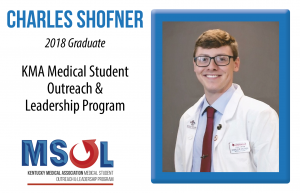 Growing up, Charles Shofner spent a lot of time at Jewish Hospital vising his grandmother who had heart problems and multiple surgeries. Her health started to decline when he was in middle school.
Growing up, Charles Shofner spent a lot of time at Jewish Hospital vising his grandmother who had heart problems and multiple surgeries. Her health started to decline when he was in middle school.
“That’s really when I became captivated by medicine and the power that it has to bring second chances and bring people together,” he said. “I knew I wanted to be a part of the medical world, but I didn’t know until my last year of high school that I wanted to be a physician. I wanted to take on more responsibility of the patient care. I wanted to have more of a say rather than following other people’s recommendations.”
A first generation college student, Shofner is currently a second year medical school student at the University of Louisville. He grew up in Central Kentucky and attended Marion County High School.
He said for a long time he didn’t know he wanted to be a doctor but knew he wanted to make a difference in people’s lives. Maybe that’s why when he told his family he wanted to become a doctor they asked, “Are you sure?” And he said, “Yes, I’m positive.”
“My family is super proud,” he said. They’ve started asking him about their medical aliments and joked, “I feel like I get a text message from my mother on a daily basis,” he said. “The message might be, ‘I think I hurt my toe. Should I be worried? Should I see a doctor’? I don’t know how to answer that yet. Holidays are definitely not the same anymore.”
He graduated from the University of Louisville in 2017 with an undergraduate degree in biology and psychology. “I’m a Cardinal through and through,” he said.
He knows his psychology degree will come in handy as a physician. “I think being a psychology major at UofL as an undergrad taught me to appreciate the mental health side of things and that medicine is not solely founded on the basis of science, but there’s some art and compassion behind it too,” he said.
Shofner is a 2018 graduate of KMA’s Medical Student Outreach and Leadership Program. Through this program he learned, “It’s never too early to start advocating in the medical field,” he said. “As physicians, we have to advocate for our patients every day. As a medical student, one of the ways you can start advocating for your patients is to find topics you’re passionate about and advocate for them either in the Kentucky legislature or by giving back to your community.”
Advocacy and community service are important to Shofner. During his undergraduate education he served as director for UofL’s Relay for Life. He also spent time in Frankfort during his senior year lobbying for cancer support bills. When he started medical school and saw that it was still possible to be involved and advocate but now on the medical side of things, he said, “I was super pumped and knew I had to get involved in a program like this (MSOL). It does a good job of teaching you sides of medicine that we aren’t necessarily taught in medical school. Things like finance, advocacy and even the politics of medicine,” he said. “But I think that’s the real world of medicine. Medical students should take the time to learn about that because it’s basically there for the rest of our lives.”
For the MSOL service outreach component, he was camp director for Camp Cardiac, a week long camp at UofL’s Medical School for Louisville high school students interested in pursuing medicine.
“As director I was tasked with planning and directing the entire week,” he said. “The camp lasted from eight to five every day. I have a lot of respect for teachers. Lesson planning is not easy.” He said during the week, they dissected pig hearts, live streamed into a cardiac surgery at Jewish, practiced some suturing skills and were able to speak with doctors and nurses and researchers.
“Because of my grandmother and all of her heart problems, cardiology has always been something that I have been passionate about,” he said.
When he’s not studying, he’s a huge movie goer and loves blockbusters and the classics. “But global health is probably my largest passion,” he said. Last summer he was one of the co-trip leads for the Medical School service trip to Ecuador. Sixteen of his fellow students spent two weeks in the Amazon providing medical care to over 700 Ecuadorians.
Traveling is something he’s always planning. “When I get back from one trip, it’s where am I going next?”
He is also a foodie. “The food scene in Louisville is fantastic,” he said. “I’m always trying to find the next great hidden restaurant.”
Future Physician Leader Taylor Moody Kai Follows in Her Grandfather’s Footsteps
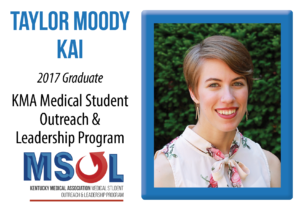 Taylor Moody Kai’s grandfather, Paul E. Moody Jr, M.D., was a pediatrician for more than 50 years. Before he passed away, when he learned she was going into medical school, “he was pretty excited about it,” Kai said.
Taylor Moody Kai’s grandfather, Paul E. Moody Jr, M.D., was a pediatrician for more than 50 years. Before he passed away, when he learned she was going into medical school, “he was pretty excited about it,” Kai said.
Kai, a third year medical school student at the University of Kentucky, is interested in specializing in Combined Internal Medicine & Pediatrics. “He would be pretty happy that I’m loving peds so far during my first rotation,” she said. “He was always convinced I’d be a pediatrician one day.”
“I love kids and I love pediatrics but I know that’s not what I want my full practice to be,” she said. She’s interested in being double board certified in internal medicine and peds. “I think it’s the best of both worlds,” she added. “With med peds, you get a lot more training with children. I want that to be half of my practice. I think I would like to work in a primary care setting. If I’d like to specialize further, I could.”
Kai’s interest in medicine was sparked after she took an honors anatomy and physiology class her senior year of high school at Corbin Independent. “I really loved the science and I’ve always loved working with people,” she said. “I thought that medicine would be something for me to consider.”
However, she also loved fashion and initially majored in Communications during her undergraduate studies at UK, thinking she’d work at a magazine. But when she did some shadowing and volunteering in the medical arena, she realized medicine was her passion and “never looked back,” she said.
Kai is married to Marc Kai, also a third year medical school student at UK. They met during the first week of medical school orientation. “I just knew in a couple of weeks,” she said about her future husband. They were married in December 2017.
She enjoys being married to someone who understands her schedule and what it’s like being in medical school. “It’s a cool experience because we completely understand the stressors and the ups and downs of being in medical school,” she said. “We have the same breaks, which is really nice, and we’re on a similar rotation schedule. It’s been nice during our first board exam period not feeling guilty that you don’t have time to spend with your significant other.”
Kai says people find her to be quiet but very emphatic and hard working. “I think I’m a very positive person also,” she said. “I’m always looking for the bright side of things.”
A graduate of KMA’s Medical Student Outreach and Leadership Program (MSOL), Kai said she really enjoyed the Lunch and Learn presentations which touched on KMA advocacy efforts, public health issues, medical business administrative and compliance burdens, an overview of health care in Kentucky and the basics of health care finance. “These (topics) are really important for physicians to understand, even if I don’t end up doing anything political,” she said. “It’s good to know how it all works and how it affects our practice.”
Kai is no stranger to community service, a component of the MSOL program. During her undergraduate career at UK she worked with the incoming freshman class, participated in welcome weeks and trained student leaders. She also served as a teaching assistant in genetics labs and in organic chemistry and worked one summer with the GEAR UP Kentucky program as a student development advisor.
“I’m always looking at ways to further develop my leadership skills and expand my horizons,” she said.
Last year Kai served as one of the co-coordinators for the pediatric clinic at the Salvation Army Clinic in Lexington. She made sure the clinic ran smoothly, had the needed supplies and helped get the word out. She also volunteered as an interviewer for the patients.
She currently volunteers as a mentor with local pediatric patients who have a high Body Mass Index (BMI). “We basically run or walk with them and coach them about living a healthy life, being active,” she said. We’ll talk about their school and life and whatever stress they may be under. In the coming year, I’ll be leading the activities we do before the run.”
In her spare time, Kai likes to knit, bake and read. She and her husband are also active in many fitness activities.
“We like to go on group bike rides with the Bluegrass Cycling Club,” she said. “We go running with John’s Run/Walk Shop in Chevy Chase. We really want to be active especially since we want to be physicians. We think it’s important to live the healthy lifestyle we recommend to our patients.”
Kandice Roberts is Passionate about Public and Global Health
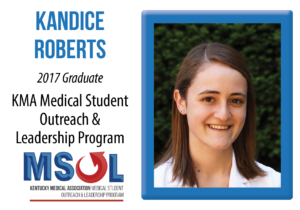 Kandice Roberts knew when she was in grade school that she would go into medicine. As the first person in her family on both sides to attend medical school, she was inspired by her brother Jared, who very shortly after birth, started getting sick.
Kandice Roberts knew when she was in grade school that she would go into medicine. As the first person in her family on both sides to attend medical school, she was inspired by her brother Jared, who very shortly after birth, started getting sick.
“He had pneumonia I think nine times by the age of four,” she said. “Later we found out he had common variable immune deficiency.”
She remembers having a conversation with her dad when she was about 10 years old, before her brother had been diagnosed. Her dad told her if she worked hard enough she could do anything she wanted with her life. “He just casually mentioned I could even become a doctor and help people like Jared,” she said. “Right then, it was like a switch flipped inside of me and I knew that’s how I wanted to spend the rest of my life.”
That decision has been the guiding factor that has already helped make a difference in many lives, including her brother’s. “My sister and I are close,” Jared said. “She’s always been my role model and she gives me good advice. She’s setting the bar pretty high.”
“She’s willing to outwork anyone. If she sets her mind to something she’s going to do it,” he added.
Roberts says her drive and determination are “all for the sake of my future patients and the people I’m able to serve now.”
She grew up in Louisville and graduated from Sacred Heart Academy. Roberts then attended the University of Louisville, majoring in biology with a minor in Spanish and Global Public Health. During her undergraduate studies, she participated in a medical Spanish program one summer at the Universidad Veritas in San Jose, Costa Rica, where she learned about their health care system. Her favorite class, Conflict Resolution in Health, got her interested in global health and broadened her view after learning about barriers to providing health care, how people around the world deal with conflict and how people’s health can be influenced.
Currently entering her third year of medical school at the University of Kentucky, Roberts is hoping to be proficient enough in Spanish to communicate with the Spanish speaking population in the United States as well as abroad. “I knew that it would be a valuable skill going into medicine,” she said. “I really want to go to underserved areas in Spanish speaking countries.”
She’s well on her way. She’s already served as a medical clinic Spanish interpreter for Kentucky Racing Health Services Center for backside workers at Churchill Downs. “I miss doing that,” she said. Even though she wasn’t confident in her Spanish, she was determined to do her best. “They really appreciated my help,” she said.
Her interest in global health was also sparked by a book she read in high school called “Mountains Beyond Mountains” by Dr. Paul Farmer. He started Partners in Health, a nonprofit organization based in Boston that has opened free clinics all around the world targeting the most in-need populations. Roberts started a student chapter of their grassroots network, Partners in Health Engage, at UofL. “I’d like to work with them in the future as a physician if the opportunity arises,” she said.
“I have a strong interest in public health as well,” she said. A graduate of KMA’s Medical Student Outreach and Leadership Program (MSOL), Roberts said the program was “a good way to learn more about how I can make an impact through policy as well as serving as a physician.”
“There’s only so much you can really do in that physician role to make real global change,” she said. “A lot of that comes from policy. I want to learn how that works and how I can get involved in policy as a physician.”
One of her favorite things about the MSOL Program was participating in KMA’s Physicians’ Day at the Capitol. “I met a lot of really great physicians who’ve had a big impact in policy,” she said. “It was really inspiring and I may consider that in the future.”
She said the MSOL Program gives students the opportunity to learn about things that are important that they wouldn’t necessarily learn in medical school because there’s not enough time.
One of the requirements of the MSOL program is community service. Robert’s community service experience is extensive. One experience that stands out is her participation as a Big Sister in the Big Brothers and Big Sisters program. She got to know Chelsey, her little sister, very well. “I got to know all her siblings and her mother,” she said. “I really felt like I became a part of her life. I still talk to my little sister today even though we’re not matched.”
“Chelsey’s grades improved, her behavior got better as well as her attitude towards a lot of things,” said Teina Self, Chelsey’s mom. “Kandice was sweet to everyone and Chelsey misses her.”
She had to stop participating in Big Brothers Big Sisters when she entered medical school.
But volunteering and community service are important to Roberts. “It’s something I want to keep up with throughout my career,” she said.
She volunteers at the Salvation Army Clinic in Lexington where she interviews adult patients and has served as the public relations and recruitment officer.
She’s considering specializing in combined internal medicine and pediatrics but is keeping an open mind going into rotations. “I would like to be able to serve both children and adults,” she said.
In her rare moments of spare time she enjoys playing musical instruments and has taken guitar, piano and drum lessons. She also taught herself to play the ukulele. “I’ve always loved music,” she said. She participated in choir in high school and during part of her undergraduate studies. “It’s nice to be able to keep up with it and it definitely provides some stress relief.”
Fun-Loving, Caring and Hardworking Describe Future Physician Alex Emerson
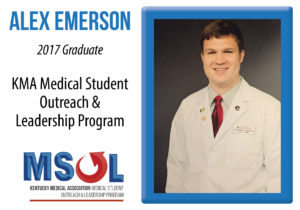 Alex Emerson knew early in life that taking care of patients would be part of his future. “I’ve always been drawn to helping people,” he said.
Alex Emerson knew early in life that taking care of patients would be part of his future. “I’ve always been drawn to helping people,” he said.
He hopes the first thing people say when asked to describe him is that he’s “easygoing and “lighthearted,” he said. “I like to think I’m a funny person. I try to get others around me to laugh and loosen up. I hope that comes across in my patient care and my patients feel comfortable with me.”
His mother, Anita, is a mammographer at The Christ Hospital in Cincinnati and his father, George, is a retired microbiologist who worked in a lab at Providence Hospital (now Mercy Franciscan Hospital).
Emerson’s experience being in and out of the hospital as a child also impacted his career choice. “I always liked how the doctors treated me,” he said.
A human anatomy class at Covington Catholic High School in his hometown of Ft. Wright, Ky., helped solidify his decision. “I was amazed by how the human body worked,” he said.
He also worked in a nursing home as a resident aid in high school and loved talking to the people and hearing their life story.
Currently a third year medical school student at the University of Louisville, Emerson is in clinical rotations specializing in Combined Internal Medicine & Pediatrics.
During his OB/GYN rotation, he witnessed childbirth for the first time on the labor and delivery ward at the UofL hospital. “It just amazes me that for the most part, everything works out to produce a healthy baby,” he said. “I’ve loved it. It’s fun to get out of the classroom, interact with patients, provide care and get to hear their stories. You build your critical thinking skills and learn how to develop your diagnosis.”
After volunteering at Kosair (now Norton Children’s Hospital) he said, “I’ve loved the kids and how they just always looked on the positive side of things no matter how bad their situation was.”
Emerson’s next rotation is in a gynecologist private practice at Norton Suburban.
He met his fiancée, Jennifer Lyons, during undergraduate studies at the University of Kentucky where Emerson double majored in biology and chemistry. She is currently a third year veterinary student at Auburn University. They plan to marry two weeks after they graduate next May.
“I am grateful to my fiancée Jenn and my parents for the love and support they have provided me throughout medical school,” he said.
From the beginning of Emerson’s medical school, he looked up to Michael Ostapchuk, M.D., M.S.Ed., former UofL associate dean for medical student affairs who is now the associate dean of Graduate Medical Education at East Tennessee State University. “I loved how he interacted with patients,” Emerson said. “He always gave them hugs. They all loved him. He’s a very compassionate provider who was also pretty funny and was always making his patients laugh.”
Ostapchuk thinks highly of Emerson as well. “Whatever the conversation, career planning or just saying hi, it was a delight to speak with Alex,” Ostapchuk said. “His personality is such that everyone who meets him feels at ease. Alex did an amazing job during his first and second year of medical school. Once he started his clinical clerkships, he shined even more. His knowledge is certainly excellent, as are his interactions with peers, teachers, and hospital and clinic staff. His rapport with patients is remarkable.”
Emerson has had several opportunities to interact with others during his participation in KMA’s Medical Student Outreach and Leadership Program (MSOL) last year.
“Going into med school, I kind of knew the patient side of being a doctor from a patient’s point of view,” he said. “But there’s a lot more—the politics, the economics—that I really didn’t understand. I wanted to learn more about the legislature that’s involved with medicine and how physicians can impact legislature and laws.” He said MSOL gave him a better idea of “how the system works.”
Community service is required as an MSOL participant. Emerson served as UofL’s Medical Student Council Service Chair last year. In this role, he set up several service projects for the students.
“Service is a big aspect of medicine,” he said. “A lot of students don’t know who to contact or don’t feel comfortable taking the initiative to start a service project so I would take that initiative, contact some people, get something together and get students signed up across the classes.”
He worked with Toni Ganzel, M.D., dean of the UofL School of Medicine, to fundraise for the Kentuckiana Heart Walk, helped raise money for Gilda’s Club, worked with Supplies Oversees and made stuffed animals for the Boys and Girls Haven. “I loved it,” he said.
He’s also served as president of Wildcat Service Dogs, a student-run organization at UK that raised, trained and educated the public about service dogs.
“I learned a lot about service dog rights and the rights of people with disabilities,” he said. “I got to educate the public about that. It became a passion of mine.”
He and Jennifer share a fox red Lab named Rory that was released from advanced training. “She was just a little too unsure of the foster dad,” he said. “When they offered her back to us, we jumped at the opportunity because she’s just a good dog.” Now he describes Rory as their “security blanket.”
In addition to time spent with his fiancée and dog Rory, Emerson loves to read. “I like to say I’m a bibliophile,” he said. “I always have to have a book even if I don’t have time to read it. It always has to be there.” He also enjoys camping and hiking with his family and Jenn on weekend getaways. “It’s nice to get away from busy life and sit outside and enjoy nature and not have to worry about your phone and email,” he said.
Ostapchuk said Emerson’s impact will continue to make a difference in the lives of others. “Alex’s future, both personally and professionally, promises to be amazing,” he said. “He is an intelligent, warm, and caring person. It has been my pleasure knowing and working with him and I look forward to watch him excel as he moves through his life and career.”
Megan Rajagopal Chooses Opportunities that Challenge Her
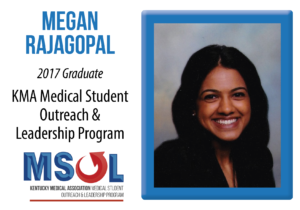 Megan Rajagopal is studying to become a neurosurgeon—a specialty she initially wasn’t considering.
Megan Rajagopal is studying to become a neurosurgeon—a specialty she initially wasn’t considering.
Her father, Karuna, encouraged her to go into politics, a field she says he’s really into. But that didn’t interest her like medicine did. She took a biology class in seventh grade that solidified her passion for science and medicine. Growing up in California, she chose the health track in high school and majored in biology at the University of California at Los Angeles.
She came to Kentucky to study medicine in part because that’s where her father obtained his master’s degree and also because, “It was the best school I got accepted to,” she said.
Currently a fourth year medical school student at the University of Kentucky, she’s shadowed physicians in her field and has learned from them, especially the attending physicians in the neurosurgery department at UK. “Each one had a pretty big impact,” she said.
Her surgery rotation at UK was the deciding factor. “I really liked all the surgeries they did,” she said. “It was fascinating. It was like nothing I’d seen before.”
Rajagopal is also a musician. She’s played the violin since she was three and has even played in UK’s orchestra during medical school. She compares music to medicine. “The way in which you learn (the violin) is similar,” she said. “It’s an apprenticeship model. I go to lessons and watch my teacher play and she watches me play and critiques me. I practice and come back. In residency it’s kind of the same thing. You present ideas to your attending. You do surgeries and your attending is there and gives you feedback on how to get better. Then you read and practice on your own and come back next time and see if you got better.”
She picked a field that requires a seven year residency, but that doesn’t seem to faze her. “I thought it was really interesting and I didn’t mind studying,” she said. “It was just fun.”
Rajagopal had the opportunity to go back home to California during a rotation at the University of California at Irvine near her parent’s house. “It was pretty busy but at least I got to go home at the end of the day,” she said. “That was nice.”
Her father is a fluid dynamics specialist at Boeing in California. “He monitors the air flow of the space shuttle when it comes back into the atmosphere,” Rajagopal said.
Her mother, Geetha, is a stay at home mom and is an active volunteer in Megan’s former elementary school in California. She’s also a leader in the organization Guide Dogs for the Blind. “She has a lot of fun volunteering,” she said.
Rajagopal describes herself as “shy” but has pushed herself out of her comfort zone, especially as president of the Medical Student Section (MSS) last year at UK and as the UK representative on KMA’s Board of Trustees. During her MSS presidency she was in charge of close to 300 medical school student members and had about ten people on her board. “I was in charge of a lot,” she said. But her shyness quickly diminished since she had to emcee events and talk to a lot of people. “I got over that pretty fast,” she said.
She also participated in KMA’s Medical Student Outreach and Leadership Program which she says, “Everyone would benefit from.” “I learned the basics of how the American Medical Association fits into the government, how laws are made and knowing the process of how to change something.”
Rajagopal is headed to Virginia in July for her residency at Virginia Commonwealth in Richmond. She doesn’t know anyone there, but said that’s how it was when she came to Kentucky to study medicine.
Even though Rajagopal is unfamiliar with her soon to be new surroundings, with her background and leadership experience, it seems she’s prepared for a new challenge. “It will be fine,” she said.
Life Events and Leadership Opportunities Guide Direction of Future Physician Kevin Kwan
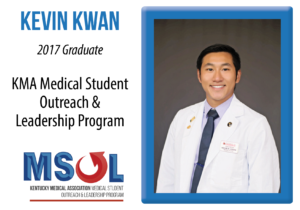 Can one person or event change your life? For Kevin Kwan, who initially planned on becoming a pharmacist, several people and events changed his.
Can one person or event change your life? For Kevin Kwan, who initially planned on becoming a pharmacist, several people and events changed his.
A second year medical school student at the University of Louisville, Kwan is now on track to become the first physician in his family.
Growing up, he witnessed his grandmother collapse on the floor of a supermarket in China. “When they took her to the hospital, the first question they asked was ‘can you afford the treatment?’ not about her condition,” he said.
“I didn’t want to feel helpless again,” he said. “The lack of my ability to do something was the driving factor.”
Years later, as a sophomore majoring in chemistry at the University of Kentucky, he attended an awards ceremony where he was recognized as a Buick Achievers Scholar. During the ceremony, he met Larry Clark, now a retired Kentucky State Representative, who asked him what he wanted for his future. “At the time, I told him I was interested in pharmacy, but I also wanted to explore the medical field in general,” Kwan said. “He got me in touch with the Greater Louisville Medical Society and I did a two-year summer internship program with them.”
Bert Guinn, MBA, CAE and GLMS executive vice president and CEO, put together Kwan’s internship that allowed him to interact with physicians and also learn about the advocacy and collegial side of organized medicine.
“I figured that he would learn pretty quickly whether or not medicine would be a good fit,” Guinn said. “Kevin was very eager to learn and help out with anything and everything around the office. He participated in our Wear the White Coat Experience, attended our board meetings, set up a new physician writer’s blog and helped us out with the production of our monthly Louisville Medicine Magazine. He even helped direct parking for physicians and their families at our Presidents’ Celebration. He was everywhere, and he must have liked it.”
That summer internship went so well that he came back and did it again the following year.
Kwan continued to seek leadership roles and completed KMA’s Medical Student Outreach and Leadership Program (MSOL), where he served as the student contact for UofL medical school students. He’s also the medical student section representative on KMA’s board of trustees.
Through his participation in the MSOL program, Kwan learned information not taught in the classroom. “Learning about tort reform was very insightful,” he said. “I learned that doctors weren’t protected from lawsuits.”
Kwan was also surprised to learn how long it takes to implement changes in health care. “There are a lot of other factors involved (in health care) that aren’t just about treating the patient—especially in the financial department,” he said. “I gained a better understanding of the billing processes of hospitals and how they work.”
His MSOL experience also made him aware of the health care disparities in rural counties and the shortage of physicians. “Their access to care is so limited,” he said.
Kwan is the first generation of his family born in the United States. His father, Wood, is a refugee from China and his mother, Siyi, immigrated to the United States from China with “$5,000 to her name,” he said.
“My parents did the best they could to make sure I was healthy enough to go to school,” Kwan said. “They made sure I took my medicine on time and took me to the doctor if I got sick and they stressed the importance of healthy eating. It’s something they didn’t have growing up.”
Kwan said he wants to “be someone who can make a difference.”
“Kevin obviously has that higher calling (to help people), and it’s a real honor and privilege to be a part of his journey,” Guinn said. “Medical school is tough for good reason. But, Kevin will have that MD after his name before we know it, and it wouldn’t surprise me if he ends up being GLMS President someday.”
Anita Shanker Leads By Example and Seeks to Develop Rapport with Colleagues
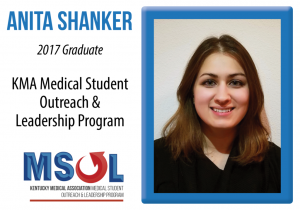 When Anita Shanker heard the words “outreach” and “leadership” she knew she wanted to be involved in the KMA Medical Student Outreach and Leadership Program (MSOL).
When Anita Shanker heard the words “outreach” and “leadership” she knew she wanted to be involved in the KMA Medical Student Outreach and Leadership Program (MSOL).
Currently a second year medical school student at the University of Kentucky, Shanker initially became involved in MSOL program last year as the UK student coordinator.
“Getting involved was a bit of an accident,” she said. When she heard the description of the MSOL coordinator after class one day, she immediately decided to run for the position and got it. She quickly became more involved and “started to see where our chapter could grow and change,” she said.
She was initially interested in MSOL because “It seemed like a good way to get information about things we really don’t talk about in our medical school classes like the economic and business side of health care,” she said. “These are really going to be part of our everyday life when we become physicians whether we want it to or not.”
Participating in MSOL taught her “there are a lot of moving parts (in medicine).” “It’s important to be aware of the current economic climate and how to negotiate the job market once I graduate. It was really meaningful and beneficial to learn about these things early on,” she said.
The advocacy portion of the MSOL program resonated with her. She took a college course on health disparities and the social side of medicine where she learned that what physicians can do in the clinic is very minimal. “I learned that the difference physicians make for patients in the clinic only determines about 10 percent of their total health outcome,” she said. “What also comes into play is their access to health care, social situation, where they live and their behaviors,” she said.
With the advocacy education provided by the MSOL program she saw “a way to stretch beyond that 10 percent.” When we’re advocating for these policies, we’re not only advocating for medicine, we’re advocating for the patient.”
Shanker attended KMA’s Physicians’ Day at the Capitol last year where she met with Rep. Derrick Graham, who represents her hometown of Frankfort. She was also accompanied by a physician who’d already made an appointment with Rep. Graham. She listened to their conversation about their families and their jobs. This was an eye-opening experience for her because she said, “I could see the rapport between them and only at the end of conversation did they really get down to the meat of the issue.”
“This showed me how important it is not only to have a professional relationship with the people I’m working with but a personal one as well in order to build rapport and really have an impact,” she said.
She exhibits this personal rapport philosophy in her leadership.
She said being the coordinator for the MSOL program gave her the push to run for the Medical Student Section (MSS) co-president, a position she currently holds.
“The MSOL program was a great stepping stone to doing more with our MSS chapter,” she said.
Her goal for this year has already been accomplished.
She wanted to see the UK MSS chapter be more involved with the KMA through the local Lexington Medical Society (LMS). To this end, they now send at least one student to all the LMS meetings “to contribute in any way they can,” she said. Also, last year they submitted four resolutions to the KMA Annual Meeting, all of which passed.
The chapter currently volunteers at Mary Todd Elementary in Lexington by teaching monthly science and health lessons. They were recently invited to be on a student panel at Bryan Station High School in Lexington where they hope to “bolster lessons in health classes” and mentor high school students interested in medicine.
Under her leadership, “We designed a whole new executive branch with committees so we could expand our realm,” Shanker said about the MSS chapter.
She’s strived to be an approachable presence and run informational executive meetings where all the committee chairs are up to date on what’s going on in each committee and are free to share ideas.
“I want students to feel they can approach chapter leadership and let us know what we can do better or expand on,” she added.
This approach is working. Up to 75 percent of each class has signed up to participate in the MSS chapter.
She’s interested in working in global health, which resonates with her personal enjoyment of traveling. During her undergraduate studies as a French and biology major at UK, she studied abroad in Paris and in Switzerland. She’s also traveled to India, her father’s birthplace, and to Spain, her boyfriend’s country of origin.
Shanker said she’s always been interested in art and science, but while art is a hobby, science was something she “couldn’t do without day-to-day,” she said.
She’s taking a class called “The Stories We Tell Each Other” about the presence of medicine in art, literature and music. “We see medicine from the side of the practitioner but we also see how it’s viewed from the side of the patient,” she said. “You see the emotional side behind it. When you’re working with people it becomes an art.”
Violet Patty Shackleford Pursues Medical Career with the Support of Her Family
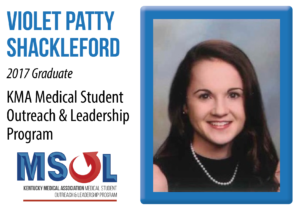 Violet Patty Shackleford grew up in Mayfield, a small town in Western Kentucky. After she graduates from the University of Kentucky College of Medicine in May, she’d like to return there and “use the things I’ve learned,” she said.
Violet Patty Shackleford grew up in Mayfield, a small town in Western Kentucky. After she graduates from the University of Kentucky College of Medicine in May, she’d like to return there and “use the things I’ve learned,” she said.
She decided to study medicine in high school. “I grew up in a family where both of my parents are nurse anesthetists,” she said. “I’ve known workers in the health care community for a long time. “
“Anesthesiology was at the bottom of my career choices,” she said when she entered medical school.
But that’s exactly what she’s interested in pursuing. Her parents laughed when they found out, “and probably always will,” she joked.
“They never pushed me in that direction,” she added. “When I decided on my own that’s the career I wanted to pursue, they were very excited for me.”
She initially thought about going into internal medicine or pediatrics. But it was when she started clinical rotations that she discovered she enjoyed being in the operating room and also became interested in anesthesiology. “Anesthesiologists have to know a lot of broad general medicine and they apply it in a unique way in their field,” she said.
Both she and her husband Taylor, also a fourth year medical school student at UK, are currently interviewing for residency positions. They met in their first year of medical school and married last October.
“Meeting Taylor has been my greatest blessing in life thus far,” Shackleford said. “Medical school is a really challenging time. It’s the most difficult thing I’ve done academically. It’s mentally and emotionally challenging. Having him with me has been just wonderful. We study together. He understands my schedule and when I’m tired because he’s going through it as well. To be able to support each other and pursue our careers has been awesome.”
Both participated in KMA’s Medical Student Outreach and Leadership Program (MSOL) together.
“Medical school is focused so much on your studies,” she said. “You tend to forget what your career looks like and the bigger picture. When I found out it (MSOL) was connected to KMA and physicians who have leadership roles in the community, I really wanted to be a part of it and learn what things might look like for me in the future.”
Her favorite part of the program was the community service requirement. She was part of a team of medical school students from UK who volunteered at Mary Todd Elementary in Lexington where they taught students about different health issues and planted a garden.
In her free time, Shackleford enjoys cooking, especially trying new recipes. She also likes to read and exercise. Their new cocker spaniel, Carlee, also keeps them entertained.
Megan Mercer–A Person of Integrity Striving to Reach Her Full Potential
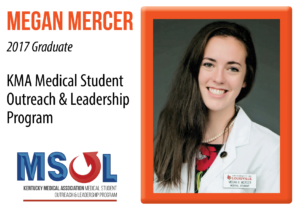 “Keep your eyes on the stars and your feet on the ground.”
“Keep your eyes on the stars and your feet on the ground.”
Megan Mercer keeps this quote by Theodore Roosevelt on her desk to remind her to be mindful of her foundation while striving to reach her full potential.
A third year medical student at the University of Louisville, Mercer has already established a firm foundation among her peers. She said friends would describe her as a “very consistent and stable person” and “a person of integrity.” She’s also someone they look to for advice. “I’m always there for them and I keep my word,” she said.
One way she’s striving to reach her full potential is through involvement in programs she feels will help make a difference in both her life and in the lives of her future patients. During her first year of medical school, she was the KMA legislation and advocacy chair for her student group. That’s where she heard about KMA’s Medical Student Outreach and Leadership (MSOL) program.
“I thought it was really a great thing to be a part of because we had so many lectures and seminars about the landscape of health care in Kentucky. As things change in the state and as health care evolves, it’s good to be up to date on that for both yourself and your future patients—knowledge is power.”
Community service, a requirement of the MSOL program, comes naturally to Mercer. She’s already helped sort medical supplies, introduced children to potential career paths, taught CPR and life support to fellow medical students and directed student-lead medical clinics at Supplies Overseas, the Cabbage Patch Settlement House, UofL and The Healing Place, respectively.
The Healing Place experience made an especially big impact on her. “It was a great opportunity to grow as a future physician because it allowed us to interact with patients that really needed our help,” she said. “It was moving to me to see people who’ve been in a rough patch in their life but are taking the initiative and having the courage to go through the program and to try and do better by themselves and get their life back on track.”
Mercer went through a rough patch herself growing up when she experienced a sickness in her family. Her mom, Karen, a widow, helped get her through. “She’s my biggest cheerleader and my rock,” she said.
After graduating from Ballard High School in Louisville, Mercer double majored in biology and psychology at UofL. “It was interesting to learn about the body and the mind,” she said. “Biology covered the physical sciences but it was interesting to see how people think. I know that mental health is also a growing concern in our community and a big focus in health care. It’s nice to be conversational about those topics and have some theory behind that.”
She initially thought about becoming an engineer but “missed the societal impact and getting to see the people that you’re helping,” she said. “Medicine seemed like a natural choice. I wanted to help other families going through similar trials and tribulations.”
During her senior year in college she participated in the Guaranteed Entrance into Medical School (GEMS) program and after completing the requirements, was automatically accepted into UofL’s School of Medicine.
The first in her family to pursue medicine, Mercer works with UofL’s Department of Surgical Oncology and has participated in several quality of life studies for breast cancer patients. “It’s probably the thing I enjoy most in medical school,” she said. She’s currently working on a study on how people feel after surgery, the best way to manage pain and the outcomes of surgery.
She’s also on the evaluation and assessment subcommittee that helps keep medical education at UofL “on the cutting edge,” she said.
In her spare time, Mercer enjoys film and digital photography. “It’s awesome to see beauty in everyday things and get to capture that on film,” she said. Cycling, hiking and cooking are also among her favorite pastimes.
Monzolesso “Joel” Bagah-Kognagba Enjoys Giving Back to His Community
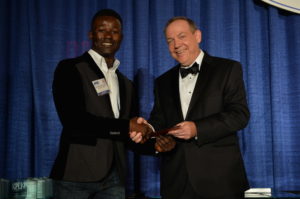
As a child growing up in Togo, West Africa, Monzolesso “Joel” Bagah-Kognagba remembers missionaries coming to his country to help with vaccinations and assisting his community. This experience, combined with the fact that his father had lost his sight before Bagah-Kognagba was born, factored into his decision to become the first in his family to study medicine. “After going into medicine one day I could bring his sight back,” he hoped.
Bagah-Kognagba came to the United States with his brother when he was 17 years old. They joined their mom, who was already living in the U.S. since 2003 thanks to the Diversity Visa Lottery program.
“It was a big change,” Bagah-Kognagba said. French is his native language, so he said his main challenge was learning English. But through his English as a Second Language (ESL) classes at Hobart High School in Hobart, Ind. and his new found friends, he quickly learned.
After high school, his mom suggested he consider medicine.
A double major in biology and chemistry at Millikin University in Decatur, Ill., this magna cum laude graduate enjoyed shadowing several physicians during his undergraduate program. After this experience, he said, “I never looked back.”
Currently a second year medical student at the University of Louisville School of Medicine, Bagah-Kognagba is interested in specializing in cardiac electrophysiology. “You can see immediate results,” he said. He recalled a procedure he witnessed in which a patient’s heart was not working correctly, but right after the operation, the patient was “back on his feet.”
Also, he feels cardiology is a field where he can spend more time with patients and discuss their diet and social life, factors he feels are important to health.
As a 2017 graduate of the KMA Medical Student Outreach and Community (MSOL) program, Bagah-Kognagba said the program allowed him continue his active community service and taught him how to manage his time.
His community service experience is vast. During his undergraduate program at Millikin, he served as historian of Alpha Phi Omega Service Fraternity where he participated in a variety of community service projects including helping with street cleanups, Girl Scout cookie sales and blood drives. But his work with Alzheimer’s and Parkinson’s patients in nursing homes “was the hardest part” because of the emotional toll. “Seeing these patients who were once clever and strong—now it’s an emotional hardship to see that you have to repeat yourself and how they lost their strength and cognition,” he said.
During his time as vice president of the American Chemical Society at Millikin, he helped local children learn “how cool science is” by teaching them how to extract fake DNA and how to make slime.
He also served as a general chemistry and organic chemistry tutor during his time at Millikin, and said the main thing he learned was “there are different ways of solving problems” and that “I make mistakes too.”
“In Togo, the concept of time is not as strong as in the U.S.,” Bagah-Kognagba said. “The MSOL program allowed me to have deadlines I can meet.”
In his limited free time, he enjoys working out and watching movies and television. He tries to watch movies in French so he can keep up his vocabulary skills.
Thanks to his new found time management skills, he also sets aside time each Friday to plan out his week.
But his favorite activity is skateboarding to class. “It’s one of my favorite times in the morning,” he said.
Public Policy and Research Interest Amanda Su
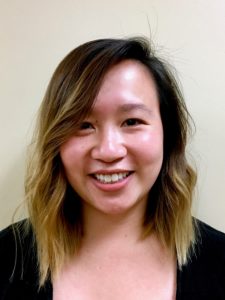 The daughter of Taiwanese immigrants, Amanda Su is the first person in her family to study medicine. She majored in economics at Cornell University in New York, but always kept pre-med in the back of her mind.
The daughter of Taiwanese immigrants, Amanda Su is the first person in her family to study medicine. She majored in economics at Cornell University in New York, but always kept pre-med in the back of her mind.
“My parents always thought it was a really stable career so they planted that idea very early on,” she said. Su said as an undergrad, she “tended to gravitate to health policy.”
“I wanted more patient contact and to be more directly involved,” she said about her career choice. “Policy is the management of medicine.”
A 2016 graduate of the Medical Student Outreach and Leadership Program, Su heard about the program while attending a KMA presentation on insurance, a topic she says medical school students don’t hear much about. “It was good motivation to continue doing the things I enjoyed.” A self-proclaimed deep thinker, Su says research gives her that opportunity.
“I’ve been doing research since my sophomore year of college,” she said. “I got involved in a lab that was looking at the accuracy of guidelines for evaluating myocardial infarctions and cardiovascular disease—that’s the first entry way into effectiveness and quality control.”
After obtaining her undergraduate degree, she worked in a lab at Massachusetts General Hospital in Boston evaluating the cost and effectiveness of integrated care for patients with HIV/AIDS, tuberculosis and other chronic illnesses.
“I have a different perspective than a lot of medical students in that my econ degree allows for little bit more of a policy overview,” Su said. “I’ve been able to continue my interest in that through research.”
During her time at the hospital, she worked on a number of projects, one of which involved working with the Mozambique government on point-of-care testing effectiveness.
“If you did point-of-care testing early on, you could capture a larger group before they had complications, before they had infection from opportunistic disease that would be more costly to treat than prevent,” she said of her findings.
She also evaluated the projected lifetime costs of HIV in the U.S. and found it was cheaper than the management of many other chronic diseases like diabetes. “The management of HIV is not as expensive as we previously thought.” Su was also part of a team of researchers that published a paper about how diseases are transmitted among drug users in Appalachia.
Between medical school and research, Su also makes time for volunteering. Last year she helped run a nutrition clinic at the Salvation Army Clinic in Lexington. “Obesity and nutrition are the cause of such a huge portion of the diseases we see today,” she said. “Addressing these issues earlier on is a lot more cost effective than dealing with the disease once it’s already manifested. Nutrition has such a huge aspect on our health from a public policy standpoint.”
Currently in her third year of medical school at the University of Kentucky, Su said that she’s surprisingly considering specializing in psychiatry.
“There’s no easy public policy fix to psychiatry so I think I’m much more interested in it and can have a lot more patience for it,” she said. “There’s still a lot of public health policy we can do in psychiatry.”
Su is also an avid traveler. After her first year of medical school, she went on a 50-day trip around the world by herself where she bungie jumped off a bridge over Victoria Falls in Africa and rappelled into caves in Vietnam. She said, “I had time to reflect and learn more about myself and what I’m like alone in a completely foreign setting and how I would handle pressure.”
With these life experiences under her belt, she’s well on her way of navigating the intricacies of the health care and public policy arena.
UofL Medical Student Strives to be Innovator on the Front Lines of Medicine
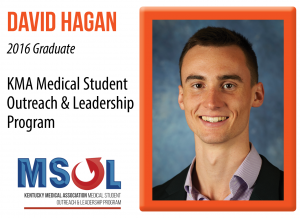 David Hagan’s long term goal is to identify problems within the health care system and develop solutions.
David Hagan’s long term goal is to identify problems within the health care system and develop solutions.
“It’s every physician’s job to look at ways to make things better,” said the second year medical student at the University of Louisville.
Hagan has a head start. While pursuing a degree in bioengineering at the University of Louisville, he participated in several co-ops at Cook Medical in Bloomington, Ind., a company that develops, builds and distributes devices for minimally invasive medicine.
He started out as an engineering major but switched to bioengineering after working at Cook.
“I’m really interested in design, inventing and coming up with new ways to do things,” Hagan said. “With all the regulation in engineering, it’s hard to invent new things without seeing the clinical problems yourself. Physicians are the ones who see the clinical problems.”
During his time at Cook, Hagan tested devices to make sure they lined up with FDA regulations, conducted early prototyping of urology devices using 3D modeling and printing and worked with the otolaryngology, head, neck and surgery team where he also did prototype and design work. After he graduated from UofL, Hagan worked at Cook full time for a year in the interventional radiology department.
“Working as an engineer in a medical device company was confirmation that I wanted to innovate on the front lines,” Hagan said.
Hagan is the first in his family to pursue a medical degree. His parents, Mike and Joy Hagan, taught English in China, where Hagan spent his early years. They moved back to Louisville when he was 14.
“It was quite a change from international school where I went to school with Nigerians, Australians, Koreans and some Americans,” he said.
Hagan speaks Mandarin and some Korean. He hopes to use his foreign language experience as a physician. “Tons of Chinese students are coming to U.S. and they’re bringing their parents,” he said. “It will be nice to have some Mandarin speakers who can connect with them.”
Hagan is active in the Innovation in Medicine Club at UofL, where students regularly meet with physicians. “It’s a way for me to continue to channel the sentiment of continued creativity and improvement even as we’re going through medical education,” he said.
A 2016 graduate of KMA’s Medical Student Outreach and Leadership Program (MSOL), Hagan said the program was “an opportunity to reach out to other people and see what’s going on in Kentucky.” He was especially interested in the business side of medicine and enjoyed learning about potential issues with Medicaid and government funding.
The MSOL program includes a public health component that Hagan completed through various community service activities, including his medical mission trip to Brazil last summer. He got to see patients by himself, work with a translator and present patients to physicians. But the highlight of his trip was being able to play soccer at every village where they set up clinics.
In a game against a team with some of the best local soccer players, he headed a ball for the winning goal. “Nobody expected this from the American,” he said.
Soccer helped Hagan decide to pursue medicine. He played soccer in high school but tore his ACL during his senior year. This sidelined him from the sport, but gave him more time to focus on academics, including researching his injury.
“One door closes and another one opens,” Hagan said of the injury that helped open his eyes to a career in medicine.
Compassion and Leadership Skills Evident in Her Community Involvement
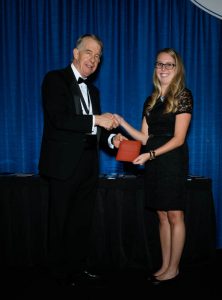
Abby Baumgartle has a desire to serve her community as a physician. But she’s already making a difference as a second year medical school student at the University of Louisville.
She’s prepared and served meals for the homeless, provided medical care for refugees and helped organize an event to raise money for people in an addiction recovery program.
The spirit of giving, and caring for others, runs in the family.
Her mother, Kathy, is a registered nurse at Clark Memorial Hospital in Jeffersonville, Ind. “She was the biggest influence on me and my sister wanting to pursue a career in the medical field,” Baumgartle said. Abby’s twin sister, Morgan, is studying to be a nurse anesthetist at Middle Tennessee School of Anesthesia in Nashville, Tenn.
“They’re both incredibly caring, awesome nurses who do a great job taking care of people,” Baumgartle said of her mom and sister, whom she considers her role models.
Her father, Tim, is a mechanic for Duke Energy in Clarksville. “He has to put up with all our dinnertime chatter about gross things—and deals with it,” she said laughing.
Baumgartle’s sister has been a resource for her, especially this year. “Second year has been more clinical and less basic science, so I’ve been texting her as I’m studying,” she said. “I feel like nurses gets a practical education—she’ll tell me realistically how I’ll use what I’m learning.”
A native of Georgetown, Ind., Baumgartle’s interest in medicine goes back to her days as a student at Floyd Central High School. She’s considering specializing in internal medicine. “I really like the idea of having long-term longitudinal care with my patients,” she said.
Baumgartle was among the first graduates of KMA’s Medical Student Outreach and Leadership Program (MSOL) and lauded the focus of the program. “It’s a great intro into the politics of medicine—it’s a business. We don’t really get exposure to that in the classroom.”
“I thought he (KMA Executive Vice President Patrick Padgett) did a great job of laying out Kentucky policy in a basic way where I can know the difference between Medicare and Medicaid and the different reimbursement processes.”
The education is important for medical students, she said. “I think it makes you want to study harder since you see how what you do will impact your patients in the future. It gives you a nice break away from the books. You can dip your foot in the water to interact with people in the community you’ll be both working with and treating in the future.”
Baumgartle has already been actively involved in helping people in her community, a requirement of the MSOL program. She’s prepared and served meals to homeless residents of a Volunteers of America Family Emergency Shelter, participated in a free health screening event for recent refugees through UofL’s Kidney Mentoring and Awareness Program (Kidney MAPS) and took part in the Healthcare Classic 5K Run/Walk to benefit residents of The Healing Place, an addiction recovery program in Louisville.
The Kidney MAPS experience provided her with an unforeseen challenge. She had to explain to non-English speaking refugees who had never had their blood pressure taken what she was going to do. She said she was able to communicate through hand motions and demonstrations. “They were very grateful,” she said. “They acted like we were moving mountains for them,” she said.
Last year she participated in the Healthcare Classic 5K Run/Walk, created by UofL medical school students in 1989. She agreed to be one of the primary leaders this year. Even though it was a lot of work, she said, “I learned how to manage my time between school, booking a park, finding insurance and reaching out to businesses for donations. It helped build some of my business and communication skills.”
Baumgartle is not through helping her community. “I look forward to new opportunities to act as a leader in our community in the coming years,” she said.
Desire to Interact with Patients Drives Rooshil Patel
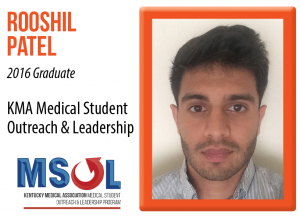 Friends of Rooshil Patel describe him as focused.
Friends of Rooshil Patel describe him as focused.
As a second year medical school student at the University of Kentucky, Patel is focused on learning the science behind medicine. But his desire to connect with patients is the focus that really drives him to succeed.
“I’ve always wanted to dedicate my career, my life, to helping others,” he said. “I’ve always been good in science and doing something that combined my interest in science and the care I can provide to patients made medicine a clear choice for me.”
Four of his uncles are physicians. Through their advice, he learned what the field was about, how they interacted with patients and how they were able to give back. “That was very appealing to me,” Patel said.
His family moved to Chicago from India more than 30 years ago. He credits his parents as his inspiration. “They didn’t have much,” he said.
His father, Mukesh, worked hard and is now a successful franchisee for multiple Subway restaurants and also owns a motel.
“He was so strict and everything is very particular with him,” Patel said about his childhood. “I didn’t like it growing up.”
Now, though, he’s thankful for this upbringing. “It’s shaped me into who I am today. I just want to be half the man he is. He’s very inspirational in everything he’s done,” Patel said of his father.
Patel moved with his family from Chicago to Kentucky when he was in the fifth grade. His parents moved for business opportunities and, “they were tired of the cold weather,” Patel said, laughing.
A 2016 graduate of KMA’s Medical Student Outreach and Leadership Program (MSOL), Patel said he would recommend the program to medical school students. “To be a functioning physician, especially in this time, where there’s a lot of government influence in field, it’s important to know what’s going on,” he said. “The MSOL program helped highlight a lot of things I would not have known if I didn’t attend.”
Part of the requirements of the MSOL program is involvement in public health. To that end, Patel has served in several organizations, including the Salvation Army Clinic. There, he serves as an interviewer and a floor manager where he interviews patients to obtain their history, assigns patients to students, makes sure the rooms are clean after patients have completed their visits and makes sure the paperwork is submitted at the end of the day.
Patel said the Salvation Army Clinic is one of the avenues where first and second year medical school students can have direct interaction with patients.
“You report to an on-site physician to make sure what you’re thinking is right,” he said. “You learn a lot in the classroom but you really can’t compare it to learning in the field.”
Patel plans on volunteering there for the remainder of his time in medical school.
He said his time at the Salvation Army has also helped him develop his bedside manner.
“Right now (in class) we’re just focused on diagnosing the patient,” he said. “We can be quick to forget that they (patients) are human and talking to a patient really reinforces that notion.”
Compassion for the Uninsured and Underinsured Drives Samantha Edwards
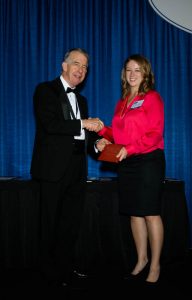
Growing up in New Albany, Ind., Samantha Edwards didn’t even think about becoming a doctor. “It was the last thing I thought I would end up doing,” she said.
She majored in English/creative writing at Ball State University, where she obtained her undergraduate degree in 2010. About a month after graduating, she said, “something clicked.”
Her grandparents were terminally ill at the time and she didn’t feel like she had any tangible skills that could help them. “I found myself wanting a skill I could utilize in the here and now so I could feel like a useful contributor,” she said.
But she wasn’t ready to go back to school yet. Instead, she went to work for the Indiana Department of Insurance where she worked on the team that helped roll out the implementation of the Affordable Care Act (ACA) regulations expansion. “I got a lot of insight,” she said.
She met patients who were gainfully employed but didn’t have insurance benefits. “I encountered a lot of people who were in difficult situations (for health care coverage) that didn’t fit the mold,” she said.
Through this experience, she decided she wanted to learn more about insurance regulation and the policy side of medicine. “It’s an area that needs a lot of work right now,” she said. “I want to tackle this problem.”
After she worked at the Indiana Department of Insurance, she lived in Thailand and taught English for six months. “All the money I made working was spent on travelling,” she said.
In 2013, she was ready to go back to school. She discovered the University of Louisville Post Baccalaureate Pre-Med Program for students who hadn’t taken more than 12 hours of science courses. She hadn’t taken any.
“It’s been tough,” she said. “I felt behind academically in the sciences than my peers. They are a lot younger than me. Some took a year off and went straight from undergrad to med school. They all seemed like they hit the ground running. I would study very hard, but it wasn’t reflected in my grades.”
She finally feels like she’s starting to find her rhythm in her second year of med school.
No one expected her to go into medicine. “I’ve always get excited about something new,” she said. “Some were hesitantly supportive, not sure it was going to happen. They thought of me as a creative person and that I would go into something creative, or artsy.”
She said she likes medicine because, “You’re not just doing science—the science is used to inform the way you interact and treat people. It’s a blend of both and there’s a huge humanitarian component to it because you’re treating people and you get to interact with them.”
Edwards learned a lot about medicine and interacting with people by spending time with her grandfather, George Wolverton, M.D., who was a family physician in Clarksville, Ind. She said he was a pioneer of preventive medicine who had a great impact on his patients. When he died in 2011, the online obituary comments were incredible, she said. One remark stated, “Dr. Wolverton was the only one who could help me when no one else could.”
Her uncle, Steve Wolverton, M.D., is a dermatologist in Indianapolis, and is on the faculty at Indiana University. “I’m able to ask him a lot of questions,” she said. “He’s also an inspiration. He’s been mentoring me through the whole med school process.”
Another inspiration for Edwards was KMA’s Medical Student Outreach and Leadership Program (MSOL), which she completed last year. “It helped me walk me down the path of where I want my career in medicine to go,” she said.
She specifically remembers KMA Executive Vice President Pat Padgett’s talk about the Affordable Care Act. “He talked about how the ACA was directly related to Kentucky—which I learned a lot from,” she said. His presentation covered the health care population in Kentucky, the challenges Kentuckians face and kynect, the state health insurance exchange, which has since been dismantled. “This inspired me to stay in this state and tackle the specific problems people in Kentucky face—and there are a lot of them,” she said.
Edwards encourages students to participate in MSOL now and not wait until they’re practicing medicine. She’s co-chair of the resolution writing committee composed of first and second year UofL medical school students. This group submitted resolutions to the KMA House of Delegates last year and plans to submit resolutions to the AMA this year.
Edwards’ passion to help the uninsured and underinsured carries over in her volunteer work with Surgery on Sunday Louisville, a nonprofit organization that provides in-kind outpatient surgical and endoscopic care to income-eligible members of the community. KMA member Erica Sutton, M.D., is a surgeon who heads this organization and for whom Edwards served as a medical scribe. “I think very highly of Dr. Sutton and I like the opportunity that I got to learn more from her,” she said.
She’s scrubbed in several times, but just to hand tools to surgeons or to hold a laparoscopic camera. She also volunteers at the Family Community Clinic, one of the primary care medical homes that refer patients to Surgery on Sunday.
When she’s stressed from school, she likes to walk her dog, a Brittany Spaniel named Dude, do puzzles and garden. She also enjoys watching television, but stays away from medical shows, preferring to watch Game of Thrones or Parks and Recreation.
Motivated by Family, Friends, Church and Community Service
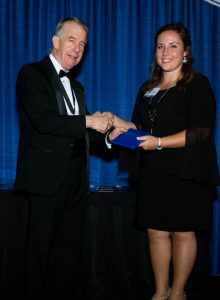
Liz Mirsky “fell in love” with medicine when she was in grade school. In fact, her friends called her “the mom.”
“I always had this yearning to make sure that everybody in the group was cared for and that everybody had what they needed,” Mirsky said. “I realized this would be a really useful trait to have in someday caring for people in my own clinic or in my office.”
At that point, she said, medicine became her constant motivation. She shadowed and volunteered in high school and never wavered from her desire to be a doctor—“it only grew.”
That desire to pursue a medical career was complemented by the work ethic she saw in her parents, who faced the challenge of not only settling their young family in the United States, but also learning the language and culture.
Mirsky was five when her parents moved to Lexington from Bulgaria in 2000. Her father, Alex, was a pro basketball player with the Bulgarian National Team, but his career was over by the time Liz and her sister, Becky, were born. Her mother, Ellie, had a master’s degree in Arabic.
The couple was looking for better jobs and opportunities for their children.
“That’s when we won the Green Card Lottery and left everything behind to come to the U.S.,” she said. “We brought whatever we could carry, hopped on a plane and came to the U.S. in search of new opportunities.”
But it wasn’t as easy as all that. The couple’s first priority was to learn English. “They read whatever they could get their hands on and TV was helpful,” Mirsky said.
She counts her parents’ dedication and hard work among the reasons she decided to become a doctor.
“I got to watch what my parents were willing to do to support their family,” she said. “They were so persistent; they kept going to school all while they were working to support the family.”
Her father is a nurse at St. Joseph East Hospital in Lexington and her mother is an accountant at Comfort Keepers in Lexington, a private service that hires out nurses.
They set an example and instilled in Mirsky that “I could do anything I put my mind to,” she said. “No matter how hard it would be, I knew I’d have their support. They gave me a good work ethic.”
As she enters her third year of medical school at the University of Kentucky, she is looking forward to exploring her interests in pediatrics, possibly in anesthesiology or oncology, and OB/GYN.
When KMA established the Medical Student Outreach and Leadership Program (MSOL) in 2015, Mirsky knew she had to sign up.
“Yes, I have shadowed and volunteered, but I’d only seen the clinic side of things,” she said. “I knew I needed to learn more about things like health care and finances.”
The MSOL program includes a series of “Lunch and Learn” presentations aimed at helping medical students prepare for the challenges facing them in their professional careers. Mirsky especially liked the subject of local health care in Kentucky.
“Now that everything’s potentially going to change, learning the basis … and some of the specifics of what it needs to be, I think that will be helpful for me to make sense of whatever new thing comes our way,” she said. “I think the lectures in the MSOL program really gave me a good foundation.”
While the Lunch and Learn presentations are open to any student at UK and the University of Louisville, gaining the MSOL recognition requires participants to complete a public health outreach project. Mirsky’s community involvement has been vast. She recently got involved with the Salvation Army Clinic in Lexington where she is the smoking cessation officer. She leads a support group for the women every Tuesday. “Seeing their dedication and the efforts they put into quitting is really another inspiration for me,” she said.
Mirsky enjoys playing the piano in her spare time and plays every weekend at the Lexington Seventh-day Adventist Church where she is a member. She studied piano at the School for the Creative and Performing Arts at Lafayette High School but knew music wasn’t going to be her career. “I pretty much had my eyes set on being a doctor in grade school,” she said.
She also likes to read. She says with a laugh she reads “any non-textbook material—any book I can get my hands on. My library is stacked both horizontally and vertically.”
Mirsky is among the first class of 23 MSOL graduates. “I think it was very well planned out,” she said about the program. “They gave us the dates of the lectures in advance, which is always so appreciated for medical students. I think the content and the information they taught was very valuable.”
“I think if would be helpful to all medical students.”
Preventive Care and Public Policy Are Focus of this Future Physician
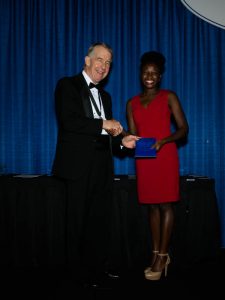
Nadine-Stella Achenjang, who goes by “Stella,” credits her family as her role models.
“I’m so proud of all my siblings,” she said. “They continue to inspire me to do better. We encourage each other to push forward and to do better.”
One of five children, Achenjang falls in the middle. Her older sister Joyce graduated from medical school last year and is in residency at Saint Louis University. Her oldest brother Roland has an MBA and is a director of pharmacy. Her younger brother Gilmore is working in finance. And her youngest brother Niven started college at Stanford this year.
She is also inspired by her father, Fidelis, and her mother, Lucia, who moved the family to the U.S. from Cameroon, West Africa, in 2000.
“For them to just pick up and move to a foreign country for their children and having to start all over in a place that’s foreign to them— I think they’re amazing,” she said.
Her dad is a chemistry professor at Union College in Barbourville and her mother is a nurse at Christian Care Communities in Corbin.
With these family achievements she jokes, “I can’t be the black sheep in the family.”
She’s well on her way to success. Achenjang is a second year medical school student at the University of Kentucky, where she earned a bachelor of arts in biology and a minor in Spanish.
Her interest in medicine was sparked when she took an anatomy class at Knox Central High School. “I was fascinated with how our bodies work and I needed to know more,” she said.
Achenjang decided to further explore her interest in medicine and participated in the Summer Medical and Dental Education Program at the University of Louisville after graduating high school. “This program focused on showing students what medical school was like,” she said.
“During this course, we learned a lot about diabetes, obesity and metabolic syndrome,” she said. “That got me thinking about preventive medicine and preventive care. I know whatever I end up doing, I want to somehow get involved in preventive care.”
She also participated in the Professional Education Preparation Program at UofL and at UK.
“These programs helped me to become more of an individual because I was away from home, away from my family and in a city I didn’t know,” she said.
In addition to these programs, she also recommends KMA’s Medical Student Outreach and Leadership Program (MSOL), which helps medical students prepare for the challenges facing them in their professional careers.
“I have an interest in public policy—it’s a long term goal for me,” she said. “I know the Kentucky Medical Association is a great advocate for physicians and patients and they do a lot with policy. That got me interested in the program.
“Also, it’s great info and free food also never hurts,” she laughed. “You get a good lunch and learn about being a physician in Kentucky.”
Achenjang understands the importance of community involvement, a requirement of the MSOL program. “If you see a need in the community, you work to be a patient advocate.”
As the undergraduate liaison for the Student National Medical Association at UK, she works closely with the Multicultural Association of Pre-Health Students on campus. This year the associations hosted a regional educational conference. “The focus was on nutritional disparities and how difficult it is for people in the lower socio economic class or certain areas to receive good nutrition.”
Achenjang is also the community service chair for the UK Global Health Alliance and is a member of the UK Pediatrics Interest Group.
Achenjang cited another benefit of KMA’s MSOL program: “You learn things you don’t think about, like insurance.”
She said she learned about “the fight between insurance companies and physicians.”
“The insurance company sets the prices, not the physician or the hospital, which I thought was kind of crazy,” she said. “I don’t know why that’s OK.”
She enjoys running, exercising, cooking and traveling. “Any chance I get to go somewhere I am gone,” she says. She’s traveled mostly to Spanish-speaking countries through study abroad and medical trips.
She hopes to use her knowledge of Spanish in her medical future. To keep up her skills, she has helped teach English to the Hispanic workers at Keeneland, is involved in a Spanish club at UK, reads her Bible in Spanish and writes in her journal in Spanish.
After medical school, she’s interested in working abroad, but says she needs to stay in the U.S. to help pay off her loans first.
“I’m keeping it very open,” she said. “I want to do global health.”
Family Ties and a Desire to Help Provide Guidance for Christian Moser
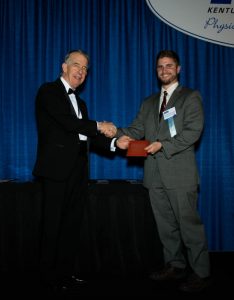
Christian Moser’s family background, combined with a determination to have a positive impact in people’s lives, drove him down the path to become a physician.
His father, Neal Moser, M.D., a pulmonologist, serves on the KMA Board of Trustees and the KMA Commission on Legislative and Political Advocacy. His mother, Kim, a registered nurse, was elected last year to represent the 64th district in the Kentucky House of Representatives. She is also the first non-physician in the country elected to chair a physicians’ political action committee. Moser also has three uncles who are physicians and multiple cousins who are nurses and dentists.
But his biggest role models are his grandfathers, Roy Moser, M.D., who helped start a practice in Northern Kentucky where his father works today, and Floyd Poore, M.D., a recently retired hospitalist who ran for governor of Kentucky in 1991.
“To me, they’re proof that a good physician can earn the love and respect of their whole community simply by showing up, doing their job to the best of their ability, and by treating each patient with respect and more than just a problem to be resolved,” he said.
“Medicine is all I’ve ever known,” said Moser, who is in his second year of medical school at the University of Louisville.
His family background was just one contributing factor to his decision to become a doctor. He had the opportunity to shadow physicians during two medical mission trips to Nicaragua and that helped confirm his choice.
“I wanted to work in a field where I can get to know people on a personal level, to hear their story, so to speak,” said Moser. “At the same time, I wanted to have the greatest possible positive impact on their life. Once I started shadowing, it didn’t take me long to see that the doctor-patient relationship is the best of both worlds.”
During a medical/dental mission trip to Nicaragua with a cousin his sophomore year, Moser got to see firsthand how doctors can have a positive impact on patients’ lives. After examining two siblings and determining they had a parasitic infection caused by malnourishment, one of the doctors helped buy food for the family.
“The mother broke down crying, she was so grateful,” Moser said. Another patient was an obese woman who didn’t know she had diabetes. “No one explained to her that her diet could cause diabetes,” Moser said. “We taught her everything we could about how to manage her diet and where to go from there.”
Moser grew up in Taylor Mill, Ky., and is the middle child of five boys. “My two older brothers would fight and my two younger brothers would fight and I would just fly under the radar,” he said, laughing.
After graduating from Summit Country Day School in Cincinnati, Ohio, Moser majored in political science at UofL. “Politics, aside from being something that fascinates me, shapes just about everything we do,” he said.
His personal involvement in politics began in high school when he did a two-week internship in Washington for former Congressman Geoff Davis. Then, during his freshman year of college, he interned with state Rep. Sal Santoro, answering phones and emails. Today, as president of UofL’s Medical Student Section, he encourages his classmates to get in touch with their legislators. “These are our representatives,” he said. “They take the things we say very seriously.”
Moser is a member of the first class of KMA’s Medical Student Outreach and Leadership Program (MSOL), which, Moser said, “is perfectly designed to fit with our crazy, hectic schedules.”
With just four course requirements, students learn the basics of Medicare and Medicaid, how to negotiate contracts, health care demographics in Kentucky and the nation, and how to contact legislators and write resolutions to directly influence the political process.
“With the amazing resources provided through KMA, the American Medical Association and the Greater Louisville Medical Society, we’re showing medical students exactly how they can address the shortfalls of health care in Kentucky, and to cause real change at an institutional level,” he said.
Sreeja Sanampudi Encourages Others in Ambitious Journey to Become a Physician
Sreeja Sanampudi will be the first person in her family to become a doctor. “I’m excited about that,” this self-proclaimed bookworm said.
She hopes to own a hospital someday and treat everyone “regardless of their ability to pay,” she said. “I would not charge anything for the poor people, but would charge double for the rich people.”
Born in India, her family moved to Baton Rouge, La., when she was 9.
“For them to leave everything behind, come to a country they didn’t know anything about and start a brand new life—I think that’s very brave,” she said of her parents. “I wish I had that kind of courage.”
Her parents still live in Baton Rouge where her father, Prasad, is a mechanical engineer and her mother, Jayasree, is an accountant.
She has one sibling, an older brother, Ashwin, who is a chemical engineer in Alabama.
Throughout middle and high school, Sanampudi volunteered at Our Lady of the Lake Hospital and Baton Rouge General Hospital. “I could see myself doing what they were doing—helping people and just being a support when people are vulnerable,” she said.
Sanampudi completed her undergraduate degree at Louisiana State University and says, “I’m a huge Tigers’ fan.” She moved to Kentucky to enroll in medical school at the University of Kentucky and also professes to love UK basketball.
Currently in her second year of medical school, Sanampudi gives tours to students interested in enrolling in the UK College of Medicine. “I show them around and talk to them about what it’s like to be a medical school student,” she said. “It’s not all that scary,” she tells them. “If I can get in to it (medical school), so can you.”
Encouraging others comes naturally to Sanampudi, just as her mother does for her. “I can call my mom for anything,” she said. “She reassures me when I doubt myself, especially before taking a difficult test. She reminds me that I studied really hard.”
She said her mom lightens her mood by telling a joke or talking about something funny. “She gives me confidence,” Sanampudi said. “My parents are really proud. They’re so supportive.”
She hasn’t picked a specialty. “I feel like my horizons are wide open,” she said.
Sanampudi recently completed a five-week cardiology unit where she learned more about the dangers of smoking. This knowledge helps her at the Salvation Army Clinic, where she assists with a smoking cessation support group. She’s been successful in helping several women quit smoking.
“We help them make goals for each week but I tell them it’s OK if you don’t meet your goals,” she said. “We just want them to come back next week to keep them accountable. I feel like I make a difference.”
A 2016 graduate of KMA’s Medical Student Outreach and Leadership Program (MSOL), Sanampudi found the program helpful. “I didn’t know how the administrative side of it worked, or about being a doctor in general,” she said. “I learned about what doctors can do in terms of legislation and for their community. It was a good way to get my feet wet.”
She’s frustrated that some lawmakers who are not involved in medicine help make the rules concerning the medical field. “We (students) can help make a change in the government and provide our own opinions,” she said.
Sanampudi recommends MSOL to other students. “The worst that can happen is that they can learn something,” she said, laughing. “That’s never a bad thing to learn about something that you don’t know.”


